How to learn German for travel: Is 4 weeks enough?
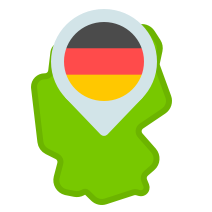
Earlier this year, I planned a trip to Italy and studied Italian for 4 months to prepare. It was great! I had lots of meaningful conversations, confidently navigated cities and towns in the countryside, and successfully ordered what I intended, every single time. 💯
But this time was different: I made plans to go to Germany for work, which was exciting except… I didn’t know any German! I've never studied it, everything I know comes from "99 Luftballons," and when I went to Germany in 2008 (pre-Duolingo days), I learned the word for "once" and mistakenly used it in coffee shops across Berlin ( einmal croissant, einmal coffee, "once croissant, once coffee"). Ack. 🎈
This time, I used Duolingo to prepare—and I only have 4 weeks! Here's how I prepared for my trip and how it went. Maybe it'll give you ideas of how to prepare for your own trip, especially if you only have a few weeks!

Learning German for travel:
Setting goals for myself.
- 4-week study guide
How I studied
What i learned in 4 weeks.
- Unpacking: Was 4 weeks enough?
Setting clear goals was important for staying motivated and keeping my learning on track, and it helped me be realistic about what I could accomplish in just 4 weeks. After a month, I was still going to be a beginner—definitely at the A1 level in the international language proficiency scale we use at Duolingo ( the CEFR )—so here were my specific, personal language-learning goals for German:
- Be able to greet and be pleasant to German speakers. I wanted to feel comfortable saying hello, good morning, thanks, you're welcome, see you later, asking basic questions, etc. I hoped to avoid the stereotype of the typical American who travels abroad and doesn't know a single word of the language!
- Be able to recognize information, especially on menus and schedules. I pictured having a quiet breakfast and coffee alone, and also wanted to visit a museum or two, so I wanted to understand what I'm ordering when friends and colleagues weren’t around to help, order it successfully, and buy the appropriate tickets for tours or at museums.
- ⚠️ STRETCH GOAL ⚠️ Have one small conversation in German. My reach goal was to have a short exchange in German—whether it was explaining where I'm from and why I'm in Germany, or a rave review of a meal (I was very excited about German bread!!), or being able to tell hotel staff about something I need. This was a wildcard! But wouldn't one real conversation be cool?
I could see that Unit 1 ("Order in a cafe, describe your family") is shorter than the others, and I know that Duolingo scaffolds lessons , so they'll gradually build on each other. I planned to work on regular lessons, the Stories that are mixed into the path, Legendary Levels , and the Practice Hub . I also resolved to mix up my practice with new side quests —these are lessons that you complete to earn stars under the Duolingo characters playing on either side of the path. They're timed, so they are a fun challenge, and they review material from the regular lessons.
I only had four weeks, so I focused on only what I needed to accomplish my goals. I consulted the titles and guidebooks at the top of each Unit to see what would be covered, so my goal was to get through Unit 7.
My 4-week study guide
I followed the same rhythm for the whole four weeks: each day, I completed about two circles of the path (does that make them pebbles ?), plus a little extra (like Legendary Levels or side quests), so that I completed about two Units a week. Here's a detailed look at my Week 1, followed by my 4-week plan:
4 week study plan
Since I didn't have much time before my trip, I was pretty serious about my study routine. It helped that many other parts of my day were focused on Germany, too, like my tasks at work and figuring out what to pack (for me: long underwear).
Here's how I studied:
- I focused on my lessons. When I was studying, I wasn't doing anything else, like listening to music or watching TV. (Two exceptions: once I did lessons quickly on the subway platform to not lose my streak, and on Thanksgiving I did my lessons while watching the oven!) This meant I was really thinking about German and was focused on everything I was seeing in my lessons.
- I spoke—a lot. Since my goals were mostly about speaking, I made sure to speak in all my lessons. I never turned off speaking exercises (...except on the subway platform), I repeated everything out loud, and I used the microphone to speak answers even when I could have typed them.
- I took notes by hand. During the first week, I started keeping track of what I was learning—and what I wanted to remember—in a notebook. I made lists of words from memory, and I categorized them by grammatical gender . I wrote important question phrases (like "Where is ___ ?" and "How are you?") and made little groups of words (like "always," "never," "sometimes," and "often"). I wrote mini dialogues and imagined telling someone about myself. It didn't matter that no one was checking my work or grammar, because there was no way my German was going to be perfect in time for my trip anyway! Plus, making myself remember everything "from scratch" was just what I'd be doing in Germany.
- I saved important words and phrases in screenshots. Whenever I came across an important word (especially if it felt hard to me) or a useful phrase, I took a screenshot so I could easily flip back to it to practice. I used my screenshots when I wanted to add things to my notes, and also as an easy way to remind myself of vocabulary throughout the day. They were also a sneaky reminder whenever I opened my photos app!
- I used German every chance I could. Now, I didn't have tons of chances to practice using my German before I left for my trip… but I used every one of them! 😂 I said Guten Morgen! (Good morning!) to my English-speaking colleagues, I muttered greetings and my breakfast order under my breath while I walked to brunch, and I thanked hotel staff in German when I emailed them with questions.
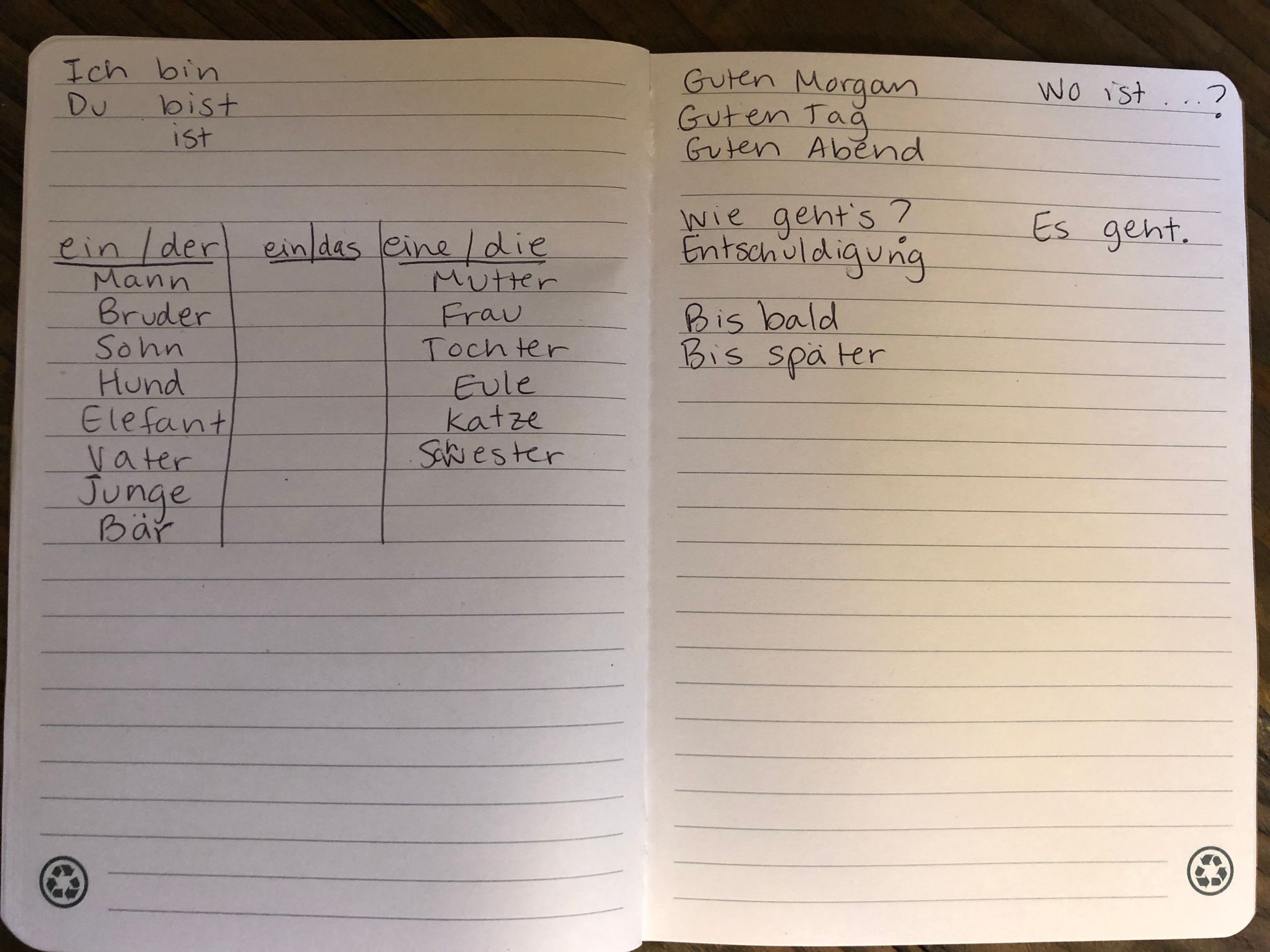
In just the first week—completing the first three units of the course—I had already learned a lot of the key expressions and building blocks that I used in Germany:
- Vocabulary about food and drinks, like Kaffee (coffee), Brot (bread), and Wasser (water)
- Some words for people and animals, including Schwester (sister), Mann (man, husband), and Katze (cat)
- The most important question for travelers: Wo ist ___? (Where is ___?)
- Combining words like und (and) and oder (or), which were especially helpful for my food orders (always mit Käse, bitte "with cheese, please")
- Grammatical gender categories and basic word order
- A lot of words that will help me interact in conversations, including ja (yes), nein (no), bitte (please), and tschüss (bye)
By the end of Week 1, I could also introduce myself, make simple sentences ( Die Katze ist sehr gut! "The cat is very good"—which wasn't even in my lessons, I don't think!), and be polite (I knew I'd need Entschuldigung (excuse me) a lot!).
Here's some of what I learned to do in Units 4-7:
- Talk about where people are from ( Ich komme aus Amerika und Frau Heidi Klum kommt aus Deutschland, "I am from the U.S., and Ms. Heidi Klum is from Germany")
- Use formal titles and speak formally to others (I'd need this if I met Frau Klum or Frau Angela Merkel, according to my lessons)
- Discuss some activities and hobbies, conjugate verbs about them (!!), and say how often they happen—which means I can make longer sentences to say it all!
- Describe all kinds of buildings and businesses and where they are located (and I heard those direction words a lot, for where bathrooms were, which train doors would open, and more)
- Count up to 10, which was basically all I needed for a quick trip, since large numbers like prices were usually printed on receipts or displayed on cash registers
So, was 4 weeks enough to learn German?
I wouldn't say I learned the entire German language, but I had a great time with the German I learned! I kept track of what I was able to do in German in a Twitter thread . This was a really fun way to celebrate using the language during my trip, and I love having it as a souvenir to remember not just what I did in Germany, but all the ways I was able to use German!
I also accomplished all my goals: I was able to greet and be pleasant to German speakers, I recognized information all around me (including on menus and train schedules)—and I achieved my stretch goal of having a small conversation! Or, sort of 😅 The conversations I had were very tiny, but my big accomplishment was ordering my breakfast at a German café, in a convincing enough way that staff responded to me in German—far more German than I could understand! 🏆
For my traveling style, I'm much more comfortable having a few months of language study under my belt, like I had for Italy , so I can express myself better, understand people's responses, and put more words togethers. I felt comfortable and confident using what I learned in under a month, and I wonder how my German will be after eight months, next summer! 😉 🇩🇪
Related Posts All Posts
How to use the verb "to be" in english, 13 synonyms for "interesting" to improve your english writing.
LearnGermanOnline.org
Choose from dozens of free online resources for german learners.

German Language for Travellers: Learn German Travel Phrases
Last updated on April 4, 2024
If you are planning a short holiday stay or a business trip to Germany you do not need to learn any German as most people you are going to meet will speak some English anyway. But, it will not hurt if you learn some basic German phrases, such as greetings, just to sound nice. However, if you are traveling to Germany or any other German-speaking country more often, learning a few essential German travel phrases and expressions may help you get along in situations when there are no English speakers around. Below you will find an overview of free Internet resources that largely focus on German for travellers.
German for Tourists on YouTube
- German Phrases for Travelers is a 20 min video that will teach you the very basics of the German language that any foreigner travelling around Germany will find useful.
- Basic German Travel Phrases from expertvillage is a collection of fourteen youtube videos that will not only teach you essential German travel phrases like those used when greeting people, asking for directions, travelling through airports, seeking accommodation, ordering in a restaurant, renting a car or expressions used in emergency situations, but will also give you a couple of useful travel tips on must-see German locations for foreign visitors.
Interactive Online Courses for Travellers to Germany
- LingoHut offers a free German course suitable for tourists as most of their 109 lessons focus on travel topics such as understanding directions, airport and hotel conversations, moving around town, sightseeing, shopping, ordering food at a restaurant, etc. You will learn basic vocabulary and phrases related to each topic. Each lesson includes vocabulary training, flashcards, and matching, tic-tac-toe and concentration games as well as a listening game.
- Goethe Verlag has prepared a German course for beginners as part of their series called 50 languages. This course contains many lessons that frequent travellers to German-speaking countries may find useful. In the first 80 or so lessons you will learn basic German phrases related to the most common conversational topics whereas the remaining lessons provide examples of sentences illustrating the use of German grammar (this part may be difficult to understand without further explanation, though). You can access this course online for free, download all of its 100 lessons as mp3 files or try it on your mobile device. However, only the first 30 lessons are free in the mobile application. Complete course for portable devices will cost you $2.99.
German for Travellers on Mobile Apps
- Bravolol is a mobile application for foreign visitors to Germany who wish to learn some basic German phrases and vocabulary most frequently used when traveling around. You will be listening to the speaking parrot and repeating the phrases and expressions you heard. Whenever needed you can search for phrases by keywords. This app can also be used offline. The basic version is free but the full version will cost you $4.99.
German Travel Phrases on PDFs
- German for Confident Travel is a free downloadable German travel phrasebook in the PDF format. It contains hundreds of German phrases with English translations and explanations on when to use each phrase. This phrasebook also provides pronunciation guidance for English speakers. The main focus is on travel-related topics such as greetings, food, accommodation, shopping, transportation and socializing.
Social Platforms for Travellers
- PolyglotClub is a social platform where people can find conversation partners in foreign countries who are native speakers in the language they are trying to learn. However, this platform is also used by travellers who wish to connect with natives in the country they are planning to visit. They can ask them all sorts of questions about their country, language and culture to become more familiar with the place before they leave on a trip. Likewise, travellers can ask their language exchange partners before they go on a trip to teach them correct vocabulary to be able to take a taxi, check at a hotel, ask for directions or order meals and drinks at a restaurant.
- Interpals brings together people from all over the world who are learning foreign languages and/or are looking for travel buddies abroad that will show them around when visiting their town. Although this platform is not specifically designed for teaching travel phrases, it is very likely that these will be some of the first expressions you will learn before and during your visit to another country.
Other Great German Learning Resources for Travelers
Also, do not forget to check out our section on German beginner courses where you will certainly find additional lessons that teach vocabulary and phrases you can use on your next trip to Germany or any other German-speaking country. Alternatively, for making friends in foreign countries who can help you learn their native language and introduce you to their culture see the list of free language exchanges . Your German language exchange partner will not only help you learn some basic German travel phrases but may also want to meet you in person and show you around their town next time you are visiting Germany.
Travel German FAQs
‘Ja’ (yaa) and ‘Nein’ (nain).
The first words you may want to learn before your trip to Germany should include: ‘Ja’ (yes) and ‘Nein’ (no), greetings such as ‘Hallo’ (hello), ‘Guten Tag’ (good day), ‘Auf Wiedersehen’ (good bye) and a couple of words to sound polite such as ‘Bitte’ (please), ‘Danke’ (thank you), ‘Entschuldigung’ (sorry, though many Germans also say sorry) and ‘Gesundheit’ (bless you).
‘Bitte’ is one of the most frequent words you will hear when visiting Germany and usually means ‘please’ or ‘yes, please’. As an interjection it can also translate as ‘you are welcome’, ‘here you go’ or ‘go ahead’. ‘Die Bitte’ is also a noun meaning a ‘plea’, ‘request’ or an ‘appeal’.
‘Bitte schön’ are actually two words used most often as a polite response to someone saying ‘Danke schön’ or ‘Danke sehr’ (i.e., different ways of saying thank you such as ‘many thanks’ or ‘thanks a lot’) and it means ‘you are welcome’, ‘my pleasure’ or ‘not at all’.
The most common casual German greetings are ‘Grüß dich!’ and ‘Hallo!’.
The German word for tip is ‘Trinkgeld’ which literally means ‘drink money’, suggesting that you usually tip the waiter. It is a kind of gratuity, not a service charge. Hence, if you were happy with the service, you round up the bill by adding up to 10% extra. But, if you were not satisfied, there is absolutely no reason to leave a tip.
You may hear people say ‘gerne’ quite often while travelling in Germany, especially as a response to saying ‘thank you’ to them. It is a polite expression that translates as ‘gladly’ or ‘with pleasure’, meaning that the person enjoyed helping you.
Genau literally means “exact(ly)”, “accurate(ly)” or “precise(ly)”. However, its other meanings are “that’s right”, “yes, that’s it”, “yes, that’s correct” or simply “right” or “yes”. This broader meaning is the main reason why German speakers use the word “genau” so much.
The journey is the reward
The Best Way to Learn German: The Intentional Immersion Method

Just like all languages, the best way to learn German is through immersion. But you don’t have to travel all the way to Germany to immerse yourself in the language as you are learning it.
The best way to learn German is by following these steps:
- Work out why you want to learn German.
- Get used to how German sounds and speak from day one.
- Build your language learning toolbox with fun resources and friends.
- Do something in German, every day.
Intentional immersion
Immersion without conscious practice doesn’t help you learn a language. When I initially moved to Germany, I didn’t speak or understand a single word. I did what most people do when moving into a new country without language skills – I attended an intensive course at the local community college. I picked up some vocabulary and grammar, enough to cover the basic things taught in the textbook – directions, prices, where I was from.
But even though I was living in Germany, I couldn’t understand or speak German – I was an English teacher, spoke English at home, watched movies and TV in English, and surfed the English web for information. I didn’t intentionally immerse myself and therefore it didn’t stick.
Four years later, I decided to get serious about learning German. I’m now working as German-English translator on legal and medical content, so I know that intentional immersion really works!
Table of Contents
Why are you learning German?

I agree with the many polyglots and language hackers – the first and most important step is to work out your why. Once you find your why, you’ll find your motivation. And instead of German being too difficult, it’ll become a fun challenge.
My reason for improving my German? First, to be able to chat with researchers and hospital staff and then to become a skilled translator.
You may want to learn German for school classes, to pass an exam, apply for jobs, travel on holidays, chat with German-speaking family members and friends, or simply because you love languages.
Whatever your reason, let it guide how you immerse yourself in the German language. Make sure you pick the language learning tools and tasks that you enjoy, and that are relevant to your non-language interests. The best way to learn German is to have fun while doing it!
German reading, writing, speaking and listening
By working on all four skills from the start, you will build a more powerful language-learning network in your brain. You’ll be able to remember words and phrases more quickly, and learn many more new words because of the associations you’ve already built in your mind.
This is especially important if you intend to sit any of the official German exams , where reading and listening skills are assessed with multiple choice questions, written skills with a short essay, and speaking skills with an interview.
The structure of a typical standardized language test

Learn German faster: Speak from day one!
In my opinion, both as a language learner and a language teacher, speaking is by far the most powerful skill for learning a language quickly. Of course, this means you shouldn’t be afraid of making mistakes – no one will hate you for using the wrong words or grammar!
Speak aloud, right from your first steps as a beginner: Name things, repeat simple sentences, repeat the words you heard and try to mimic their pronunciation, and sing along to German lyrics. It can take a little while to build your German pronunciation ‘muscle memory’.
Use the best tools for learning German
Don’t stick to one learning tool, like a single textbook, a course you attend in person, an audio program or even a single app. Have a variety of interesting tools in your toolbox and your motivation will stick around.
Don’t keep doing something you hate – that’s deadly to your German learning goals! If you aren’t having fun with one or more of the tools, books or courses, drop it and find another one that you do enjoy.
Consider some or all of the following tools and activities:
- in-person courses and/or online tutoring
- mobile apps (dictionaries, language acquisition apps like LingoDeer , games)
- movies and TV shows
- podcasts and music
- online language exchange communities
- streamers and hobbyists
Building German listening skills
Movies and TV shows made outside Germany are almost always dubbed in German – check the language settings of your favorites to see if there is a German audio track. Just don’t look at their mouths when they speak – when it’s not perfectly synchronized, dubbed audio can be very distracting.
Kaberett shows on TV are great once you reach an intermediate level. These satirical revues with a little standup comedy are fantastic both for building skills and for gauging your progress. Die Anstalt is one of my favorites.
German podcasts are very helpful, especially as a beginner. The Slow German podcast was very useful to listen to as I walked to work. But I believe it’s much better if you don’t only listen to language teaching podcasts. Listening to people talking about normal topics in German will level up your conversational skills more naturally.

→ Browse through the German podcast directory on Apple .
Native speakers in natural settings are best. Are you having trouble finding a native speaker? Try Twitch – it’s not just for games these days. Twitch categories like Art and Real Life have German-speaking streamers and audiences that you can chat with.
→ Browse the Twitch directory to find a category you are interested in, then add “German” to the filter to find German-speaking streamers.
Developing an ear for German accents
If you use an app to build vocabulary and grammar, make sure the exercises give you an option to hear the words, spoken by a native speaker. Look for a textbook that comes with audio or video versions of the conversations.
Don’t forget to listen to a wide range of speakers to understand the different accents and dialects: Swiss German, Austrian German, and people in each of the states have different ways of pronouncing German. People in Bayern and Sachsen have some of the stronger accents, even when they aren’t speaking in their own dialects!
Practice speaking German
Tutors, language classes, friends, family, meetups – the more German speakers you can actively practice speaking with the better!
- If you’re a gamer, join a guild or team that speaks German and chat in voice channels.
- Try meetup to find a local German-speaking group around your interests.
- Check for German-speaking groups on the online platforms you use for your hobbies: Ravelry, Facebook and special interest sites often have German-language groups.
- Find a tandem partner on myLanguageExchange , Polyglot club , or iTalki – you might become great friends!

Don’t worry about making mistakes – every German speaker I have met was excited when I spoke to them in German, even when I made mistakes.
Apps that record you speaking are very useful, especially if you can compare your phrase with one recorded by a native speaker. These are perfect for working on your pronunciation!
And finally, turn your voice-assistants to German: Siri, Cortana, Google and Alexa are infinitely patient!
Reading German
One of the easiest ways to get started in German and build basic your vocabulary and grammar is to use a language acquisition app or a textbook.
German textbooks
When I started seriously learning several years ago, German apps were few and far between, so I used a set of textbooks from Heuber to get my language certification quickly. There are better German self-study textbooks available today than there were back then.
German grammar books
One of the best grammar explanations I found is English Grammar for Students of German. Schaum’s Outline of German Grammar is also a good reference with useful exercises. The Practice Makes Perfect series is great for targeted practice exercises.

Books and news in German
Read your favorite books translated into German – you already know the story, and if you pick something easier, it will expand your vocabulary quickly. Graded German readers are easily available from online stores and even in public libraries. Reading is especially important for German language learning because the written past tense of verbs does not match how they are spoken!
Mobile devices and computers
Turn your computer and mobile devices into German if you are familiar enough with the menu options to turn them back.
Improving your German writing skills
The language exchange websites mentioned above also list German language exchange partners looking for an email or chat penpal. You could also find an online group or forum on any topic that you are interested in, and start chatting in German.
There are a couple of aspects of German that scare learners, especially when writing or speaking in German: The gendered articles for nouns (der, die, das) and the various cases (nominative, accusative, dative and genitive).
The best way to learn “der, die, das” and the cases
The articles used with nouns, der, die, das and the four cases are considered to be the most difficult parts of German grammar to master. That’s partly because they are so tightly interwoven – the case affects which article is used, and the article even has a knock-on effect on adjectives!

Many German learners, including me, struggle to use these correctly. But don’t worry – even if you make a mistake, German speakers will understand, and some will offer helpful corrections.
The best way to learn the German articles is to learn them like local children did – memorize both the article and the noun together. For example, when you learn the word for “cup”, you should memorize “die Tasse” not just “Tasse”. An app that regularly drills you on nouns and their correct gendered articles using flashcards and exercises is invaluable for memorizing the articles.

The case affects which form of the article you use, and is one of the trickier aspects of German grammar for English speakers to get comfortable with. Of course, it’s made more difficult by knowing which article goes with which noun.
The best way to learn German cases would be through lots of listening and speaking practice. The more you hear and use phrases and combinations that include these different cases, the faster you’ll memorize them.
Use an app that lets you work on all four skills
Language acquisition apps like LingoDeer are convenient – you can fill all the dead time you have in your day with German language studies.
Only have a couple of minutes between classes? Step through vocabulary and grammar flashcards.

Waiting for a while at the doctor’s or for a bus to arrive? Grab your phone and do an exercise or two. You don’t always need sound or voice input to complete these lessons.
People are late for a meeting? Complete a short quiz!

Can’t sleep? … Maybe don’t use your app. Soft music with German lyrics would work better.
The best way to learn German is daily practice with an app
Apps are masters at encouraging us to use them every day. With reminders and notifications, streak tracking, spaced repetition features that take the tedium out of flashcards, you name it: language acquisition apps are definitely one of the best ways to learn German, if only because they keep our motivation high!
What are your favorite ways to learn German?
What tools, platforms, tricks and tips do you use to learn German?
Published by Kymberly Fergusson
Freelance writer, editor and translator. Eternally curious, eternally learning. Managing multiple chronic pain illnesses. View all posts by Kymberly Fergusson
Leave a comment Cancel reply
What an absolute incredible post and perfect content. This right here is gold! I’m so gonna use this, while I study German in Berlin. Going to learn some badass German as soon as my intensive German course begins in June. And your content is going to get me through this 😉 So thanks I’ll visit again and report 😛
Discover more from LingoDeer
Subscribe now to keep reading and get access to the full archive.
Type your email…
Continue reading
Travel and Language Adventures

Ultimate and Printable Guide: Basic German for Travelers

Are you planning a trip to Germany soon? If so you’re not alone, approximately 37.4 million people visit Germany every year making it the ninth-most visited country in the world. German is also one of the most prevalent languages spoken and taught worldwide, with over 130 million speaking it around the globe.
Having some knowledge of basic German words and phrases in your repertoire is a great asset before departing on your trip. Even if a large percentage of Germans know some English, they may not be comfortable using it. Additionally, locals usually respect the fact that a visitor has taken the time to learn some of their language.
Some German words are quite similar to English as you will see. However, the pronunciation of some other German words can be quite daunting. You may not have a community of native German speakers at your disposal to help with pronouncing new words either. While talking with native speakers is the best way to learn, online tools like Google Translate or Duolingo can help in the meantime.
Without further adieu, here are some great Basic German Words and Phrases you should know before traveling to Germany:
General Greetings
- Hello — Hallo
- Thank You — Dankeschön or simply ‘Danke’
- Good Morning — Guten Morgen
- What time is it? — Wie spät ist es?
- Good Day — Guten Tag
- Good Evening — Guten Abend
- Goodbye — Auf Wiedersehen
- Please — Bitte
- Sorry — Entschuldigung
- My name is *name* — Ich heiße *name*
- How are you doing? — Wie geht es Ihnen?
- Do you speak English? — Sprechen Sie Englisch?
- Airport — Der Flughafen
- Train Station — Der Bahnhof
- Restaurant — Das Restaurant
- Washroom — Der Waschraum (WC)
- Hotel — Das Hotel
- Museum — Das Museum
- Metro — Die U-Bahn
- Car — Das Auto
- Taxi — Das Taxi
- Bus — Der Bus
- Ticket — Das Ticket
- Street — Die Straße
- Passport — Der Pass
- Luggage — Das Gepäck
Food and Drink
- Water — Wasser
- Beer — Bier
- Coffee — Kaffee
- Bread — Brot
- Cheese — Käse
- Breakfast — Frühstück
- Lunch — Mittagessen
- Dinner — Abendessen
- Food — Essen
- Drinks — Getränke
- Menu — Speisekarte
- Cheque, please! — Rechnung bitte!

Get the Free Printable Version HERE
The German language has ‘formal’ and ‘informal’ words that English does not have to address someone. For instance, in English, you would just ask ‘How are you doing?’, whereas Germans can ask either ‘Wie geht es Ihnen?’ (formal) or ‘Wie geht es dir?’ (informal). If you have never met someone before, make sure you use the formal ‘you’.
Another thing to remember: the emergency number in a foreign country may not be the same as your own. For instance, in Germany, it is 112. Something important to note before traveling to a new place, just in case you need it!
With some Basic German words and phrases in your repertoire, you’re ready to enjoy your visit to Deutschland!

You May Also Like

Ultimate and Printable Guide: Basic French for Travelers

Ultimate and Printable Guide: Basic Swedish for Travelers

60 Essential German Travel Phrases
Are you planning a trip to a German-speaking country? There are so many reasons for learning basic German travel phrases before you jump on that plane. And we invite you to try out Drops to learn more than 2500 useful German words and phrases !
The locals will appreciate any effort you make to speak the local language. You’ll make traveling far easier on yourself as you’ll be able to communicate more clearly. You can get to know people who don’t speak English and experience a different culture.
Despite the common belief, not everyone speaks English. Even if you are planning a city break, it will be appreciated if you make an effort to speak a bit of German. It’s a sign of respect for the people in the country you are visiting.
If you want to venture away from the cities, you’ll likely encounter a lot of people who hardly speak any English at all. So it’s worth being prepared!
So let’s dive right in and take a look at my favorite tried and tested German travel phrases.

German Greetings & German Basics
Hallo - “hello”
Tschüss - “bye”
Auf wiedersehen - “goodbye”
Tschau - “ciao”
Guten Morgen - "good morning”
Guten Tag - "good day”
Guten Abend - "good evening”
Gute Nacht - "good night”
Danke / Vielen Dank / Dankeschön - " thanks” and “many thanks”
There are a few ways to say thank you in German. Just use danke for now but expect to hear the other versions as well.
Bitte - "please”
Sorry - "sorry”
Entschuldigen Sie bitte - "excuse me” or “sorry”
Ja - "yes”
Nein - "no”

German Phrases You Might Hear
You might also hear the following German expressions:
Gerne - "gladly” or “my pleasure”
Bitte schön - "there you go” or “you’re welcome”
Both of these are often used in restaurants and cafes, when the waiting staff bring your food or drinks over, and also in shops. More on that later!
German Phrases in the Hotel
One of the first things you’ll do when you arrive in a German-speaking country is check into your hotel. There are a few standard phrases which you can use, and the checking in procedure usually follows the same pattern.
The receptionist will ask if you have a reservation (listen for ‘Reservierung’ ), they’ll ask your name (listen for ‘Name’ [Nahmeh] ) and they’ll give you your key (listen for ‘Schüssel’ ).
Checking in to the Hotel in German
Kann ich bitte einchecken? - “Can I check in please?”
Ich habe eine Reservierung - “I have a reservation”
Mein Name ist (...) - “My name is (...)”
Ich bleibe bis Montag hier / bis zum vierundzwanzigsten (24th) Juni hier - “I’m staying here until Monday / until the 24th June”
Wann / wo gibt es Frühstück? - ”When is breakfast?”
Gibt es hier WLAN [vee-lan]? - “ Is there wifi here?”
Wie lautet das WLAN-Passwort? - “What is the wifi password?”
Um wie viel Uhr muss man auschecken? - “By what time must I check out?”
Kann ich bitte auschecken? - “ Can I check out, please?”
What You May Hear in German at the Hotel
Haben Sie eine Reservierung? - “Do you have a reservation?”
Wie ist Ihre Name? - “What is your name?”
Bleiben Sie hier für drei (3) Nächte / eine (1) Woche / zwei (2) Wochen? - “Are you staying here for 3 nights / 1 week / 2 weeks?”
Frühstück ist bis sieben (7) Uhr bis zehn (10) Uhr - “Breakfast is from 7am until 10am”
Ihre Zimmernummer ist… - “Your room number is…”
Shopping in German
If you’re out exploring the city, you’ll probably want to do a bit of shopping for souvenirs. The first phrase (ich schaue mich nur um) in this section was pretty essential for me in the early days when I was too nervous to speak much German. If a shop assistant comes up to help and you’re just having a look around or you’re too nervous to speak, this phrase can come in handy.
What You Can Say When Shopping in German
Ich schaue mich nur um - “I’m just looking around”
Ich suche nach… - “I’m looking for…”
Wie viel kostet das? - “How much does that cost?”
Kann ich mit Bargeld / Kreditkarte bezahlen? - “Can I pay with cash / credit card?”
Könnte ich eine Tüte haben? - “Could I have a bag?”
What You May Hear While Shopping in German
Kann ich Ihnen helfen? - “Can I help you?”
Möchten Sie es probieren? - “Would you like to try it?”
Eating Out in German
When it comes to eating out, this is a really great way to practice a bit of basic German. You only need a few phrases to get by. Your power phrase in this section is ich hätte gern… which you can use for any food or drink order. It’s very polite and the serving staff will appreciate it.
Like when checking into the hotel, there is usually a set pattern to look out for when in a cafe or restaurant:
The waiter will ask for your drinks order (listen for trinken ), they will then ask for your food order (listen for essen ) and later they will ask if you’d like a dessert (listen for Nachtisch ).
What You Can Say in German When Dining Out
Haben Sie ein Tisch für ein (1) / zwei (2) / drei (3) Person(en)? - “Do you have a table for 1 / 2 / 3 person / people?”
Ich hätte gern (…) bitte - “I would like (...) please”
- einen schwarzen Tee (mit Milch) - “a black tea (with milk)”
- einen Kaffee - “a coffee”
- ein Mineralwasser - “a mineral water”
- ein Glas Rotwein - “a glass of red wine”
- ein Glas Weißwein - “a glass of white wine”
- ein Bier - “a beer”
Könnte ich ein stück Kuchen haben? - “Could I have a piece of cake?”
Was empfehlen Sie? - “What do you recommend?”
Kann ich bitte bezahlen? - “Can I pay please?”
What You Might Hear in German at a Restaurant
Was möchten Sie? - “What would you like?”
Ich empfehle (...) - “I recommend (...)”
Was möchten Sie trinken? - “What would you like to drink?”
Was möchten Sie essen? - “What would you like to eat?”
Möchten Sie die Nachtischkarte? - “Would you like the dessert menu?”

Sightseeing in German
When you’re out sightseeing, you’ll probably be able to find an English language tour guide. But there are a lot of situations where you might be on your own and need to ask where something is. The simple phrase wo ist… is very useful and easy to remember.
Entschuldigen Sie bitte - “excuse me please”
Wo ist (…)? - “Where is (...)?”
- die Touristeninformation - “the tourist information”
- das Stadtzentrum - “the city centre”
- das Museum - “the museum”
- der Dom - “the cathedral”
- das Rathaus - “the town hall”
- der Bahnhof - “the train station”
When You Struggle to Understand German
If all else fails, here are some phrases to memorize to help you if you have trouble understanding German. Trust me, I used these a lot when I first started visiting Germany. If you’re a bit nervous about your German, committing a few of these phrases to memory can help you get out of tricky situations.
Ich verstehe nicht - “I don’t understand”
Ich spreche kein Deutsch - “I don’t speak German”
Mein Deutsch ist nicht so gut - “my German is not so good”
Sprechen Sie Englisch? - “Do you speak English?”
Langsamer bitte - “slower please”
Können Sie das bitte wiederholen? - “Can you repeat that, please?”
Was bedeutet (…)? - “What does (...) mean?”
Bitte haben Sie Geduld mit mir - “please be patient with me”
So now you know all my essential German travel phrases! These helped me out a lot, and I hope you find them useful on your travels, too!
Ready to learn more? Try Drops!
About the Author: Emma Jackman is the founder of Emma Loves German an all-round resource for German learners. You’ll find articles on speaking, reading, writing, and listening in German as well as grammar tips, frequently used phrases, and other language learning tips.
"Love my fun language learning and practice with daily Drops sessions, and monthly Challenges to participate in, and quiz mode to test contextual learning - brilliant! So much thought, consideration and inclusivity has gone into the design and function of this app, I can't praise it highly enough."
"Great little learning app! I've learned at least 5-10 new words in Spanish in my first 5 minutes. Easy to pick up and thorough."
"Great language learning app! It helps you get daily words done in a short amount of time. I would highly recommend using drops to learn whatever language you want to learn."
"What an amazing app! I’ve tried several apps for language learning and I cannot recommend Drops enough. I don’t know how a short Drops session can teach me as much as 1 hour+ of focused use of other apps, it’s like magic."
"Amazing language learning tool. Excellent app for increasing vocabulary in your foreign language of choice. Useful for beginner, intermediate, and advanced learners. The repetition of the words makes them much easier to remember, and without the hassle of making your own flash cards. I have used Drops for two years now and have seen great results."
"Very engaging way of learning Yoruba in a stimulating way. Will be using to learn myself and to teach my child!"
"Less than a week in but using this alone with the popular one babbel working on German. When using just one app I got bored, babbel is not as fun. So using both at once actually let's my adhd do its thing but I still focused since I can switch easily between both apps and work in different areas. Also I like the quick little sessions makes me feel like I actually did something."
"So engaging. I speak Spanish well, but often forget words in conversation that I know I should know. This game is fun and quickly brings back vocabulary I may have put in the back of my brain after not using it for awhile. Case in point: I spent 11 years in construction, then went back to teaching in English and/or Spanish depending on the teacher/student"
"Amazing app"
"I have been desperate to find an app that really helps me learn Japanese and this is the best by far"
"I like that you can switch between different subjects and topics constantly and it’s really easy to learn a lot of vocabulary very quickly! This works perfect for me because I can learn a lot of words but then practice sentence structure with my grandmother whose from Croatia"
"Fantastic app great opportunity to learn languages on your spare time. Drops makes it easy to learn and retain words to formulate sentences."
"Best of the best. Awesome app in every sense"
"This app us the best and how I am doing Learning Ukraine is Helping me alot tnx"
"Definitely recommend! I'm using this to learn mandarin 10/10"
"Fun and interactive. Great for repetition!"
- Drops iOS | Android
- Scripts iOS | Android
- Droplets iOS | Android
- Visual Dictionary
- Available Languages
Work with Us
- Partnerships
The Best Way To Learn German
Is there a best way to learn german am i just bad at learning languages.
So you want to find the best way to learn German, but you’re not sure where to start. Maybe you’ve never tried to learn a new language before. Or maybe you have, but your language learning traumas, challenges, and trip-ups in the past have given you the idea that you’re just not made for language learning. But what if that simply weren’t true? Don’t listen to the stories you tell yourself that you’re not good enough or you can’t do it!
It’s natural to feel discouraged by past negative experiences or the fear of trying something new and failing. But the reality is that you’re likely not bad at learning languages. You just might not have been exposed to the best way to learn German — one that works for you and your particular learning style. Everyone learns differently, and there’s no wrong way to do it.
Besides, making mistakes is all part of the learning process. Learning by doing means trying, failing and trying again. If you can feel comfortable with not immediately understanding things, it’s easier to stay relaxed, curious, and to enjoy the process.
There are plenty of reasons, too, to give learning German a try (or perhaps another try). Learning German is a worthwhile investment that will open you up to a whole world of speakers — 132 million of them, in fact. With German in your repertoire, you can travel the planet and experience the rich history and culture of communities in Europe, North America and even Africa. And you can more readily engage with German-language media, from films to television shows to literature and podcasts from around the globe.
Finding the best, most effective and fastest way to learn German that also fits your schedule, budget and learning style isn’t as difficult as it might seem.
Finding The Best Way To Learn German
When it comes to the best way to learn German, there are many options to choose from, each with their own advantages and limitations:
Classroom learning and tutoring — You’ll get more regular, personalized feedback from an instructor and be able to practice speaking, but it can take a regular commitment of time and often money, and you might not be able to work at your own pace.
Immersion learning — You’ll be challenged and required to adapt more quickly to a new language and culture, but the investment is quite extreme and requires money, time and the willingness to overcome major adversity.
Software and apps — You can work at your own pace and choose content that works for you, but you don’t get as much practice in conversations with actual speakers, and you won’t get individualized interaction with native speakers.
German-language media — You get to hear and read the German language as it’s used by native speakers in real-life situations (and often for free), but you don’t get to practice speaking or learn the underlying rules and nuances of the language.
What About Learning German With Software And Apps?
Mobile apps and desktop software are ideal for people who want language learning to be a flexible, on-the-go, and more noncommittal process. They let you learn at your own pace and on your own schedule, so they’re ideal for people who are busy and less able to commit to a regular routine.
But one major pitfall of many language-learning softwares and apps is that they don’t give you the chance to practice speaking in actual conversations. They can teach you grammar rules and vocab, but there aren’t many ways to put these skills into practice. That’s why using technology exclusively to learn a language can feel like a very impersonal process if you don’t have a way to put your skills to use in real-life dialogues.
On top of that, more top-tier apps and products often don’t come without a price. You might find yourself paying an up-front flat fare or a monthly subscription for higher-end products. Sure, there are free apps and software out there, too, but you often end up sacrificing quality in the end, diluting the power of your learning experience.
Why Is Babbel One Of The Best Ways To Learn German?
If you want a mix of some of the best elements of each of these methods of learning German, Babbel might just be the app for you. Babbel is designed by a team of language experts, educators, and designers who know all about what it takes to get the most out of learning a new language — so you are guaranteed a top-quality German learning journey that’s effective, engaging, and yes, even fun.
Unlike many other language apps, Babbel works so well as a language learning tool by immersing you in the types of dialogues you’d have in real life, right from the very first lesson. Whether it’s ordering at a restaurant in Regensburg, booking a hotel room in Hanover or making a new friend in Namibia, Babbel will help you practice having the types of actual conversations you’d have with native speakers in the German-speaking world.
Learning with Babbel is easy and intuitive, and with lessons that only take 10 to 15 minutes to complete, you can learn at your own pace and choose the courses that are relevant to you. Whether you’re too busy for a language class, a complete beginner, needing to brush up before a vacation or business trip or wanting to relearn everything you forgot in high school, Babbel can be customized to fit your needs.
Babbel’s German courses are affordable, accessible online and on mobile devices, and proven to strengthen your writing, reading, listening, and speaking skills. The Review feature brings back information you’ve been learning when you’re most at risk of forgetting it, ensuring that it gets locked in your long-term memory.
Try a free German lesson with Babbel and see for yourself how quickly you’ll be on your way to speaking German with confidence — like you’ve always wanted to!
Recommended by learners like you
Choose a language course, browse our learning topics.
- Learn German
- How to speak German
- German phrases
- Learn German free
- German lessons
- Best way to learn German
- German vocabulary
- German grammar
- Join Babbel Live Online German Classes
- Test Babbel Live For Free
Discover All Babbel Products
- Babbel Live
- Babbel Podcasts
- Babbel For Business
- Babbel As A Gift
- Babbel Magazine
- Inside Babbel
- Refer A Friend
About Babbel
- Customer Service
- Babbel Affiliate Program
- Partnerships
All Language Resources is an independent review site. If you click a product link, we may earn money from a seller at no cost to you. Writing and analyses are author opinions. Learn More

Learn German – A One-Stop Guide of Tips and Resources
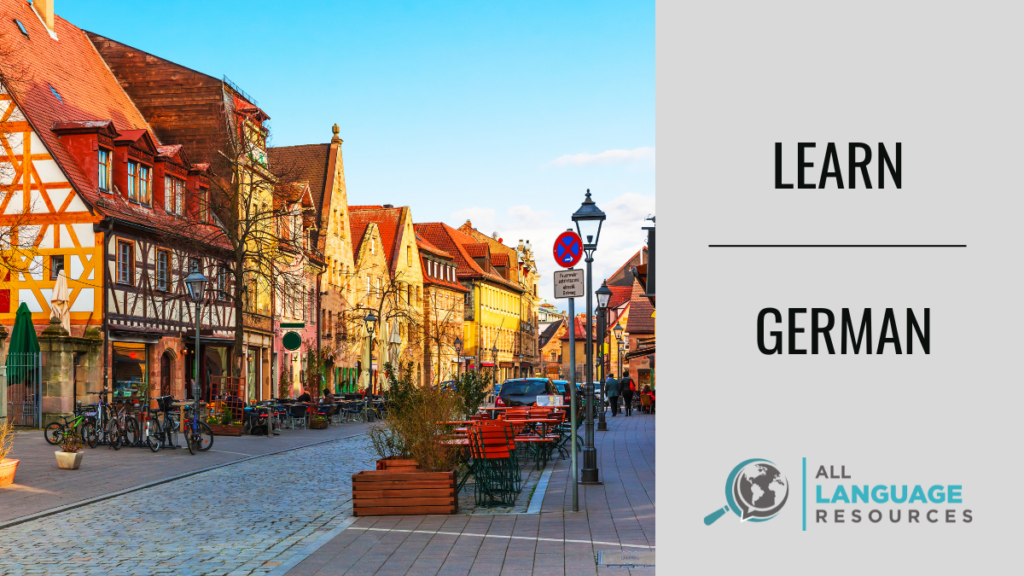
Given its popularity, getting started with German could be a bit overwhelming for a beginner.
With more than 100 million native and non-native speakers worldwide, German is among the most spoken languages in the world. Finding a German language resource may not be too difficult, but finding one that works for you may be more challenging.
Whether you want to learn German for travel, work, or simply for fun, there are plenty of resources available to help you reach your goals. As you learn, you’ll understand the structure of the German language and how it differs from other languages.
If you want to go straight to reading our recommended resources and reviews, check out these posts:

How to learn German? Learn German on your own? How to learn German fast? Learn German for Free? Find out here. Learn German with these tips and resources.
In this article, we’ll share some resources to look into as well as some of the best ways to learn German. This will help you choose the approach that works best for you. Let’s get started!
Table of Contents
Learn german on your own.
Learning German on your own is entirely feasible with dedication and the right resources.
Start by setting clear goals and creating a structured study plan that fits your schedule. Utilize online resources such as language learning apps like Duolingo or Babbel, which offer interactive lessons and exercises tailored to self-paced learning. Combine these with textbooks, online courses, and grammar guides for a comprehensive understanding of the language’s structure and rules. Immerse yourself in German media like movies, TV shows, podcasts, and music to improve your listening skills and expose yourself to authentic language use. Practice speaking and writing regularly, whether by recording yourself speaking or journaling in German.
Finally, join online communities or language exchange platforms to connect with native speakers and practice conversation skills. Consistency and perseverance are key to success when learning a language independently.
The Best Way to Learn German
Take a german language course.
The best way to learn German is with a course that uses immersion to teach you a foreign language. Immersion means learning German words in the context of larger conversations, stories, or recorded dialogues. This an immersion-based method you start to pick German grammar rules intuitively and learn vocabulary using full sentences.
Learning German this way makes it easier to take the material you learn from the course and start using it in real-world conversations. It also keeps you from having to translate from your native English into German when trying to speak, which is a common problem for many beginning German learners.
We have a few solid recommendations for the German language courses. See our Best German Courses for our up-to-date favorite picks.
Take German Classes Online
Online German classes can be a great way to learn German. A German teacher will be able to help you with any difficult grammar rules or pronunciation issues. They will also know which parts of the language are most difficult for foreigners, and provide a clear way to overcome them.
There are a lot of websites that provide one-on-one language learning lessons with German teachers via on-demand lessons. One of our absolute favorites is SmarterGerman. It is taught by a fantastically talented teacher/founder Michael, and his German classes are engaging and encouraging. Michael’s students can join his very active SmarterGerman learner community to keep the motivation level up. His lessons are well-structured and thorough, they really are equivalent to going to an expensive language institute.
SmarterGerman caters to very beginners to advanced-level German learners who are aiming for C1 certification. If you are serious about acquiring the German language, SmarterGerman may be something you want to check out.
How about one-on-one language learning lessons with German teachers via video chat or Zoom call? There are a couple of really great ones out there such as Preply and iTalki.
Listen to German Podcasts
If you’re serious about learning German then you will need to develop your listening comprehension skills. One of the best ways to learn German and develop your listening skills is with podcasts.
As a beginner, you should start out with a podcast recorded specifically for language learners. A good language learning podcast will give you much-needed exposure to spoken German, but it will do it in a way that’s appropriate for a beginner. Usually, this means a mix of English and German at first.
Once you become more proficient in the language you can move on to podcasts exclusively recorded in German about any topic you choose. At this level you don’t need to limit yourself to German learning podcasts , you can listen to podcasts recorded for native German speakers.
Watch German Movies and TV
Watching German TV shows and movies isn’t just an entertaining way to spend an evening, it’s a great way to learn German too! Watching TV in your target language will help you see how phrases are used in the real world.
Odds are that you will find some words and phrases used differently than what you were taught in a textbook. This is because movies and television are gateways for slang and informal speech. Language isn’t always textbook and German media is great for helping learn the ins and outs of native speech.
Another way to use movies and TV in your language learning is to watch something in German without subtitles. You can start by just watching a minute or two of a TV show. Re-watch the clip a few times and try to make sense of what you hear. Odds are that you won’t be able to understand everything at first and that’s okay!
After a few listens turn on German subtitles and watch through the clip a couple more times. If you still get stuck you can watch once with English subtitles too. This kind of exercise improves your listening skills and helps you pick up new vocabulary.
Learn to Speak German with Native Speakers
No matter what language you are learning, speaking will be a necessary step in achieving fluency. For many German learners, it’s also one of the most intimidating. It’s not uncommon for beginners to put off speaking German and instead focus on reading and writing.
Don’t fall for that trap!
Speaking German can seem scary at first, but once you get over the fear of making mistakes it’s actually one of the most rewarding and fun parts of foreign language learning! You don’t have to jump on a plane to Germany to find native speakers either.
You can look online for language exchanges and find a speaking partner. Another option is local language clubs. Meetup.com features conversation clubs for most major cities. Also if you have a local university nearby, the odds are that you can find a speaking club there as well.
Experience German Culture by Traveling
Traveling to Germany or another German-speaking country can be the ultimate immersion experience. But you will need to prepare a bit before your trip if you want to get the most out of it. You should try to at least master basic German sentence structure and phrases before traveling abroad. Even better if you could get some practice speaking German too.
The idea is to have a solid enough foundation in the language that you can hold basic conversations while traveling abroad. As a foreigner and tourist in Germany, most native speakers will opt to speak English to you. German people won’t necessarily have the time or patience to wait as you figure out what you’re going to say to them.
As we said before traveling is a great way to experience German culture and level up your language skills. But it’s also an experience best for intermediate learners. Absolute beginners might want to wait a bit before traveling to learn German.
The one exception would be to sign up for a German language immersion program in Germany. These are typically run by language schools or universities and are geared to teaching beginners German.
These immersion programs can last anywhere from a couple of weeks to several months. If you want to learn German from scratch while traveling abroad these programs are a great option.
Learn German Pronunciation
Pronunciation is the one aspect of learning German that most students overlook. Most German learning resources focus a lot on reading, writing, and speaking; but few take the time to help you develop a good German accent.
This is a shame because learning German pronunciation is one of the most effective language hacks to learn German fast. Not everyone realizes this but pronunciation is a physical skill.
Your German friends weren’t born with a special German gene that helps them speak the language. A good German accent is simply the result of knowing how to position your tongue and mouth to make certain sounds.
What makes pronunciation so powerful is that once you can speak German words with a native accent, it will be much easier for you to understand native speakers and to pick new German words during real conversations. Not to mention you’ll be likely to impress a German friend or two.
Pimsleur is a great program if you want to learn German fast using pronunciation. Every lesson on Pimsleur teaches you phrases by having you repeat them syllable by syllable with a native German speaker. This is essentially pronunciation training, and no other German course I know of pulls it off as well as Pimsleur.
Learn German Grammar
Compared to the romantic languages, German grammar is often considered a bit more difficult for native English speakers. German conjugation, articles, and cases are all significant hurdles for beginners.
While we recommend learning German with an immersion-based approach, you will have to grapple with German grammar sooner or later, especially as your proficiency in the language improves. When you’re first starting out, you should focus on learning phrases and useful words to start communicating as quickly as possible.
Only after you start using German phrases should you start learning the grammar behind them.
Learning grammar after having already interacted with the language, helps give context to the rules you learn.
Learn German Idioms
Idioms are always a bit of a challenge when learning a foreign language. This is because the idioms in your native language don’t necessarily carry over to your target language and vice versa. Take for instance the German idiom ich bin fix und fertig which translates literally to something along the lines of “I’m ready and done”, but when used this phrase means “I’m tired”.
Sometimes there are similarities between English idioms and German ones. Um den heißen Brei herumreden literally translates to “to talk around hot mash”, and means something similar to the American idiom beating around the bush .
Knowing idioms will help you understand what you hear when Germans speak more colloquially. Sometimes a phrase might not make literal sense, and you’ll just have to memorize what it means. Other times you will understand the spirit or logic of the idiom and remembering it won’t be so difficult.
Read German Books
Compared to other foreign languages, reading in German is a bit easier for native English speakers. The German alphabet is similar enough to English that you have a bit of a head start there. Also German is a more phonetic language than English, meaning that it’s much more often written the way it sounds.
So it’s a good idea to go ahead to incorporate reading into your German learning routine early on. While reading won’t necessarily help you develop speaking skills, it will expose you to a lot of vocabulary very quickly. If you want to learn more than just common words, reading is an excellent way to learn German vocabulary.
The Easiest Way to Learn German
The easiest way to learn German involves immersing yourself in the language as much as possible, whether through music, movies, or conversations with native speakers.
Start with the basics of grammar and vocabulary, mastering common phrases and essential grammar rules. Utilize language learning apps for interactive lessons, and consider enrolling in a course for structured guidance. Practice regularly, incorporating reading, listening, and speaking exercises into your routine. Engage in language exchange with native speakers to enhance your conversational skills. Remember to be patient and persistent, celebrating your progress while acknowledging that learning a new language takes time and effort.
How to Learn German Fast
To learn German quickly, focus on immersion and intensive practice. Immerse yourself in the language by listening to German music, watching movies with subtitles, and surrounding yourself with German speakers. Use language learning apps and courses that offer intensive lessons and interactive exercises. Prioritize learning essential vocabulary and grammar rules to build a strong foundation. Practice speaking and listening skills regularly, whether through language exchange with native speakers or by speaking aloud to yourself. Dedicate consistent time each day to study and review material.
Additionally, seek out resources tailored to fast-paced learning, such as accelerated courses or intensive language programs. Stay motivated and committed to your learning goals, and don’t be afraid to make mistakes as part of the learning process.
How to Speak German
The best way to speak German fluently is through consistent practice and immersion. Engage in conversations with native speakers as often as possible, either through language exchange programs, online forums, or in-person interactions. Focus on speaking from day one, even if you make mistakes, as it helps build confidence and fluency. Practice speaking aloud, repeating phrases, and mimicking native speakers to improve pronunciation and intonation. Incorporate German into your daily life by thinking and even talking to yourself in German whenever you can.
Additionally, supplement your speaking practice with listening exercises to train your ear and improve comprehension. Remember that speaking a new language is a skill that develops over time, so be patient with yourself and keep practicing regularly to see progress.
Learn German for Free
There are so many options available to help learn German for free, it can be difficult to know where to start. Start by utilizing language learning apps like Duolingo, Memrise, or Babbel, which offer free versions with interactive lessons and vocabulary practice. Explore websites such as Deutsch Gym, which provides comprehensive German blog posts for beginners to advanced learners at no cost. Take advantage of YouTube channels dedicated to teaching German, where you can find tutorials, grammar explanations, and practice exercises. Additionally, access free language exchange platforms to connect with native German speakers who are learning your native language, allowing you to practice conversation skills for free.
Finally, immerse yourself in German media like movies, TV shows, and podcasts, which are often available for free online. With dedication and persistence, you can learn German effectively without spending a dime.
Final Thoughts
As we know, there are many ways to go about the best way to learn German. Finding the method that works best for you is going to take time. Perhaps it will take more than one kind of method. All in all, there are more strategies than this to be able to help you along your language-learning journey. We have come up with some ways to help and there are also diff
These are 11 of the top tips we think we could provide to you. These tips are meant to help with your language-learning journey. German can be a tough language to learn. With proper assistance and dedicated training, anything is possible. There are so many great ways to make language learning fun!
Learn German with These Posts
- Most Recommended German Resources For Learning German
- 130+ Resources To Study German
Leave a Comment
Your email address will not be published. Required fields are marked *

The Science of Language Learning

- GET THE APP

The Best Way To Learn German – 12 Effective Tips
- 23 min read
- April 6, 2013
- [addtoany] test

Gabe and Renán
Updated January 23, 2024
Do you want to find the best way to learn German quickly? Look no further. This comprehensive guide shows you everything you need to know along with 12 pro tips.
Why learn German?
Is german hard to learn, how long does it take to learn german.
- Set an end goal
- Make time to practice every day
- Find ways to stay motivated
- Master how German sounds
- Pick up useful German vocabulary
- Focus on the basics of German grammar
- Pick up everyday German phrases and expressions
- Consume German media
- Practice with native speakers
- Consider full immersion
- Learn with a language tutor
- Try language learning apps and software
German learning resources
Learn german with the best all-in-one method out there.
If you’re looking for the best way to learn German , you’re probably aware of all the great reasons to learn this European language. If not, here’s a quick rundown of why you should learn German.
Hint: If you don’t need any more convincing, and you’re ready to find out the best way to learn German , jump straight to our 12 effective tips to start learning it .
- Travel – German is spoken by 130+ million people around the world. Besides Germany, it’s spoken in Austria, Belgium, Switzerland, parts of Italy, Luxembourg, and Liechtenstein. By learning German, you’ll be able to travel more comfortably to these places and immerse yourself in their culture. Trust us, it’ll make your time at Oktoberfest a thousand times more fun .
- Global economy – There’s little doubt that Germany is one of the biggest players in the world economy. First, it’s the largest economy of the EU. Second, it’s the third most important exporting country behind the US and China. Lastly, international brands like Volkswagen, BMW, Mercedes, Deutsche Bank, and Bayern are all based in Germany. Learning this European language gives you a better shot at working at or with one of the most important economic powerhouses worldwide.
- Culture – German culture has had an enormous impact on Western culture and civilization. Consider Immanuel Kant and Friedrich Nietzche and their contributions to philosophy. Or think about the music that composers like Ludwig van Beethoven and Johann Strauss shared with the world. Lastly, literature wouldn’t be the same without the works of authors like Herman Hesse and Thomas Mann. Learning German gives you a chance to explore, enjoy, and understand the works and lives of these individuals in a deeper way.

Germany awaits! Photo by Pixabay
German is known for its rigid sentence structure and lengthy words. However, considering that it belongs to the same linguistic family as English, German is not significantly hard to learn for English speakers.
As a matter of fact, the Foreign Service Institute (FSI) classifies it as a Category II language , which makes it just a bit harder to learn than Spanish, Italian, or Dutch. On the other hand, compared to Arabic or Chinese, which have entirely different alphabets, German is not as difficult to pick up. Additionally, German is considered a highly phonetic language, which means that, with few exceptions, you’ll know how to pronounce words based on their spelling.
That being said, there are some tricky bits of German worth noting.
German gendered nouns – First, German’s infamous gendered nouns have caused more than one headache for its learners. And while there are certain rules that will tell you which gender a certain word belongs to, memorizing some of these is inevitable.
Separable verbs – Second, as in the Dutch language, there are some verbs in German with prefixes that need to be ‘chopped off’ in certain cases. For example, aufstehen (to get up), becomes Ich stehe um 8 Uhr auf (I get up at 8 o’clock). At the same time, some prefixes cannot be separated, depending on the word.
Modal verbs – Third, modal verbs have the habit of pushing the main verbs of a sentence to the end. For example, you say Ich möchte ein Bier trinken (I would like to drink a beer). Literally, it would read “I would like a beer to drink.”
Dialects – Lastly, t o make matters more interesting, German has over 15 regional dialect groups. Interestingly, even within Germany, native speakers may have a hard time understanding someone who comes from a different part of the country.
Now, if you’re feeling discouraged, don’t! In a way, the best way to learn German is to keep these tricky elements in mind during the learning process. Besides, there’s an easy way to overcome some of these issues.
The Fluent Forever app incorporates flashcards with mnemonic elements, along with our patented spaced repetition system (SRS) algorithm, to help you learn and retain German vocabulary and grammar for the longest possible time. This includes its complex bits, like gendered nouns and sentence structure.
By combining easy-to-make flashcards with the SRS algorithm, the app allows you to review new words and sentences at the precise moment you need to in order to maximize your learning and retention time.
If you’ve often wondered about the best way to learn German, you’ve probably also wondered how long it takes to learn it. Well, going back to the FSI, the institute mentions that it takes native English speakers 36 weeks, or 900 hours, of dedicated study time to learn German. Again, thanks to English’s closeness to German, it doesn’t take long to learn compared to languages in other linguistic families.
That being said, the FSI bases its assessment on its study method and courses, not on someone learning German on their own. Furthermore, it fails to consider variables like motivation, the quality of learning resources available, and if the person is busy learning another language besides German.
Additionally, the FSI’s evaluation only takes into account native English speakers. Depending on the person’s native language, German might be harder or easier to learn. For example, German will be harder for a native Chinese speaker than it would be for a native English speaker.
Best way to learn German – top 12 tips
Create a plan and stick to it, 1. set an end goal .
The first thing you have to do is find your end goal for learning German. Sounds obvious, right? Well, it is! But it doesn’t make it any less important.
Setting out to learn a new language without a big goal at the end makes learning harder in the long run. At first, you might feel pumped up and eager to learn every word and sentence that comes your way. However, along the way, you might face hurdles and bad days that may discourage you and hinder your progress.
The best way to learn German – or any other language – is to have an end goal to work towards. Ideally, it should be a personal reason for learning German, something that keeps the motivation train going. Here are some examples that could be your end goal:
- Have conversations with a relative or friend who speaks German
- Find a better job opportunity in Germany
- Enjoy German TV shows with your special someone who’s a native speaker
- Engage more fully with native speakers in your local community
- Study or live abroad in a German-speaking country
Whatever your end goal, make sure you write it down and keep it somewhere you can constantly see it.
2. Make time to practice every day
The best way to learn German – or to develop any other good habit, for that matter – is to practice every day. There are several ways to develop a consistent learning habit and study on a daily basis.
First, set aside a specific time of day to get your study hours in. Everyone’s life is different, so don’t feel bad if you can only get 20 minutes of study time done. Every second counts!
Second, commit to the allotted time and F-O-C-U-S. That means no distractions: social media, your phone, those incessant email notifications should all be turned off. German should be your priority during that time.
Lastly, don’t be too hard on yourself if you miss a study session. We all know everyone’s life is different, and things will get in the way of your studying. So, catch up if you can, but don’t beat yourself up about it.
Hint: Check out this list of handy time management tools for language learners to help you stay focused during your study hours.
3. Find ways to stay motivated
Finding ways to stay motivated is the best way to learn German in the long term, especially if you’re learning the language on your own . Think about it: you’re more likely to stick to your German studies if you’re stoked to continue learning. Additionally, motivation will help you push through bad days.
There are several ways to find constant motivation while you’re learning German. Try rewarding yourself every time you reach a personally set milestone. Learned 20 German travel phrases? Buy yourself a delicious ice cream. Had a conversation with a native speaker and they didn’t correct you? Go enjoy that German Netflix you like so much. Add bonus points if you can make your rewards German-related.
Additionally, you can find a learning buddy to share your language journey with. A learning partner can help you stay accountable for your progress and make the process of learning feel less lonesome.
If you’ve already purchased a Fluent Forever product – be it the app , book , tools and resources from our Language Shop , Live Coaching , or all of these – you can check out Fluent Forever’s Learning Community on Facebook and find a buddy today!
Familiarize yourself with the language
4. master how german sounds.
Mastering sounds is the best way to learn German from the get-go. Becoming used to a foreign language’s sounds makes it easier to pick vocabulary, pronunciation, and grammar. Additionally, it will help you get to speaking sooner.
If you’re a native English speaker, you’ll be pleased to know that German shares the same Latin Alphabet as English, with a few funky-looking letters here and there. And because German is a highly phonetic language, you’ll usually know how to pronounce words depending on their spelling.
That being said, you should learn to distinguish how the German alphabet sounds vis-à-vis the English alphabet. Here’s a super-practical video that goes over how each letter sounds:
GERMAN PRONUNCIATION 1: The German Alphabet 🔠🔠🔠
There are also a few unique-sounding German letters and combinations of vowels and consonants you should remember. Here’s a handy table with some of them:
Lastly, the most effective, proven way to learn German sounds is through minimal pair testing. Minimal pairs are almost-identical-sounding words (think “mass” and “moss”). Minimal pair testing involves hearing one of the two words and trying to identify which one it is. By doing this, you rewire your brain to learn German vocabulary more easily and speak with proper pronunciation.
You can make your own minimal pairs using digital flashcards, or you can simply use the hundreds of ready-to-use tests in the Fluent Forever app . Sign up today!
5. Pick up useful German vocabulary
Once you’ve learned how German sounds, it’s time to pick up some essential vocab. However, the best way to learn German vocabulary is not to learn every random word you come across, but to focus on frequently used ones instead!
In other words, you should spend your time acquiring nouns, verbs, and adjectives that you’ll actually encounter and make use of in conversation and readings. Enter frequency lists!
Frequency lists, which are compilations of commonly occurring words in a specific language, are available online – German included . By learning from these lists, you’ll be able to understand a bigger chunk of the German you encounter in, say, daily interactions and the newspaper.
Another valuable option is The Most Awesome Word List You’ve Ever Seen . This compilation of 625 nouns, adjectives, and verbs is a fantastic base vocabulary bank created by Fluent Forever’s founder Gabriel Wyner for numerous different languages. It’s great for anyone looking to learn the most important words in a specific language, and to get speaking it quickly.
6. Focus on the basics of German grammar
Regardless of the language, grammar is an extremely important, albeit often intimidating, linguistic element to master . And German is no exception.
Fortunately, the sentence structure and grammar rules of German are fairly strict, with only a few exceptions. Here’s a brief rundown of some of German’s most important grammar rules:
- The article for plural nouns is Die
- There are German 3 genders: feminine (die), masculine (der), and neuter (das)
- Because German has 3 genders, articles, adjectives, and pronouns need to be conjugated to fit each noun
- Dative: the word is the indirect object
- Accusative: the word is the direct object
- Nominative: the word is the subject
- Genitive: the word shows the relationship between 2 people or things
- German nouns are always capitalized
- Word order changes depend on the intention of the sentence. Darthmouth’s German department has a thorough explanation of it .
The best way to learn German grammar is to face it head-on. The sooner you do, the faster you’ll be speaking and writing in full, complete sentences. Also, don’t worry too much about making a few mistakes here and there; odds are people will still understand you. Always remember: being understood trumps being a grammar wiz.
7. Pick up everyday German phrases and expressions
One of the best ways to learn German fast is to pick up everyday expressions. Now that you have some essential vocabulary under your belt, and you know how to build sentences, you can learn useful, daily phrases.
You can start by learning the phrases that you find the most interesting or handy. For example, if you’re a coffee lover, learn how to order an espresso. If you’re more of a beer person, why don’t you find out how to say cheers in German ?
Choose whatever you think will be the most helpful and fun to learn! If you’re a globetrotter, here’s a thorough list of 101 useful German phrases for travel you can start with.
8. Consume German media
Do you know what the best way to learn German while sitting on your couch happens to be? With German movies, music, and podcasts, of course! With some basic German in your linguistic arsenal, you can start consuming German media to bolster your learning.
Listening to German podcasts, reading German books, or watching German series and movies are all great ways to strengthen and accelerate your learning. Additionally, most of these resources are either free or a subscription away.
At first, in the case of movies and series, you may want to turn on subtitles to get your bearings and make this easier. However, as you make progress, these sorts of resources will become easier to understand and more enjoyable to watch.
Alternatively, there are loads of free German YouTube channels about different subjects. There is bound to be something you can enjoy and benefit from. Here’s a fun list of German YouTubers that we recommend.
Make steady progress
9. practice with native speakers.
The best way to learn the German language undoubtedly involves practicing with native speakers. Native speakers are an invaluable resource for language learners as they provide immediate feedback on mistakes and proper pronunciation. Additionally, it’s a fun and engaging way of actually speaking the language.
MeetUp and My Language Exchange are two great places to find a language exchange partner. Alternatively, you can try and find people in your community who speak German and are interested in learning another language.
10. Consider full immersion
Some linguistic experts consider full immersion as the best way to learn German or any other language. Immersion means being surrounded by your target language as much as possible. This can mean moving to a country where they speak said language, taking a full immersion course, or exposing yourself to the language as much as humanly possible.
It’s definitely one of the most intense methods to learn German, and it’s incredibly effective. Think about it: the more you are exposed to German, the faster you’re bound to learn it. After all, that’s how German toddlers learn their native tongue.
Obviously, the most straightforward way to go about this is to travel to a German-speaking country for the longest period of time possible. Unfortunately, not everyone can afford such a luxury.
Thankfully, there are ways to mimic immersion in your home:
- First, change the language settings on your electronics (smartphone, tablet, and laptop)
- Second, create flashcards in German for everyday objects around the house
- Third, find and hang out with native speakers online and in your local community ( See tip #9 )
- Lastly, consume as much German media as possible ( See tip #8 )
Additionally, if you have the time and money, there are some great full-immersion courses out there. We compiled a neat list of schools that offer these courses in the US and abroad.
Accelerate your journey
11. learn with a language tutor.
It won’t come as a surprise to hear that the best way to learn German is to actually speak the language. After all, that’s why you’re learning it, right? While speaking with native speakers is fantastic, working with a l anguage tutor is also an excellent resource, complete with a few extra bonuses.
Besides usually being native speakers, tutors are frequently certified or trained in language teaching. Plus, 1-on-1 sessions are focused on helping you reach your fluency goals. That means the tutor will create conversations based on your specific goals, interests, and improvement areas.
Whether you do it online or in person, language tutoring usually costs money. Consequently, a tutor will not miss a session or stand you up in a café unless there’s a very good reason for that.
Fluent Forever’s Live Coaching can put you in touch with your very own native speaker certified in our language teaching method. Besides, getting individual language tutoring, you get the added benefit of co-creating sessions based on your interests, passions, and goals.
Additionally, our tutors are referred to as language coaches . That’s because they cover the extra role of keeping you stoked and accountable for your lessons. Learn more about our Live Coaching program here .
12. Try language learning apps and software
Language apps and software are the best way to learn German for people who need a flexible, on-the-go learning resource. Such tools allow you to learn at your own pace and from the comfort of your home. Plus, they are often gamified to create a more engaging and fun learning experience. We’ve put together a list of the best language learning games and apps you can check out here .
While most apps and software teach you grammar and vocabulary, they won’t give you a chance to improve your pronunciation and practice with actual conversations. Additionally, these resources often cost a monthly or yearly fee. In other words, you’ll be paying for an incomplete learning experience.
However, there is an app and Coaching program that, together, give you the complete package…
Access to top-notch quality language resources will give you the right tools for t he best way to learn German . So, to that end, our certified polyglot Gabe compiled a list of German-learning resources. Below, you’ll find tools for your German pronunciation, vocabulary, and grammar. Use these resources as part of your learning journey, and to complement your progress in the Fluent Forever app.
Pronunciation
First off, get a feel for how pronunciation works in English – the video tutorials here should help. Once you understand that, start working on German.
Modern German pronunciation seems to be the best book on the topic now. Use internet resources to give you some audio input, too, which is essential. If you want to jump to free internet resources, check out Wikipedia’s German Phonology page and this pronunciation guide with recordings .

Overall, most of German’s trickiness comes in the form of vowels. I did a whole survey of this back in 2012, and you can see the results over here . Still, there are a few “Achs” and “Ichs” that might be tricky in the beginning. In terms of consonants, you’ll need the [ç] (“Ich”), [x] (“Bach”), and the uvular R [ʁ] (“Rache”).
If you want to really polish your accent, then get a good clean [l] (“Last”), where the back of your tongue stays down and only the front comes up. Vowels, as mentioned above, are a bit of a disaster. German has 15 vowels, many of which are brand-new for an English speaker. You’ll get most of them from the French pronunciation video , and my German pronunciation trainer is available right here .
There are also some Anki flashcards for German to improve your pronunciation , such as the German alphabet , German IPA Pronunciation , German minimal pairs , and other useful goodies.
We’ve made a base vocabulary list of 400 words to start you off! We find it easiest to translate those words using the short dictionaries at the end of a Lonely Planet phrasebook: they’re cheap, short, and they give you good, standard translations for your words (just ignore the ridiculous pronunciation guides).
You can access Anki decks to boost up your German vocab , like the German alphabet , German Top 2000 Words , and many more. Later, when you’re ready for sentences, you can go back to your phrasebook and grab some. After that, try these:
Frequency dictionary
The Routledge Frequency Dictionaries series is excellent, with example uses and everything. Get this at the beginning to direct your vocabulary work!
Vocabulary books
The Mastering Vocabulary series is a wonderful set of books that contain core vocab for just about any field/topic you can think of. They’re great for adding to your vocab once you get your first 1,000 or 2,000 words from a frequency list.
Then, you can graduate to a monolingual dictionary.
The Duden Band 2 Stilwörterbuch has great descriptions of the differences between related words, like the difference between anhören, zuhören, and plain old hören, all in simple German with a bunch of examples. It’s my dictionary of choice. Be absolutely sure you memorize the gender of each noun from the beginning, or you’re going to be running into problems for the rest of your German studies!
Another word frequency resource
If you search around on the web, you can also find a neat set of sentences that are ranked based upon how frequently the words within those sentences show up within the language, then create Anki decks to store them, with Text-to-Speech recordings of each sentence and translations. They’re a nice resource to mine for useful content. We’d suggest finishing the 625, then looking through them in order for new words or new grammatical constructions, and then learning those new chunks via New Word cards, New Word Form cards, and Word Order cards.
We’ve never seen a grammar book with better reviews than Hammer’s book . Get it with the workbook .
If you’re a real beginner, then you might like Rosenberg’s German: How to Speak and Write It beginner guide to start out, then move on to Hammer’s books.
Intermediate students might prefer Rankin’s Handbuch zur Deutschen Grammatik . Each section is a self-contained grammar workshop on a single theme, so you can spend a week focusing on just a single chunk of your German.
Other resources
You can read anything that you enjoy. We’re big fans of the Harry Potter series in translation, especially if you can find an audiobook version to listen to at the same time as reading. The German ones are actually affordable on Amazon .

Dictionary materials
No German resource list would really be complete without dict.cc and dict.leo , a pair of pretty phenomenal bilingual dictionaries. For monolingual dictionaries, go with the Duden Band 2, mentioned above, or try Duden’s online offerings . Linguee is a lovely dictionary resource , in that it shows you multiple example sentences for each word and tells you about each word’s relative frequency in the language.
If you have more questions about Anki and learning German, there’s also the Anki language learners community on Reddit . You can even check out this Anki language learning blog for other Anki tips and tricks for learning German.
The Assimil series is a sort of special language learning resource that we’ve discussed in the past. It doesn’t quite fit into any of the categories above, and we think it works best as a sort of supplemental source of German input. Here’s the beginner German version with CDs.

A reader has suggested a great resource for minimal pairs that could easily be used in Anki.
Dictionarist
Lastly, Dictionarist provides translations, example sentences, conjugations, and synonyms for a number of languages including German.
Without a doubt, the best way to learn German is by downloading Fluent Forever’s app and joining its popular Live Coaching program.
Through the app, you’ll learn the basics of German following our 4-step, scientifically backed method as follows:
Step 1 – First, the app will rewire your ears to understand German pronunciation via 1,500+ ready-to-use minimal pair tests.
Step 2 – Second, you’ll learn essential German vocabulary through the awesome power of personalized flashcards and our patented spaced repetition system (SRS) algorithm. Our app will show you how to create simple yet effective custom flashcards with images, videos, or drawings to help you learn and retain words longer.
Additionally, our SRS algorithm will create review sessions based on your performance in past reviews, helping you learn words faster and more efficiently.
Step 3 – Third, after learning some basic German vocab, you’ll learn Deutsche’s grammar-building sentences with words you already know. Plus, you can create your own sentences using words, phrases, or expressions you find useful.
Step 4 – Lastly, to consolidate all of the above, it’s time to work with your very own language coach. Our coaches are 100% native speakers trained in our 4-step method. Additionally, your sessions are fully customizable to your interests and fluency goals.
So, what are you waiting for? Download the Fluent Forever app and join the Live Coaching program to get to fluency fast.
And there you have it! Share this article far and wide to show your friends the best way to learn German. Lastly, why not tell them about our Fluent Forever app and Live Coaching program ?
Disclaimer: as an Amazon Associate, Fluent Forever earns from qualifying purchases.
- German sounds
- language learning
- language learning app
You might also like
- App Company
New Features! Fluency Levels, Task Duration, & Optimized Home + Review Screens
- Company Linguistics
This Is How You Learn a New Language and Never Forget It
- Linguistics
How Long Does Making Flashcards Take?
Dealing with homophones and non phonetic languages, the assimil language method: review and some thoughts, think in any new language.
Learn German: A U.S. News Guide
Here’s a beginner’s guide on how to learn german..
U.S. News & World Report Education takes an unbiased approach to our recommendations. When you use our links to buy products, we may earn a commission but that in no way affects our editorial independence.
Popular German Courses

Provider : iTalki
Cost : Hourly rates from around $7 to $40 and above
Skill Level : Beginner , Intermediate , Advanced

Provider : Rocket Languages
Cost : $149.95
Skill Level : Beginner , Intermediate

Provider : Udemy
Cost : $94.99
Skill Level : Beginner
Germany has a lot to offer. Besides having the fourth-largest economy globally and being home to more than 25,000 castles and 5,500 beers, Germany has given us the printing press, MP3s, untranslatable yet descriptive words like schadenfreude and so much more.

Getty Images
Having lived in Germany for a couple of years, I have a fondness and deep respect for the German people. Learning the language was challenging at times, but it was key to understanding the country’s culture, art and history, some of which has been the foundation of many of the things we enjoy in modern life.
Why Learn German?
German is an official language in six European countries: Germany, Austria, Belgium, Switzerland, Luxembourg and Liechtenstein. In total, 130 million people speak German as their primary or secondary language, according to Deutschland.de , an online publication that covers Germany for audiences abroad.
But why learn German if you don’t live in a country where it’s commonly spoken? Here are a few reasons:
- Its place in the global economy. Germany has the largest economy in the European Union and is the third-largest exporter in the world, behind China and the U.S. Many well-known companies in the U.S. are based in Germany, including BMW, Mercedes, Volkswagen, Aldi, Deutsche Bank and Bayer. According to Willy Brandt, the former chancellor of West Germany, “If I am selling to you, I speak your language. If I’m buying, dann müssen Sie Deutsch sprechen (then you must speak German).”
- Tourism. Germany is an excellent place to visit at any time of the year. Whether you want to experience Oktoberfest, the Christmas markets, castles on the Rhine or Elbe rivers, or German food and beer, understanding the language will make it that much easier to enjoy your trip.
- German culture and its impact on Western civilization. German history has been the birthplace of many things that are now key elements of Western civilization. That includes philosophy (Friedrich Nietzsche and Immanuel Kant), literature (Johann Wolfgang von Goethe and Hermann Hesse), science (Albert Einstein and Max Planck) and music (Johann Sebastian Bach, Ludwig van Beethoven, Johannes Brahms and many more).
- German influence in America. More than 40 million Americans claim German ancestry, according to the 2019 American Community Survey . That makes it the second-largest ancestry group, behind the British. Early German immigrants brought the traditions of the Christmas tree and Santa Claus figure. Well-known German Americans include former President Dwight D. Eisenhower, author John Steinbeck, singer and actress Marlene Dietrich, and entrepreneur Levi Strauss.
Looking for more course options?
Is German Hard to Learn?
As with many other languages, the German language has some common stereotypes. The author Mark Twain once penned an essay titled “The Awful German Language,” in which he poked fun at German grammar, sentence structure and conjugation.
In one passage, he wrote: “Every noun has a gender, and there is no sense or system in distribution; so the gender of each must be learned separately and by heart ... In German, a young lady has no sex, while a turnip has. Think what overwrought reverence that shows for the turnip, and what callous disrespect for the girl.”
German has been accused of being a harsh or rigid language, though you won’t get that impression speaking with German people in everyday life.
What’s more, German isn’t the only language with certain idiosyncrasies. In English, for example, you’ll need to make sure to teach your children that “bought” is the past tense of “buy,” not “buyed.” And while “boxes” is the plural for “box,” we can’t say the same about the plural for “ox.”
So how hard is it to learn German? Fortunately, it’s not as difficult as you might think. German has been classified by the Foreign Service Institute as harder to learn than, say, Spanish , Italian or Dutch but easier than most other languages in the world.
“For native English speakers, it's pretty easy,” says Teresa Bell, associate professor of German and Russian at Brigham Young University. “But for people coming from a different alphabet, a totally different language linguistically, it can be really challenging.”
There are, however, some difficult aspects of learning German, especially in German sentence structure:
- Word order. German speakers can put almost anything in the first position of the sentence, says Daniel Walter, assistant professor of German and linguistics at Oxford College of Emory University. For example, you could say, “Yesterday spoke I with my mother" or "With my mother spoke I yesterday. " " Knowing why you would want to change up what you want to start a sentence with and making sure you don't assume the first thing you hear or read is the subject are vital to understanding,” adds Walter.
- Modal verbs. Certain verbs, called modal verbs, will kick the main verb in a sentence to the end. For example, if you were to say, “I would like to visit my daughter,” you’d say,” ich möchte meine Tochter besuchen,” which literally translates to “I would like to my daughter visit.”
- Separable verbs. Some verbs have a prefix that gets separated from the rest of the verb in a sentence. Twain used an example with the word “abreisen,” which means “to depart.” If you wanted to say, “He departed,” you’d say, “Er reiste ab.” Also, some verb prefixes are not separable, and others can be both, depending on the word’s definition.
- German articles, cases and conjugation. These aspects can be the most difficult for folks hoping to learn the language. “German has a grammatical gender system, and it's made more complicated because it also has a case marking system,” says Walter. The language “has 16 combinations for the word ‘the,’ and many of them look the same but carry different meanings.” While there are some rules to help you identify which gender certain words belong to, you’ll have to memorize many. Finally, the German conjugation of verbs varies based on the subject, tense and mood of a sentence.
- German dialects. The German language has 16 regional dialect groups, and each has its own way of saying certain words or even entire sentences. Truth be told, some Germans may have a hard time understanding each other if they come from different regions. If it makes you feel better, though, the U.S. alone has almost twice as many English dialects. And most Germans can speak what’s called High German, which is the standardized version of the language.
These aren’t the only challenging aspects of the German language, but they can be the trickiest. Even with these differences, though, learning German may not be as challenging as you think.
In fact, there are already German words in your vocabulary, including Auto, Kindergarten, Gesundheit, Land, Arm, Finger and Moment.
German-speaking people have also Germanized many words that are familiar to English speakers, including Couch, Telefon (telephone), Hotel, Computer and Karakter (character). As you listen to someone speak German or read a German text, seeing these words can give you context and help improve your comprehension skills.
German is also a phonetic language – much more so than English – which means that the words almost always sound exactly how they’re spelled. And it’s relatively systematic, which means once you’ve mastered the rules, learning the language will be relatively easy.
Best Way to Learn German
As with any language, the fastest and best way to learn German is through total immersion, preferably through living in a German-speaking country.
If that’s not possible, here are some other options:
- Learn the basics. The foundation of the German language is its vocabulary, verbs (and their conjugated forms), sentence structure and grammar rules. Stick with High German, and build a foundation by learning the basic rules of the language. “When you end up speaking with someone with a different dialect,” says Bell, “ask in the nicest, sweetest German you can, ‘could you please speak in High German?’ until you get used to it.”
- Learn and memorize German idioms. Germans use a lot of idioms in everyday speech, and they often don’t make sense if you translate them directly. For example, where we say, “cross your fingers,” Germans would say, “Drücken Sie die Daumen,” which literally means, “press the thumbs.” Familiarizing yourself with German idioms will go a long way in terms of comprehension.
- Practice speaking German. Find native speakers with whom you can practice your German. They may try to speak in English to make things easier for you, but insist on using German to improve your speaking and comprehension skills. Also, don’t be afraid to make mistakes, says Walter. “In the beginning, it's more important to make yourself understood than to try to be perfect,” he adds. “The more you speak, the better you'll get.”
- Learn German pronunciation. For the most part, pronunciation in German isn’t far off from English. However, some letters are different. For example, the guttural “r” comes from your uvula instead of the tip of your tongue as in Spanish. The German umlauts atop certain vowels – ä, ö and ü – also don’t come easy at first. Repeat how these are spoken by Germans to master them.
- Practice reading and writing. In addition to speaking with native Germans, plan to write so you can practice other forms of communication. Also, look for opportunities to read German websites, books, newspapers and magazines.
- Watch German media. Watching German movies and television shows can help you get the hang of how Germans speak, so you can imitate their grammar. “Try it with subtitles in English first, closed captioning in German next and then without written help,” says Walter.
According to Bell, speaking is the most difficult element of learning German. “There are so many things that go into being able to speak,” she adds. “You have to be able to think about your accent, your pronunciation, and that's one of the things that not all Americans are good with.”
German Learning Resources
Here are some resources to assist you in your goal to learn German:
- German movies. If subtitles are available, these are good for all levels. You can use streaming services like Netflix, Hulu and Amazon Prime or rent German movies.
- German TV shows. These are for all levels, though beginners may consider watching children’s shows for more basic vocabulary. Options include Mobdro (free), YouTV (free, paid versions with access to more shows start at around $7 a month) and various German TV apps from select networks like ARD and ZDF (free).
- German radio. TuneIn radio offers a variety of German radio stations that cover all sorts of topics, and they’re free. This option is better for advanced learners because there’s nothing to help you translate what’s being spoken.
- German podcasts. Another free resource ideal for advanced learners, German-speaking podcasts cover various topics. There are also podcasts dedicated to helping you learn the language, which can be good for beginners.
- German books. Beginners and even intermediate learners can use German textbooks to master the basics. The most helpful books include a Duden grammar book and Langenscheidt dictionary. You may also choose to read fiction and nonfiction books written in German, though you’ll want to choose material based on your ability level. You’ll typically need to pay for these options.
- German websites. Free sites like Leo.org and Linguee function as online dictionaries and can help with slang and idioms, including examples of use cases.
- Online German classes. You can learn German online by taking courses based on your level of understanding. Websites like Deutsche Welle , DeutschAkademie and Deutsch-Lernen.com offer free courses. That said, you may get a more in-depth experience from a paid course, which you can get with FluentU (after free trial, $20-$30 per month), the Goethe-Institut (group courses start at $350) and Babbel (starting at $13.95 for one month).
- German learning apps. Popular apps like Duolingo (free, $6.99 a month for premium version after free trial), Babbel , 50Languages (free), Memrise (free, premium subscriptions start at $7.50 a month) and many more offer the ability to learn German on the go. “Duolingo presents things in a really good manner,” says Bell. “I've just done some assessments for them, so I've seen how it works, and they present the verbs – especially the verbs – in a manner that's easy for people to learn.”
How Long Does It Take to Learn German?
If you want to learn a foreign language of any kind, it requires discipline. The amount of time needed to become fluent in German can vary depending on your interest, motivation and approach.
According to the FSI, it takes an average of 36 weeks, with 900 total class hours, to become proficient in the language.
That said, the more fun you can make foreign language learning, the easier and faster it will come. If you want to learn German fast, the best way is to go abroad and immerse yourself in the language and culture. However, as shown above, there are ways to learn German before booking a plane ticket.
As you think about how long it’ll take you to learn German, consider your goals. For example, you may want to become fluent enough to study abroad at a German university or live in a German-speaking country for an extended period. Or you may just want to learn enough to hold a basic conversation in preparation for a trip.
You get to decide how proficient you want to become, and you can adjust your expectations accordingly.
How to Learn German as a Beginner: Tips and Techniques
Learning German as a beginner opens up a world of opportunities and enriches your cultural understanding.
Whether you plan to travel to Germany, study at a German University, or communicate with German speakers, acquiring German language skills is a valuable asset.
In this article, we will explore essential tips and techniques to help you embark on your German language learning journey.
From building vocabulary and mastering pronunciation to understanding grammar and practicing conversation, we will provide valuable insights to support your progress. So, read on to discover how you can effectively learn German as a beginner.
Start with Basic Vocabulary and Phrases
When beginning your German language journey, it’s crucial to start with basic German vocabulary and phrases.
These building blocks lay the foundation for effective communication. Familiarize yourself with common words and expressions used in everyday situations.
Start with greetings, introductions, and essential phrases like “please” ( bitte ) and “thank you”( danke ). Practice saying these words aloud and use them in simple sentences.
To reinforce your learning, create flashcards or use online resources to review and expand your vocabulary.
By learning basic vocabulary and phrases, you’ll be better equipped to speak German in real-life situations.
Focus on German Pronunciation
To excel in German, it’s crucial to focus on pronunciation. Paying attention to how words sound will greatly enhance your communication skills. Listen to native speakers and imitate their pronunciation.
Practice speaking German aloud, mimicking the sounds and intonation patterns. Online resources and language learning apps can provide audio guides for correct pronunciation.
Regularly practice challenging sounds and pay attention to the differences between similar German and English sounds.
Remember, clear pronunciation will help you be understood by native speakers and make your German conversations more fluent and natural.
Dive into German Grammar
Diving into German grammar is a vital step in your learning journey as a beginner. While it may seem intimidating at first, understanding the basic rules and structures will greatly enhance your comprehension and ability to communicate effectively.
Start by learning the essentials , such as noun declension, verb conjugation, and sentence construction.
Practice forming simple sentences and gradually incorporating more complex grammatical concepts into your own sentences.
Online resources, textbooks, and language courses can provide explanations and exercises to help you grasp the rules.
With consistent practice and a solid foundation in grammar, you’ll gain confidence in expressing yourself accurately in German.
Practice Speaking and Listening
For beginners in German, it’s crucial to practice speaking and listening. Actively engage in conversations with native speakers , language exchange partners, or language learning groups.
This immersive approach will help you become familiar with the sounds, rhythm, and intonation of the language.
Additionally, make listening to German a regular habit by watching movies , TV shows, or listening to podcasts with German audio and English subtitles. Focus on understanding the context and picking up new vocabulary and expressions.
While reading and writing are also essential German skills, listening and speaking are vital for communication and these are the two skills often overlooked or avoided by learners.
Take Advantage of Online German Courses
Online German courses are an efficient, yet simple, way to learn German. These courses offer structured lessons and comprehensive materials tailored for beginners.
You can access interactive exercises, video tutorials, and downloadable resources, allowing you to learn at your own pace.
Online courses also provide opportunities for practice and feedback through quizzes, assignments, and speaking exercises.
Look for reputable platforms that align with your learning goals and offer engaging content.
With the flexibility and convenience of online German courses, you can easily fit learning German into your schedule and make steady progress toward proficiency.
Utilize Language Learning Apps
Language learning apps are valuable tools that beginners can use to augment other German learning materials.
There is a wide range of apps available on the Appstore and PlayStore. Furthermore, these apps are interactive platforms that provide vocabulary exercises, grammar lessons, and even personalized learning plans.
Many apps provide features like flashcards , pronunciation practice, and language games to make your learning experience fun and engaging.
Additionally, online resources such as language learning websites, podcasts, and YouTube channels offer a wealth of free content to supplement your studies.
By utilizing these apps and resources, you can learn German at ease, and stay motivated on your path to German fluency.
Immerse Yourself in the German Language
Immersing yourself in the German language is a powerful way to accelerate your learning. Surround yourself with German as much as possible by watching German news media and listening to music in German.
Create a language-rich environment by labeling objects in your home with their German names. Practice reading German books, newspapers, or websites, even if it’s just a few sentences a day.
Talk to people who speak the native language or find language exchange partners to improve your speaking and listening abilities.
When you fully immerse yourself in the German language, you’ll expose yourself to authentic content and gradually improve your comprehension and fluency.
Set Realistic Goals and Practice Regularly
Setting realistic goals and practicing regularly are key factors in successfully learning German. Start by defining specific and achievable language targets, such as learning a certain number of vocabulary words each week or practicing conversation skills for a set amount of time each day.
Consistency is crucial , so establish a study routine that works for you and stick to it. Practice actively by engaging in reading, writing, listening, and speaking exercises. Monitor your progress and celebrate milestones along the way.
Set realistic goals and maintain a regular practice schedule and you’ll steadily improve your German language skills and achieve fluency over time.
Why Learn German?
Learning German offers a multitude of benefits that make it a worthwhile endeavor. Firstly, it opens doors to new opportunities, both personally and professionally.
German is one of the most widely spoken languages in Europe, providing access to a vibrant culture, education, and job prospects.
Moreover, German is the language of renowned thinkers, scientists, and artists, allowing you to delve into a rich intellectual heritage.
Understanding German also enhances travel experiences in German-speaking countries, enabling you to connect with locals and navigate daily life with ease.
Finally, learning a foreign language like German expands your horizons, fosters cognitive abilities, and promotes a deeper appreciation of global diversity.
FAQs About How to Learn German as a Beginner
Here are some frequently asked questions on how to learn the German language as a beginner.
How do I start learning German by myself?
To start learning German by yourself, begin with basic vocabulary and familiar everyday expressions. Practice speaking and listening skills using online resources and language learning apps.
Focus on understanding German grammar, including noun declension, verb conjugation, and sentence structure, and reinforce your learning through regular practice and immersion in the German language.
Is it easy to learn basic German?
Learning basic German can be a rewarding journey, but it does require dedication and consistent practice. Familiarizing yourself with German pronunciation and basic grammar rules is essential.
By utilizing resources such as online courses, language learning apps, and structured lessons, you can simplify the learning process and gradually build your German vocabulary and speaking skills. With perseverance and a learning plan, you can make significant progress in acquiring a working knowledge of the German language.
Can I learn German in 3 months?
Learning German in three months is possible, but it depends on several factors such as your dedication, available study time, and previous language learning experience.
A focused and immersive approach, combined with regular practice, can help you make substantial progress. Remember that language learning is a continuous process, and while you can achieve a solid foundation in three months, fluency and mastery will require ongoing study and practice.
What is the A1 level of German?
The A1 level of German is the beginner level according to the Common European Framework of Reference for Languages. At this level, learners acquire basic language skills necessary for everyday communication. It covers topics such as vocabulary related to personal information, introductions, daily routines, and simple sentence structures.
Additionally, learners are introduced to fundamental grammar concepts, including modal verbs, present tense verb conjugation, and the use of personal pronouns. SmarterGerman offers an ‘A1 Beginner’s German’ course that covers these topics and more, which are tested on the German language exam for beginners.
Summary: How to Learn the German Language as a Beginner
This has been a guide to learning German as a beginner. When you follow the tips and techniques outlined in this article, you will lay a strong foundation for your language journey.
Remember, mastering a new language takes time and dedication, so be patient with yourself. Continue to practice speaking, listening, and expanding your vocabulary.
Embrace opportunities to converse with native speakers and seek out additional resources and courses to enhance your skills further.
Learning German will not only enrich your personal and professional life but also deepen your appreciation for German culture and its people. Keep up the great work and enjoy your language-learning adventure.

Published: January 4, 2024
The 10 Best Ways to Learn German for Beginners
It’s no secret that learning a second language can bring wonderful benefits.
Below, I have listed what I believe to be the 10 best ways to learn German today. This list is applicable particularly to beginners in German, but most of the below will be useful for intermediate German speakers too.
If you want to make a start in German, but you are unsure where to do so, then the resources below should provide some guidance.
1. Try a few German courses.
The internet is full of exceptionally good (and bad) German courses.
Furthermore, there are several courses available online that make learning German easy without burning a hole in your pocket .
I have listed some of these below.
NOTE : Every German course provider listed below offers a free trial. So, you do not need to make a financial commitment before you have decided whether or not the course is right for you.
Rocket German
Rocket German is a software focused language learning app that uses audio lessons, interactive exercises and readings to get you to a conversational level in German.
Through its structured and proven successful process, you will begin to understand more about the language quite quickly. Babbel
Babbel is a subscription based language learning app that is great for beginners in German looking to learn basic German grammar.
Babbel’s desktop and app format is curriculum-based with pre-recorded content including games, quizzes, tests, games and grammar exercises.
It is a great resource if you are looking to learn German on your own. Babbel’s latest feature, Babbel Live , enables you to connect with German tutors without leaving the platform.
Pimsleur is one of the most effective and slickest language learning resources of its type, providing a unique way to learn German.
It offers a great way to learn German by yourself, placing a strong emphasis on aural and pronunciation skills , with less detail around grammar, reading or writing than many other language courses.
Whilst you will not have face to face interaction with a tutor like italki , the Pimsleur app and desktop versions are smart, user-friendly and packed with a variety of content that balances vocabulary , daily scenarios and culture in a way that is digestible even for complete beginners.
Pimsleur offers all users a Free 7 Day Trial .
2. Visit Germany
I am a firm believer that no single online resource can beat cultural immersion . The time you spent living, working or studying in the country of your target language can be invaluable.
Unfortunately, moving abroad is not always a practical option for many of us. However, visiting Germany and speaking with native German speakers is (or will be soon).
Speaking with native German speakers is, undoubtedly, the best way to learn German naturally.
In addition to Germany, the German language is also spoken in Austria, Switzerland and northern Italy. So, you can add these countries to your travel list!
3. Watch “Learn German” videos on YouTube.
YouTube can be a great way to learn basic German grammar through videos .
As you’d expect, there are German videos available on Youtube for all skill levels - from complete beginner to advanced .
I’ve watched several linguists and polyglots online and some claim that Youtube is the fastest way to learn German if you dedicated enough time to it. I am not sure I agree, but it is an excellent free resource to speed up the process and practice your listening skills.
Learn German with Anja , as seen below, is an incredibly popular way to learn German for many. Watching the videos, I can see why! She is engaging, fun and charismatic.
Whether your aim is to learn vocabulary, phrases or basic German grammar, the variety of content on Youtube means that it is likely to be a suitable resource for learning German!
4. Listen to German podcasts.
Podcasts can be wonderful learning tools and a great way to learn any language . Of course, German is no exception to this rule.
If you do enjoy learning through auditory means then you may enjoy Pimsleu r.
Some German podcasts I have tried or checked out include:
Slow German
Slow German is a podcast led by popular German journalist, Larissa Vassilian. It's an excellent resource to learn German. However, it is best suited to intermediate learners, and Larissa says so herself!
German LingQ
LingQ contains thousands of hours of German audio lessons with matching transcripts. You can sign up for free, although a paid subscription is required for premium content.
Learn German by Podcast
Learn German by Podcast is another excellent resource for German learners. Each lesson is accompanied by a transcript and the content is unique. You will need to pay for content, but you can see an example of a Learn German by Podcast content here .
News in Slow German
News in Slow German is part of the News in Slow series. It is a superb resource but better for intermediate learners.
5. Find a German tutor
Face to face contact with a fluent or native speaker is one of the best ways to learn German. Or any language, for that matter.
Platforms such as italki and Preply provide language learners with the opportunity to book private German lessons online with online language tutors .
I am using italki to learn German with a one hour class each week. italki is a great online resource which enables you to speak German with a native speaker without needing to leave the platform.
It’s feature, italki classroom , means you can exchange vocabulary and documents with your tutor without needing to use Skype or Zoom.
With italki and Preply you can filter your tutor preferences based on region, price, experience etc.
6. Buy a German grammar book
I mentioned German textbooks at the beginning of this post. Whilst I think it’s amazing to have access to so many language tools online now, I do still believe a grammar book can bring you tremendous value .
A German grammar book will help you to establish a foundation in German, putting you on the path to advanced learning.
Furthermore, a textbook or grammar book is also a great way to go through what you’ve learned elsewhere.
Some books I recommend:
Short Stories in German for Beginners :
This is not a grammar book, per se, but it is still a great way to learn German. It contains rich linguistic content in a number of different genres, the 1,000 most common words in German, summaries, learning aids and comprehension questions.
Personally, I feel a resource such as this is the best way to learn German away from a screen. In some ways, it is also a form of cultural immersion.
Living Language German, Complete Edition
This is a more expensive, yet more comprehensive option. Living Language German is not just a book for beginners. In fact, it contains enough content to take you from beginner level through to advanced level.
German Quickly: A Grammar for Reading German
German Quickly: A Grammar for Reading German is an academic resource. It teaches the fundamentals for reading German literary and can serve as a reference text for students wishing to review their German.
7. Join “Learn German” Facebook groups.
Facebook is a very popular social media platform, and most people are quite familiar with its features.
If you type “Learn German” into Facebook search feature you will find dozens of public groups.
This is a great way to start conversations with German speakers , to ask questions and to help fellow German learners.
If you are learning any other languages in addition to German then you can, of course, follow the same process.
8. Learn German with apps
There are several apps, some even free, that you can use to learn German. Using an app on your smartphone is usually the best way to learn German whilst on the go.
Indeed, the Pimsleur app presents an opportunity to learn German whilst driving with its 30 minute audio lessons.
Apps like Duolingo and Memrise also provide a visual platform from which to practice German phrases , sentences and grammar .
Bear in mind that German grammar can become complex once you develop from beginner stage. We all learn differently, but I would only recommend a German app to learn basic German grammar, rather than anything beyond this.
Apps are a great way to get an ear for a language and make learning a language fun . German is no exception.
The apps mentioned above are available both on Google Playstore and iPhone App Store.
9. Practice with a German friend
Practicing your German language skills with a native German-speaking friend can help you speed up learning .
As previously mentioned, online spaces like Preply and italki are some of the fastest ways to learn German at conversational level. Furthermore, they are also great places to make friends, even though this is not their sole purpose!
I have used italki to teach and to learn. In several cases, I have kept in touch with teachers/students and we chat regularly in our target languages.
If you are not able to use services like italki , then Facebook groups are also great places to make new contacts.
I mentioned earlier that the best way to learn German is likely through human interaction. If you can practice German with a friend then take full advantage of this ! If you don't have any German friends then make some!
10. Watch movies in German
Believe it or not, watching movies in German can be an entertaining way to learn the language.
Initially, you will need English subtitles in order to understand, but as you progress this will not be the case.
There are several very German films , and series, on Netflix. I recommend watching Criminal: Germany . This Netflix drama was filmed with four separate casts in four different languages - English, German, French and Spanish!
We all learn differently, but immersing yourself in the German language will be the fastest way to becoming fluent in it . How you choose to do this is entirely up to you.
Once you start to understand basic German grammar, phrases and words, you will see greater rewards from your efforts. Learning German is only hard if you do not use the right resources . Find what works best for you and enjoy the journey!
The Best Ways to Learn German Online
italki is a global language learning community that connects students and teachers for 1-on-1 online language lessons. Today, more than 10,000 teachers are teaching more than 5 million students over 130 languages on the italki platform.
It is described as the most affordable place to learn a language online with a native tutor, with lessons starting as low as $4 p/hour.
You will receive $10 in italki credits by signing up here .
If you are looking for a tutor rather than a language learning app then consider Preply. Preply is a marketplace where students from all over the world can find one-on-one online tutors for personalised learning programs.
It is very similar to italki, with the same common goals and the same main features. Preply also contains an in-built classroom which enhances the quality and efficiency of lessons for both tutors and students.
Rocket Languages
Rocket Languages is a software focused language learning app that uses audio lessons, interactive exercises and readings to get you to a conversational level in a foreign language.
Through its structured and proven successful process, you will begin to understand more about the language you are learning quite quickly.
Babbel is a subscription based language learning app that to help you learn a new language. It currently offers 14 languages on its unique, user friendly platform. You can use Babbel on desktop and mobile.
It is a great resource if you are looking to learn a language on your own. Babbel's latest feature, Babbel Live, enables you to connect with tutors without leaving the platform.
I hope you have found this article useful. Sharing it would brighten up my day! Please like us on Facebook and subscribe on Youtube .
Affiliate disclosure: In full transparency – some of the links on this website are affiliate links. If you use them to make a purchase we may earn a commission at no additional cost for you. Really, none whatsoever!
Stay up to date with the latest language resources
[rating stars="4.5"]
FEATURED IN


Best Way To Learn German Vocabulary: Revealed!
- Post author: Nicoletta
- Reading time: 9 mins read
- Post last modified: March 19, 2023
- Post comments: 0 Comments
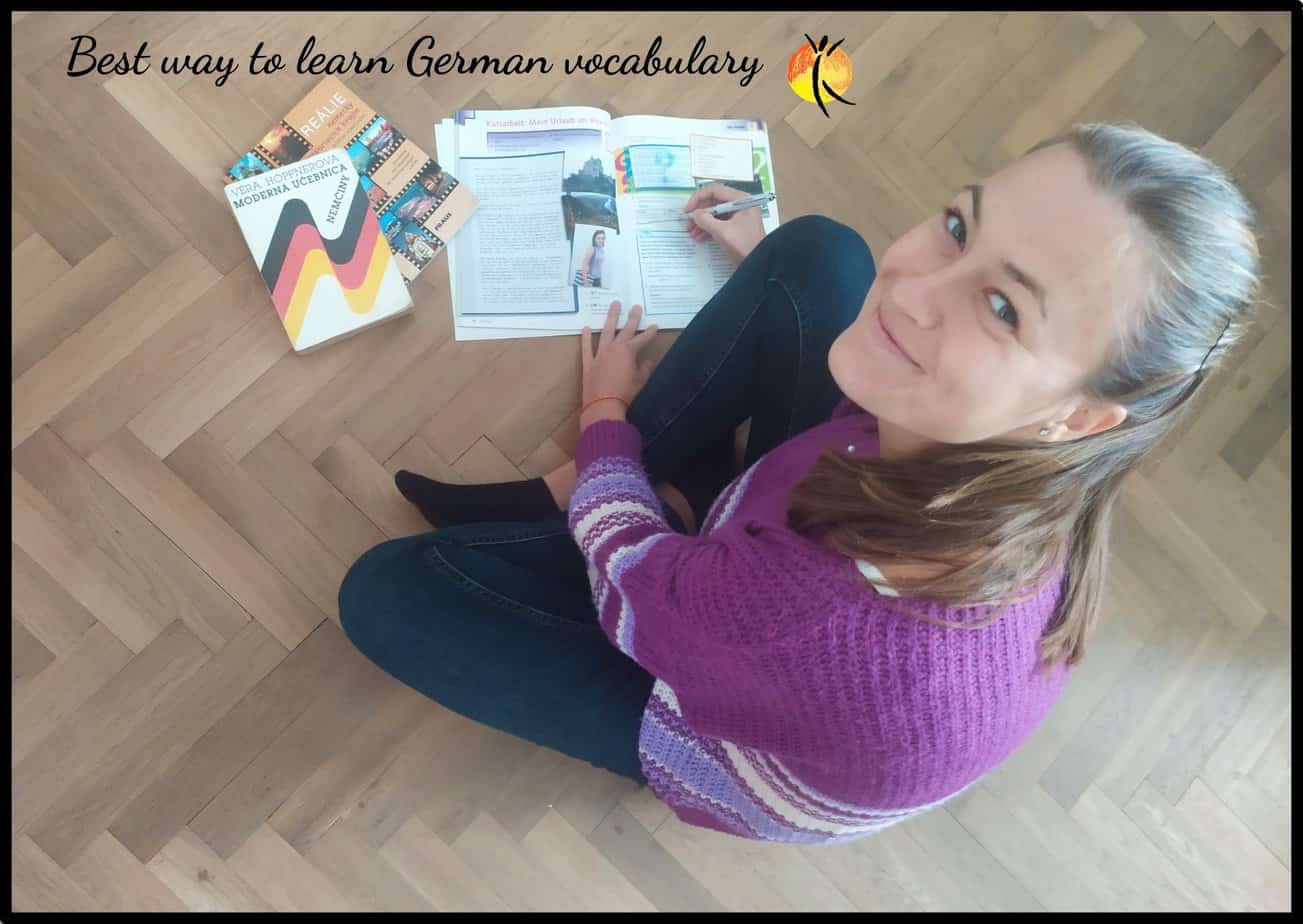
Best Way To Learn German Vocabulary: Ultimate Guide
This article about the best way to learn German vocabulary may contain affiliate/compensated links. For full information, please see my disclaimer here.
I’ve mentioned several times that German is the best language to learn to travel Europe (or be in Europe). It has several reasons. To name few, German is the official language of three European countries . In addition, you’ll meet Germans almost everywhere you travel. Also, if you plan to do business , it’ll open up great opportunities for you. So it’s a very useful language to learn.
This article will give you an insight into the best way to learn German vocabulary . It’ll be an essential part of your German language learning journey. So stay tuned!
The Best Way To Learn German Vocabulary
The best way to learn German vocabulary is to select specific topics/situations in which you want to speak the German language . For example, it can be a business talk, checking in to your hotel in the German language, booking a trip, or asking for directions on the street. After you pick specific words that you’ll need to speak in each situation. Finally, you’ll have to use effective strategies to learn the vocabulary , which I’ll explain in this article. So keep reading.

Overview Of The Best Way To Learn German Vocabulary
Now that you know the best way to learn German vocabulary, let’s discuss it more.
Here is a quick overview of the best way to learn German vocabulary:
- Select Topic-Specific Vocabulary
- Think Of All Words You Need In Each Situation
- Translate Vocabulary In Each Situation Into German
- Learn German Vocabulary Using My Effective Strategies
- Practice German Vocabulary On iTalki
1. Select Topic-Specific Vocabulary
First of all, you’ll have to select topic-specific vocabulary . Think about situations when you’ll need to speak the German language. For example, I teach my clients how to learn languages for travel . In this case, I would pick the following situations if I wanted to learn German for travel:
- Getting around an airport/airport signs/checking in to your flight
- Getting a taxi
- Checking into a hotel
- Asking for directions on the street
- Booking a sightseeing activity with a local operator
- Introducing yourself to new friends on the road
- Ordering drinks and food in a restaurant
There are a few situations in which you might have to speak German once you travel. So these situations will be your topics.
You can think about your topics based on the situations in which you want to speak German . It can be for business or communication with your foreign friends and family. Whatever it is, write these situations down in your language notebook .
2. Think Of All Words You’ll Need In Each Situation
Once you select your topics/situations, we’ll move on to the next step. Again, pick one topic/situation , and think about all words you’ll need to speak within that situation.
For example, I can pick a travel situation ‘Checking in to a hotel’. In this case, I would think about all words and vocabulary I’ll need to speak when checking in to my hotel. These words can be:
- I have a reservation for two nights
- My name is…
- Words on a hotel registration card
- Can I have late checkout?
- What time is breakfast?
- Can you organize a private shuttle for me?
I might use these words and sentences at the reception when checking into my hotel.
PRO TIP: I’d also think of words/sentences the receptionist might ask me. Write these words and sentences, too.
PRO TIP: You can brainstorm vocabulary for each topic in your native language. Write down all words and sentences that come to your mind for one situation. After, you’ll translate them into German.


3. Translate Vocabulary In Each Situation Into German
Once you have all your topic-specific vocabulary in your language notebook , it’s time to translate it. First, use Deepl translator to translate your words and sentences for each topic into German. Then, write these German words into your language notebook .
This is it. You’ve completed the process of topic-specific vocabulary. Then it’s time to learn German vocabulary.
4. Learn German Vocabulary Using My Effective Strategies
Congratulations. You now have all the necessary words that you’ll need to get to speak German. It’s time to learn this German vocabulary and have fun.
Go to my article about how to learn vocabulary fast . I’ve written 17 practical tips on how you can learn vocabulary effectively. Pick the ones you find the most interesting and start learning your German vocabulary .

4. Practice German Vocabulary On iTalki
Once you remember the German vocabulary in each situation you want to speak German, it’ll be time to practice speaking .
Many people learn vocabulary but can’t use it in the real world. I don’t want this to happen to you.
My strategy is to practice the German vocabulary and sentences you learn on your own on iTalki .
iTalki is an amazing language platform where you can find tutors to practice your foreign language. You can choose your tutor and have private conversations with him.
I suggest you find one tutor on iTalki . First, book a trial lesson (which is usually free of charge). During the trial lesson, tell him about your German learning strategy . Tell him that you’ve been learning German vocabulary in specific situations. Then pick one situation per lesson, and practice speaking with your tutor in this situation using the German vocabulary you learned on your own.
This is the best way to learn German vocabulary. First, you’ll put in your work, trying to remember German vocabulary . Then you’ll get to practice the vocabulary in each situation with a real German-speaking person. It’ll get you to fluency much faster . In addition, you’ll become a lot more confident in speaking .
I learn languages this way, and it works perfectly. So try it out!
If you want to try iTalki, you can register online for free . Then look for your tutor. If you like one, book a trial lesson. You’ll only pay for the lesson with your tutor after.
Learn German Vocabulary On ITalki
More Tips For Language Learning
This is the best way to learn German vocabulary. If you need more tips for German learning, check out my language blog . If you’re interested in the way I learn languages, read my article about how to learn a language for travel .
Go to my language resources to boost your German learning even more. You’ll find amazing language podcasts , foreign language books , language magazines , and even best German audiobooks for beginners .
Happy German Learning!
You Might Also Like
8 best spanish audiobooks for beginners + guide to learn spanish with them.

How To Watch TV Shows In Different Languages: Quick Access

Best Way To Learn French For Travel
Leave a reply cancel reply.
You must be logged in to post a comment.

Traveling to Germany? Learn These Must-Know German Words and Phrases

If you are planning a trip to Germany, you will want to learn some basic German phrases and useful travel phrases before you go.
This will make it easier for you to greet people, ask for directions and order food, among other vital day-to-day activities.
Of course, many people in Germany will speak some English, but you cannot take this for granted. Moreover, it is nice to show willingness and learn some German as a sign of respect.
Now, before we dive into this quick guide to German travel phrases and everyday German phrases let’s introduce the German language.

The German Language
German is spoken by 95 million native speakers, predominantly around Western Europe. It is an Indo-European language and belongs to the West Germanic group of the Germanic languages.
Learning German is relatively straightforward for people who speak English. You can expect to speak German at an intermediate level after around six months if you dedicate yourself to your studies.
You can learn basic German words from language-learning apps like Duolingo. Beyond that, you should engage with German music and German TV shows and movies .
Listening to native German speakers will help you to develop your listening comprehension and vocabulary.
This is a style of immersive learning that is very popular in the language-learning community. Check out Lingopie for their large catalogue of native German content hand-picked for language learners.
The Very Basics
Before we delve into specific German travel phrases, let's go over the very basics. These are common German phrases for everyday use.
Danke (schön)
Starting with one you may already know, we have " thank you (very much) ". You may already be familiar with the more common German phrases from movies and your previous travels. Danke schön is one of the most useful phrases you can learn, so write it down!
Sticking with the theme of manners, we have " please ". Even learning just "please" and "thank you" in German will take you a long way. People love to see that you have made the effort to be polite in their mother tongue.
Another must-know pair of words is " yes " and" no " respectively. Both are very useful words and should be memorized before you begin to learn German travel phrases.
German Greetings
Now, we can move on to greetings in the German language. These basic German words will endear the locals to you and help you to make friends in Germany.
Guten Morgen
Beginning chronologically, we have " good morning ". You can use "good morning" until midday to greet someone, just as you do when you speak English.
For a more general greeting, you can use guten Tag, meaning " good day ", between the morning and evening in Germany.
Guten Abend
In the evening, you will say guten Abend for " good evening ". You can use "good evening" until you are ready to turn in for the night.
Then, before going to bed, you will say " good night ". These phrases are used much in the same way as we use them in English.
Auf Wiedersehen
This is one of the German expressions many people know, thanks to the Sound of Music , but if you don't, Auf Wiedersehen means " goodbye ".
To introduce yourself, you can say " my name is... "
Wie heißen Sie?
And ask your new friend in Germany " what is your name? "
Ich komme aus…
To introduce your home country or city, say ich komme aus… , meaning "I come from..."
Wie geht's?
Now for some more conversational German expressions. Wie geht's? is " how are you? "
Mir geht's gut
To which you can reply " I am good ". Basic but easy for beginners.
Sprechen Sie Englisch?
This phrase means " do you speak English? "
It is written here in formal language which is customary when speaking to someone you do not know. But you can also ask sprichst du Englisch? if you are speaking to someone younger than you or someone you know well.
German Travel Phrases
Now, let's look at all the fundamentals in the German phrasebook relating to travel.
Entschuldigung
First, when traveling, it helps to know some basic German travel phrases regarding directions, important sites and emergency situations. All of these interactions will begin with Entschuldigung , meaning " excuse me ".
This very helpful German travel phrase means " where is...? " and can be followed by any place name or item for which you are looking. The difficulty is that you will need to learn which articles go with which nouns (and in which German cases !)
Here are some examples:
- Wo ist die Toilette? - where is the toilet?
- Wo ist das Stadtzentrum? - Where is the city center?
- Wo ist der Supermarkt? - Where is the supermarket?
Wo finde ich…
You can also say wo finde ich..., which means " where will I find... " For example:
- Wo finde ich die Touristeninformation? - Where will I find the tourist information?
- Wo finde ich den Bahnhof ? - Where will I find the train station?
- Wo finde ich den Flughafen - Where will I find the airport?
- Wo finde ich die Bushaltestelle? - Where will I find the bus stop?
Wann fährt der nächste Bus?/ Wann fährt die nächste Bahn?
At the bus stop, you might need help reading the schedule, in which case you can ask " when is the next bus? "
Likewise, at the train station, if you do not understand the announcements or signs, you can ask a passerby " when is the next train? "
Ich bleibe für...
When discussing your stay with the hotel staff or friendly locals in a pub, you might want to tell them how long you are staying in town. For this, you say ich bleibe für... , meaning " I'm staying for... "
- Eine Nacht - One night
- Zwei Nächte - Two nights
- Drei Nächte - Three nights
- Das Wochenende - The weekend
- Ein paar Tage - A few days
- Eine Woche - A week
Wie viel kostet das?
When speaking German in a store, it is handy to know the phrase " how much does this cost? " This is one of the German basics that will get you far in a German-speaking country. Of course, you will need to understand the German numbers spoken back to you.
Ich verstehe nicht
When you cannot comprehend what someone is saying to you, you can always say " I don't understand ". While this can be a frustrating feeling, it is worth remembering that you are on a learning journey and it is perfectly normal that sometimes you will not understand every word or situation perfectly.
Ich habe mich verlaufen
Just as you might struggle to comprehend all of the spoken German on your trip, you may also wander into unknown territory. If you find yourself unsure of your bearings, you can tell a stranger " I'm lost " and show them your hotel address so they can help.
Haben (as in ich habe, "I have") is one of the most common verbs in German so it is worth learning its conjugation and main uses.
Ich brauche einen Arzt
Of course, when you learn German travel phrases, the hope is that you will not need some of the phrases reserved for emergency situations. However, it is always worth knowing how to say " I need to see a doctor ", just in case.
German Restaurant Phrases
Whether or not you have breakfast included in your hotel room, you will undoubtedly end up in a restaurant during your trip, at which point these phrases will come in useful.
Kann ich bitte die Speisekarte haben?
Use this phrase to ask " can I please have the menu ?"
Was empfehlen Sie
If you are overwhelmed by the choice or not sure what it all means, simply ask the server " what do you recommend? "
Ich hätte gerne...
When you know what you want, say " I would like... "
- Ich hätte gerne die Bratwurst - I would like the sausage
- Ich hätte gerne die Kartoffelklösse - I would like the potato dumplings
- Ich hätte gerne den Apfelstrudel - I would like the apple strudel
Guten Appetit
Similar to the French bon appétit , guten Appetit means " enjoy your meal ". Those who speak English do not have an exact translation, but we all know the French meaning.
Die Rechnung, bitte
At the end of the meal, you can ask for " the bill, please " - or simply use the universal sign for the bill if you do not want to use so many words!
Kann ich mit Kreditkarte / Bargeld bezahlen?
Finally, establish your payment method by asking "can I pay with credit card?" or "can I pay with cash?"
FAQs relating to essential German phrases for travelers
Now, let's look at some frequently asked questions relating to German travel phrases.
What is the best way to learn German?
The easiest way to learn German is to use a variety of resources and study a little every day. You will learn German easily with the help of German TV shows and movies, music, online German courses and language-learning apps that focus on German grammar and vocabulary.
What is a popular German saying for native German speakers?
There are a few popular and common phrases for natives. You might hear a native German speaker say Daumen drücken!, meaning "fingers crossed!" or in Teufels Küche sein Wo finde ich den Bahnhof?, which is "to be in hot water" (literally "to be in the Devil's kitchen"). There are many funny words and phrases in the German language to explore as you learn.
Which countries speak German?
German is an official language in Austria, Belgium, Germany, Liechtenstein, Luxembourg and Switzerland. It is also spoken in parts of Italy and Poland. It is the most widely-spoken language in the European Union.

Summing Up: Must-Know German Words and Phrases
This has been a comprehensive guide to beginner German phrases for everyday life, introductions, travel and restaurants.
Now you are well-equipped with the language necessary for talking to taxi drivers, navigating souvenir shops and ordering food.
Traveling in a German-speaking country is much more fun when you know these things. Interesting things happen on vacation when you can talk with the locals!
So, start learning German today with Lingopie. This streaming site also offers high-quality content in 7 other languages.

Milena Andrade

Spanish for Travelers: How to Speak Like a Local

Avatar’s Invented Language: Exploring the Linguistic World of Na'vi
You might also like.

8 Reddit Pages To Follow If You Want To Learn German

8 Fun Language Games to Improve Your German Skills

10 German Intermediate Movies on Netflix

30 Common German Slang Words And Phrases To Learn In 2024
Get the secret guide to language learning with tv and music for free, browse posts by popular tags.
You are using an outdated browser. Please upgrade your browser or activate Google Chrome Frame to improve your experience.
The Best City to Learn German: 10 Great Places
Are you thinking of learning German in a German-speaking environment? Well, this is the post for you then.
In this post, I’ll tell you what you need to do and prepare in order to study in a German-speaking country, and I’ll go over the 10 great cities to choose from for your German learning adventure.
The Best Cities to Learn Authentic German In
1. berlin, germany, 2. munich, germany, 3. heidelberg, germany, 4. hannover, germany, 5. hamburg, germany, 6. vienna, austria, 7. salzburg, austria, 8. zurich, switzerland, 9. bolzano, italy, 10. blumenau, brazil, how to study german in germany, german language schools, volkshochschule, universities, and one more thing....
Download: This blog post is available as a convenient and portable PDF that you can take anywhere. Click here to get a copy. (Download)

A modern, multicultural city that’s a student’s dream
Advantages: Nightlife, theater and dance, Germany’s capital has it all in terms of culture.
Disadvantages: Most Berliners speak English, so they’ll often switch to it when they hear you struggling.
The first time I went to Berlin nearly 20 years ago, I vowed to one day live there, even if only for a few months. Flash forward to 2016, when I just completed 10 years of living in Berlin.
The only problem is that I live in Berlín, Costa Rica, a small coffee-farming community of a few hundred people on the top of a mountain in the Costa Rican Central Valley. So that didn’t quite go as planned, but my affinity for the other Berlin lives on to this day.
After the Berlin Wall came down in 1989, Berlin quickly became a bustling epicenter of all kinds of activity and change. In 2003, the mayor of Berlin somewhat famously described the city as “poor but sexy,” as the city was drawing many young people and outsiders looking for a different way of life.
That may have changed a bit lately, especially the “poor” part. Rents and costs have certainly gone up in the years since the Wall fell, but there are still parts of the city that are relatively cheap when compared to other parts of Germany, and especially when compared to other European or international cities.
Nevertheless, it’s still an incredibly lively place with countless indoor and outdoor activities, with technological jobs, fashionable stores, hot clubs and chilled-out cafes, all of which make it a student’s paradise. Even if you’re not a student, the city’s dizzying array of museums and countless cultural activities — many of them free —provide edification and entertainment for people of any age.
Personally, I was happily surprised by the huge and excellent Deutsches Technikmuseum (German Technology Museum), but my favorite museum is the DDR Museum , which lets you get a hands-on feeling of what things were like when Berlin was a divided city within a divided country.
If that piques your interest and makes you want to learn more about the history of divided Berlin, other great museums include the open-air East Side Gallery , which is a remaining section of the Berlin Wall, the Stasi Museum , which is all about East Germany’s secret police, and the Checkpoint Charlie Museum , which is located on the former border crossing point, and which highlights stories of people who tried to escape East Germany.
For other cultural activities, nothing beats the (free) view from the dome of the Reichstagsgebäude , Germany’s parliament building. Just be sure to make a reservation ahead of time. A five-minute walk from there is the famous Memorial to the Murdered Jews of Europe , a somber place for reflection, as well as the Tiergarten , a gigantic urban park.
If you’re more into traditional museums, Berlin has the Museuminsel (Museum Island), a UNESCO World Heritage Site that’s home to five famous museums, including the Pergamon Museum . Finally, if that’s too highbrow for you, you can always check out the Deutsches Currywurst Museum (German Curry Sausage Museum), which is dedicated to one of Germany’s favorite snacks!
Berlin has the Humboldt University and the Freie Universität , two of Germany’s best world-class universities .
Another one of the city’s major selling points is its diversity . Roughly 20% of people living in Berlin were both in another country . That number rises to nearly one in three people (article in German) if you include those with a “migration background,” which are those people who have at least one parent born in another country.
All of that means that it’s easier to find German language courses and, when you get tired of conjugating your verbs and cramming new German vocabulary into your brain, it’ll also likely be easier to find people with a similar background to yours if you feel like taking a break and reminiscing about things back home.

Everyone’s mental picture of Germany
Advantages: Beer gardens, beautiful parks, nearby mountains and great food.
Disadvantages: It’s very German, so if that beer-drinking culture isn’t for you, you may become tired of it.
Yes, I realize that the first two places on the list, including this one, are two places that most tourists hit up when going to Germany. But there’s a reason for that: Berlin and Munich are two iconic tourism destinations , but they’re also great for locals !
Munich offers a lot of the same selling points that you’ll find in Berlin, including multiple schools—including Berlitz and Goethe Institut —a full network of opportunities through the Volkshochschule , and all of the advantages of living in a modern, exciting, cosmopolitan city .
But whereas Berlin looks like a city from the future crash-landed on a city from the past, Munich looks like the physical manifestation of countless stereotypes about Germany.
Magnificent churches with the Alps just around the corner? Check. A glockenspiel in the middle of the city hall tower? Check. Sausages and sauerkraut? Check. Lederhosen and dirndls worn non-ironically? Check. Enough beer to drown a team of horses? You’d better believe that’s a check. All of these elements add up to one thing: Munich just feels German.
There are tons of possibilities to learn German while living the good life and experiencing German culture. If you’re into museums, the Deutsches Museum is one of the most famous in all of Germany.
If you like parks, the Englischer Garten has wide fields, a refreshing creek where sunbathers can cool off or even surf , a Chinese tower and multiple beer gardens.
If you’re a gearhead, Munich is home to BMW, whose BMW World is a must-see for car fans.
And for sports fans, you can visit the site of the Munich Olympics or the new(ish) Allianz Arena , home to the Bayern München soccer team.
Munich’s most famous “tourist attraction” is their beer. And about that beer: Munich’s roughly 100 beer gardens can bring a wistful tear to any beer lover’s eye, and you really must go to Oktoberfest if you’re in the country in September or October, even if you’re a teetotaler. It’s still lots of fun for all ages, which makes it high on many a “bucket list” throughout the world.
Munich’s location in Bavaria in southern Germany also gives it a leg up on other cities, since it’s so close to the Alps and several central and southern European countries. Plus, the weather in the south tends to be warmer and sunnier than in the dreary, rainy north!
As we’ve already seen, there are lots of places where you can learn German, but if you’re interested in learning something else while perfecting your German, Munich is home to the Technische Universität München (Technical University Munich, abbreviated TUM). The TUM has been ranked multiple times as the number one university in Germany , and its approximately 37,000 students can study any number of subjects.
And if that’s not enough for you, Munich also boasts another top 10 German university, the Ludwig Maximilian University Munich . That institute has over 50,000 students, and over 7,000 of them are international.
In terms of learning German, the one drawback of Munich may be the Bavarian dialect . There are some regional vocabulary words that you’ll have to pick up on, but it’s usually no big deal. For example, the biggest one I noticed immediately was that a small bread roll, normally called a Brötchen in the north, is called a Semmel in the south.
It’s normally not written, but people speak it everywhere. However, if a Münchner (a person from Munich) notices that you’re from the north of Germany or another country, they’ll often speak standard German so that you can communicate.

A smaller city with a long tradition of education
Advantages: Historic university town with a dose of castles.
Disadvantages: It’s a little small, so if you’re not a student, there’s not that much to do.
Here’s another German city with an excellent university. In fact, the Heidelberg University , also known as Ruprecht Karl University, is the oldest university in Germany, having been founded in 1386!
And like Berlin and Munich (and nearly any mid-sized or larger German city), Heidelberg also has classes through the Volkshochschule and other language schools like Berlitz or F+U , the latter of which can even include student housing.
Heidelberg is also a beautiful city in a great location. The ruins of Heidelberg Palace are a tourism and photography mainstay, giving visitors great views of the city. Just be sure to time your stay (or visit to the castle) to avoid tourists.
The city is just a short train ride away from many western and southern German cities like Cologne, Frankfurt and Stuttgart, and it’s also tantalizingly close to France, Luxembourg and Belgium. Sounds like you’d have quite a few options for a weekend getaway, right?
Perhaps the biggest advantage of Heidelberg is that it’s not a huge, cosmopolitan city. It does have a good student scene and there are many restaurants and bars for locals and the many tourists who visit the city. On the whole, it’s quite a bit more laid-back than the larger cities on this list.
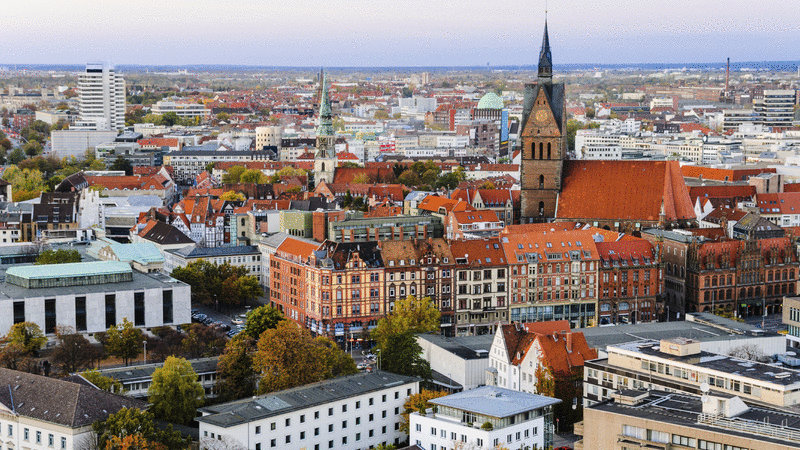
Yes, Hannover
Advantages: Easy pace of life and very nice people.
Disadvantages: Not the most exciting German city and lacking tourist hotspots.
First of all, let’s get this out of the way right now: This city’s name is spelled with 2 N’s in German. But you know what they say, right? Double the N’s, double the fun!
You often hear people say, “Such and such a place is really nice to visit, but I could never live there.” Well, Hannover is basically that same phrase, only inverted. It’s the proverbial “boring to visit, but great to live in” type of city.
Seriously, though, Hannover is nice, but it almost never shows up on anyone’s radar if they’re from outside of Germany.
I heard of Hannover for the first time when I learned that I’d be spending a year as an exchange student in a city about an hour outside of Hannover. I’m pretty sure my first thought was, “Wait, where?” which was then followed by a search for a map (we didn’t have the internet back then). But for whatever reason, hardly anyone goes to Hannover for tourism , and that’s a shame.
However, that shame can work to your advantage, since this undiscovered gem is possibly the ideal place to learn German. And I mean that linguistically.
Whether it’s true or not, Hannover is well-known among German speakers and learners for having das reinste Deutsch (the purest/cleanest German). To immediately clarify that, they mean that the German spoken in Hannover is as close as you’ll get to the “standard” German you’ll hear on the listening tracks from textbooks.
Hannover has a lot of other cool things, too. Like the other cities, there are several language schools like Berlitz and ISK , and Hannover also has a Volkshochschule system. Hannover’s Leibnitz University is also very well-regarded if you’re looking for a university education.
The city also boasts lifestyle perks that you might not find in larger or smaller cities. Its position right in the middle of Germany, both in terms of population size and geography, makes Hannover a place that has plenty of things to do and see, but which also makes it really easy to relax or escape from the city for a weekend.
If you do stay in town, the Neues Rathaus (“new city hall,” which is actually over 100 years old) is a good starting point for a scenic day. You can ride in a unique curved elevator to the top of the town hall’s cupola, which will give you a scenic outlook on the entire city.
You can’t miss the Maschsee , a giant urban lake right around the corner from the town hall. People go there all year round to hang out, exercise, drink beer, eat ice cream and just enjoy the great outdoors. They especially go there during the Maschsee Lake Festival , a multi-week outdoor party held every August.

Cosmopolitan port city with a unique way of saying “hello”
Advantages: Lots going on and a vibrant lifestyle.
Disadvantages: Hamburgers can be insular and a bit snobby.
Studying German in Hamburg offers a vibrant and immersive language learning experience amidst the rich cultural tapestry of this dynamic city .
The cosmopolitan atmosphere of Hamburg , Germany’s second-largest city, provides an ideal backdrop for language learners, fostering daily opportunities to practice and enhance language skills.
The city’s renowned language schools and universities offer comprehensive courses taught by experienced instructors, combining traditional classroom learning with practical, real-world applications. Students benefit not only from the academic rigor but also from the chance to engage with locals in their native language.
Hamburg’s diverse neighborhoods, historic landmarks and cultural events offer an exciting playground for linguistic exploration. From conversing with locals at bustling markets to navigating the city’s extensive public transportation system, studying German in Hamburg provides a holistic language immersion experience that extends beyond the classroom, making language acquisition an integral part of everyday life.

Advantages: Gorgeous and historic, the city has culture oozing out of it.
Disadvantages: Can be a bit cold in terms of the people.
Near the eastern edge of the country is its capital city, Vienna ( Wien in German), whose current tourism slogan is “Vienna – Now or Never.” Despite having a motto that sounds more like an ultimatum, Vienna is a great place to visit. It’s smaller than most big German cities, yet it still maintains a feeling of sophisticated cosmopolitanism .
It’s also an excellent jumping-off point to several Eastern European countries.
As you’d expect from a city of its importance, Vienna has a major university, Universität Wien (Vienna University). It also has several language schools, including the Goethe Institut and Berlitz . Austria has its own system of Volkshochschule s , but just note that it’s quite a bit smaller than Germany’s system.
Advantages: A beautiful city in a gorgeous natural setting.
Disadvantages: Too many tourists and not that much going on for locals.
At the other edge of the country, right near the border with Germany, is picturesque Salzburg . The city really is a thing of beauty, and because of that, many tourists and international students go there to study or to learn German.
You can also visit Mozart’s home and then go to a cafe nearby to eat some Mozartkugeln (“Mozart Balls”), which are delicious chocolate rum balls named after him. But just beware: If you have any kind of “Sound of Music” -related PTSD, this place isn’t for you.
Every year, tons and tons of tourists flock to Salzburg to go on tours and pay homage to this classic Julie Andrews movie. The mere fact that there are multiple companies running “Sound of Music” tours should tell you how big of a deal this movie is in Salzburg.

Muesli-flavored mountain weirdness with a side of business
Advantages: The Alps, great food, nice people.
Disadvantages: Only 63% of Swiss people speak German and it’s an usual dialect of German. It’s also expensive and can be quite uptight.
The entire country is a bit quirky , but that’s usually good for most people. You may need to walk the less-traveled path to study there, but if you do a bit of extra research about what you need to do or have to study in the country , you should be okay.
The Swiss education system has many similarities to the German system, but it’s much smaller and there are some differences. There may be fewer possibilities for study programs, so be sure to research the options well. Since Switzerland isn’t part of the EU, there may be different requirements for arriving and residing there than you’d find in Germany or Austria.
Switzerland can be almost comically expensive , but there are some exceptions and ways to save a bit of money . Unless you’ve got a lot of money saved away for a rainy study day, it might be best to consider a shorter language program in the country.
You’ll also want to keep in mind that Swiss German is notoriously different from other German dialects, and some people (jokingly, mostly) say it’s another language. If people hear you speaking standard German, they’ll likely respond in kind… unless they’re French speakers!
In Zurich, you’ll find the University of Zurich , one of the most prestigious universities in Europe, which also has a lot of possibilities for international students wishing to study there. There are also some language schools like Berlitz and, like the other German-speaking countries, Switzerland has its own Volkshochschule system, including a branch in Zurich.
If you do decide to go to Switzerland, it’s a great place to live. Zurich is consistently ranked high on lists of the most livable cities in the world.

Alpine wonderland that’s half Italian, half German
Advantages: There’s nearby hiking, skiing and beauty everywhere. Plus Italian food.
Disadvantages: 75% of the population speaks Italian, so you’ll have less chances to use your German.
Studying Italian in Bolzano offers a unique and enchanting linguistic journey set against the picturesque backdrop of the Italian Alps . Bolzano, nestled in the heart of the South Tyrol region , provides a distinctive blend of Italian and German cultures, offering students an opportunity to immerse themselves in a bilingual environment where around 25% use German for everyday life.
The city boasts reputable language institutions that deliver comprehensive courses, allowing students to not only grasp the intricacies of German grammar and vocabulary but also to practice their newfound skills in daily life.
Bolzano’s charming streets, historic architecture and welcoming local community create an ideal setting for language learners to absorb the language within an authentic Italian context. Whether conversing with locals at bustling markets , savoring traditional South Tyrolean cuisine in local eateries or exploring the surrounding natural beauty, studying German in Bolzano is a captivating and enriching experience that goes beyond the confines of traditional classrooms.

Just don’t mention the 2014 World Cup
Advantages: It’s warm, vibrant and life is good.
Disadvantages: It’s an isolated German community with relatively few speakers.
I’ll admit that this last option may seem a bit out of left field, but hear me out. It really is about 80% serious.
You may be surprised by the history of German heritage and influence in many parts of Brazil, especially in the south. For example, there are five Goethe Institut branches in Brazil.
If you want a full-on German-Brazilian experience, you should check out Blumenau , a city in the southern Brazilian state of Santa Catarina. That city has many people of German origin, and that’s reflected in a lot of the city’s architecture, which looks like it was lifted straight out of Germany.
Perhaps the most tempting reason to go to Blumenau is its annual Oktoberfest , which draws over a million visitors. And there’s one other great aspect about learning German in Brazil—you won’t have to deal with German weather !
FluentU is one of the best websites and apps for learning German the way native speakers really use it. FluentU takes real-world videos—like music videos, movie trailers, news and inspiring talks—and turns them into personalized language learning lessons .
Watch authentic media to simultaneously immerse yourself in the German language and build an understanding of the German culture.
By using real-life videos, the content is kept fresh and current. Topics cover a lot of ground as you can see here:

Vocabulary and phrases are learned with the help of interactive subtitles and full transcripts .

Hovering over or tapping on any word in the subtitles will automatically pause the video and instantly display its meaning. Interesting words you don’t know yet can be added to a to-learn list for later.

For every lesson, a list of vocabulary is provided for easy reference and bolstered with plenty of examples of how each word is used in a sentence.
Your existing knowledge is tested with the help of adaptive quizzes in which words are learned in context.

To keep things fresh, FluentU keeps track of the words you’re learning and recommends further lessons and videos based on what you've already studied.
This way, you have a truly personalized learning experience.
Start using the FluentU website on your computer or tablet or, better yet, download the FluentU app from the iTunes or Google Play store. Click here to take advantage of our current sale! (Expires at the end of this month.)
Depending on your age and background, there are three to four main options:
1. Taking classes at a German language school
2. Taking classes at a Volkshochschule (a continuing education school)
3. Enrolling in a university
Those are the three “formal” ways, but a fourth option is to basically just “wing it” and learn German by traveling , working or meeting German people.
Now matter where you travel, a Lonely Planet German phrasebook or travel guide can help you prepare fully. Read these ahead of time to know what to expect wherever you go. Read them during your travels and keep them in your backpack to whip out at a moment’s notice. Whenever there’s German around you, you can pick up the language.
If you want to take a German course in Germany, there are reliable standbys like the Goethe Institut or Berlitz , both of which have several options and locations to choose from in Germany and throughout the world.
There are also many other schools that are less well known, such as Deutsch Akademie , but these are also well worth considering.
The DAAD (The German Academic Exchange Service) is an excellent resource for anyone who wants to go to Germany specifically, and they have a searchable list of over 350 such language programs. I’ll include links to a few well-known schools in the sections below, but you can also search for other options if the schools aren’t in the city you’re considering or if they don’t seem like a good fit for you.
The advantage of studying with language schools is that you’ll learn quickly. They force you to be in a classroom and study a lot, and they cover a lot of material in a short amount of time. Their curricula vary, but most language schools have intensive options that meet for three or four hours every day. Courses often run for a month or two, with chances to progress to higher levels.
The disadvantage is that they’re often more expensive than other options, and the schedules don’t always work for everyone, especially people who have a limited amount of time in the country and who want more time off to explore or travel.
Another good option that some language schools offer are integration courses , which include both language and culture, and which are aimed at people who are looking to settle in the country for a long time. If that’s you, then the Federal Office for Migration and Refugees in Germany can give you some good information about these courses and also point you in the right direction to find one that works for you.
Another excellent option are the courses from the Volkshochschule (VHS) which, despite its name—it translates literally to “people’s high school”—is more like a series of community colleges for continuing adult education .
The VHS has a ton of locations with many course options including German courses for all levels, integration courses and German courses specifically for refugees. The courses are definitely geared more towards people who will be living and even settling in the country for a long time. But if that’s you, then definitely check out this option.
Search all of their locations here by the topic you’d like to study.
The advantage of the VHS is that they have locations all over the place, including in almost every decent-sized city in Germany. Also, the classes at the VHS are often cheaper than more commercially-driven options. Some classes here are even free, and most have financial aid possibilities.
As an added bonus, the VHS website also has a free, online German learning program that anyone can participate in. It’s all in German, but that will help you start with language immersion right away!
The disadvantage is that it can be a bit more complicated to navigate the VHS system if your German level is low. For example, the site is nearly all in German.
If you already speak pretty good German, why not practice by learning a new skill?
For example, if you live in Berlin, you can check out this cooking class or learn about many other topics like computer programming or religion . Those are just a few ideas, but there are many other classes at the VHS on a wide variety of subjects , almost all of which are taught in German.
This way, you can get the experience of a university-style class at any age, without having to complete a full university degree program. It’s basically like the secondary education equivalent of one of those hop on-hop off tour buses you constantly see going around Berlin!
This option is definitely not for everyone, but if you’ve got a year (or seven) on your hands and want to really, really learn German, this may well be the best way to do so.
Germany has some of the top universities in the world , and each German city on our list below is home to at least one of the best German universities.
Studying at a university is inherently more complicated than it would be to take a single course at a smaller institution. However, the DAAD can also help you find university study and scholarship opportunities, and it’s a great resource to help you navigate and understand the German higher education system.
In addition, many universities now offer classes or entire degree programs that are taught in English. Obviously, that’s not really going to help you learn German, but if you were hesitant about enrolling in a degree program in German, doing a program in English could be another option, and you could learn German along the way.
German university students are definitely lucky, especially compared to students in other countries. There’s a lot of institutional support in general for students, and that accounts for very low (or free) student fees.
For example, studying in Germany for a year might cost around just $250 in tuition, which is literally 100 times less than many universities in the United States ! That fact alone has already led many foreign students to enroll in German universities .
And if you’re a student, there are perks built into the system to help and support you, including stipends and financial aid, free or discounted transportation and all kinds of other discounts.
No matter how or where you want to learn German, there are many different options available to you.
Even if you decide that the best option is to stay at home and learn while sitting on your couch, there’s a good path for your unique needs and goals.
Whatever you decide, I wish you good luck!
Want to know the key to learning German effectively?
It's using the right content and tools, like FluentU has to offer ! Browse hundreds of videos, take endless quizzes and master the German language faster than you've ever imagine!
Watching a fun video, but having trouble understanding it? FluentU brings native videos within reach with interactive subtitles.

You can tap on any word to look it up instantly. Every definition has examples that have been written to help you understand how the word is used. If you see an interesting word you don't know, you can add it to a vocabulary list.

And FluentU isn't just for watching videos. It's a complete platform for learning. It's designed to effectively teach you all the vocabulary from any video. Swipe left or right to see more examples of the word you're on.
The best part is that FluentU keeps track of the vocabulary that you're learning, and gives you extra practice with difficult words. It'll even remind you when it’s time to review what you’ve learned.
Enter your e-mail address to get your free PDF!
We hate SPAM and promise to keep your email address safe


- ARRANGE A CALL BACK

YES Germany
German Education Consultant in India
Best Way to Learn German Language for Beginners

Learning a new language can be a thrilling and rewarding experience, opening doors to a world of culture, communication, and personal growth. If you’ve decided to learn the German language, you’re in the right place. Welcome to the “ Complete Guidance of German Languages for Beginners ,” a comprehensive Learn German Language course designed by YES Germany’s YES School of Languages that equips you with the language fundamentals and more.
In today’s interconnected world, knowing German can be a valuable asset, offering opportunities for travel, work, and friendship with millions of German speakers around the globe. Whether you’re in Bangalore seeking German language classes in Bangalore or anywhere else in the world, the online German classes offered by YES School of Languages is here to guide you on your language journey. Choose YES School of Languages for your German language learning needs and embark on a rewarding journey to master this beautiful language.
For beginners, our course is tailored to make the process enjoyable and accessible. We’ll start with the German language basics, introducing you to essential vocabulary, grammar, and pronunciation. As you progress, you’ll gain confidence in your ability to communicate effectively in German. Our team of experienced instructors is committed to providing top-notch German language training in Bangalore and beyond. They understand the unique challenges beginners face and are dedicated to helping you overcome them. Through interactive lessons, engaging activities, and real-life examples, you’ll quickly build a strong foundation in the language.

Why Choose YES Germany for German Language Learning - Online and Offline
YES Germany stands out as a premier choice for learning the German language, whether you prefer online or offline learning. Here are the compelling reasons to choose YES Germany for your German language journey:
Versatile Learning Options
YES Germany offers both online and offline learning modes to cater to your preferences and convenience. You have the flexibility to choose the format that best suits your schedule and learning style.
Comprehensive Curriculum
Our Learn German Language Course provides a comprehensive curriculum that covers the essential German language basics and caters to learners at all levels. Whether you’re a beginner or looking to advance your language skills, we have you covered.
Local Presence in Bangalore
For those residing in Bangalore, YES Germany offers German Language Classes in Bangalore, providing you with an immersive language learning experience. Interact with fellow learners and practice your language skills in real-life settings.
Career Advancement Opportunities
Enrolling in our course, particularly the German Language Training in Bangalore , opens doors to global career opportunities. Germany’s economic strength and technological advancements make language proficiency a valuable asset in industries like engineering and international business.
Support for Beginners
We understand that starting a new language can be challenging, which is why YES Germany is dedicated to offering a supportive environment for beginners. Our expert instructors will guide you through the initial steps of your language-learning journey.
Flexible Learning
The inclusion of online German classes ensures flexibility in your learning, allowing you to adapt your language education to your busy lifestyle. This means that, regardless of your location, you can benefit from our high-quality courses.
Scope of Learning the German Language Course
The Learn German Language Course provides a diverse range of opportunities for individuals seeking to master in German language .
Comprehensive Learning for All Levels
Our courses cater to learners of all levels, from beginners to advanced speakers. For beginners, we provide a strong foundation in German language basics to ensure a comfortable start to your language learning journey.
For those based in Bangalore, our German Language Classes in Bangalore offer a local, immersive experience that allows you to connect with fellow learners and practice your language skills in real-life situations.
Career Advancement and Global Opportunities
Learning German can significantly enhance your career prospects. German Language Training in Bangalore ensures that professionals are well-prepared to excel in global business environments, making them more marketable.
Supportive Learning for Beginners
We understand that starting a new language can be intimidating. For beginners, this course is an excellent entry point into the world of the German language.
Flexibility with Online Classes
With online German classes as part of the course, you have the flexibility to tailor your learning to your busy schedule. This allows learners from various locations to benefit from our comprehensive program.
Benefits of Online German Language Learning:
- Enjoy Flexibility and Convenience: Online learning allows you to create your study schedule, giving you the flexibility to balance language learning with other commitments.
- Access to Native German Speakers and Language Resources: Online courses often connect you with native German speakers and provide access to a wealth of language resources, enhancing your listening and speaking skills.
- Comprehensive Course Materials and Structured Learning: Online programs provide a structured curriculum covering all language modules, offering materials for reading and writing alongside interactive lessons for listening and speaking practice.
- Interactive Learning Experience: Virtual classes use technology to create an interactive learning experience, including live sessions, discussion forums, and multimedia resources to engage learners and improve their language proficiency.
- Personalized Learning and Individual Attention: Online instructors can provide personalized feedback and attention to individual learners, allowing you to target specific areas of improvement.
Benefits of Offline German Language Learning:
- Local Immersion: Offline learning, such as YES Germany’s German Language Classes in Bangalore, immerses you in a local environment, facilitating real-world application of your language skills, particularly in listening and speaking.
- In-Person Interaction: Face-to-face classes foster direct interactions with instructors and peers, enhancing your listening and speaking skills through conversation, personal feedback, and group discussions.
- Structured Learning: Offline courses offer structured lessons to build a strong foundation in reading and writing, ensuring comprehensive coverage of language modules.
- Cultural Integration: Learning in an offline environment allows for cultural integration and practical application of reading and writing skills when interacting with native speakers.
The German language is classified into various proficiency levels, ranging from basic to advanced, as defined by the Common European Framework of Reference for Languages (CEFR). These levels are crucial for assessing and understanding one’s language skills. Here are the different types of German language levels:
- A1 Level: At this beginner level, learners grasp the fundamental aspects of the language, such as basic greetings, introductions, and simple everyday conversations. A1 is the starting point for anyone looking to embark on their German language journey.
- A2 Level: The A2 level builds upon A1, enhancing vocabulary and grammar skills. Learners at this stage can express themselves more fluently, discuss daily activities, and engage in basic written communication.
- B1 Level: This level represents an intermediate stage where learners delve deeper into German. They can engage in more complex conversations, understand written texts, and express opinions on various topics. It’s often seen as a key milestone for those considering living or working in a German-speaking environment.
- B2 Level: At the upper intermediate level, learners can engage in discussions on a wide range of subjects, including more formal and academic topics. They can understand complex texts and express themselves both in writing and speaking with a higher degree of fluency.
- C1 Level: This advanced stage signifies near-native proficiency. Learners at C1 can communicate effectively, both verbally and in writing, and understand intricate texts and discussions. It’s a crucial level for academic or professional purposes and signifies a high degree of language competence.
Each of these levels represents a stepping stone in the journey of mastering the German language, providing individuals with the tools to communicate, connect, and achieve their language goals at different stages of their learning process. Mastering the German language is a key to unlocking the door to higher education in Germany . As a prospective student, learning the German language is invaluable for several reasons:
- Language Requirement: Many academic programs in Germany require proficiency in German. Passing language exams, such as the TestDaF or DSH, is often a prerequisite for admission.
- Access to Quality Education: Germany is renowned for its world-class universities and technical institutions. Learning German ensures you can fully engage with lectures, coursework, and academic life.
- Scholarship Opportunities: Proficiency in German makes you eligible for various scholarships and grants, further reducing the financial burden of your education.
- Integration and Cultural Experience: Learning the language provides deeper immersion into German culture and daily life, making your stay in Germany more enriching.
- Employment Prospects: After completing your studies, proficiency in German significantly enhances your employability in Germany, a country known for its strong job market.
In conclusion, embarking on the journey of mastering the German language through the Learn German Language Course offers a structured approach to language acquisition. Whether you choose the convenience of online German classes or the immersive experience of German language classes in Bangalore, you will find that each level, from German language basics at A1 to advanced proficiency at C1, equips you with the skills in reading, writing, listening, and speaking that are essential not only for academic success but also for cultural integration and professional growth. So, whether you’re a beginner or an experienced learner, the German language journey is a transformative experience that opens doors to a wealth of opportunities in language, education, and career prospects.

Get Personalized Counselling
Yes germany education pvt. ltd..
As the days pass by Germany is increasingly becoming the go-to dream destination for students aspiring to pursue their higher education abroad.

Chat with us
ENQUIRE NOW

The Only Germany Travel Guide You’ll Ever Need
Last Updated: January 5, 2024
*FYI - this post may contain affiliate links, which means we earn a commission at no extra cost to you if you purchase from them. Also, as an Amazon Associate I earn from qualifying purchases. Check out our Privacy Policy and Disclosure. for more info.

While most commonly associated with beers, bratwursts and tight leather pants, Germany is a country full of delightful finds that extend far beyond the stereotypes.
From dreamy castles and fairytale towns to awe-inspiring nature and sprawling cities, Deutschland has a little something for every kind of traveler… although I’ll admit the leather pants are also great.
I first visited Germany on a 6 week backpacking trip across Europe, and as I sipped my comically large beer under the toasty Berlin sun, I felt a strange sense of calm and belonging.
Spurred by this hunch, I moved to Munich. One study abroad, and 5 years later, I’m still here, with so much giddy enthusiasm for this country that I’ve become a thoroughly insufferable dinner guest.
But my social life’s loss is your gain, my friend… because today, I’ve decided to channel all my Deutschland fangirl tendencies into this concise Germany travel guide filled with all my top tips, itineraries, and recommendations.

Save this Germany travel guide for later!
I promise it’ll come in handy!
I hope you find it helpful, and of course, feel free to ask any more questions in the comments section or on Instagram here.
Traveling to Germany Basics
Currency: Euro
Language: German, although accents and dialects vary wildly! In larger cities and tourist hotspots, most Germans also speak excellent English.
Getting Around: Trains, buses and flights are plentiful and affordable in Germany – my best tip is to use Omio to compare options easily. Having a car is ideal for visiting smaller towns, more remote locations and numerous destinations in a short amount of time, but is otherwise not needed for big cities.
Germany Highlights (By the Season)
- Winter: Christmas markets, skiing & alpine sports, Karneval and Fasching season (Carnival), Starkbier (Strong beer) season
- Spring: Cherry blossoms in Bonn , Frühlingsfest (Springfest) in Munich
- Summer: Hiking, Beer Garden season, summer festivals/celebrations
- Fall: Oktoberfest and other Volksfests, the world’s biggest pumpkin festival in Ludwigsburg, the Wurstmarkt (world’s largest wine festival)
My Favourite Places in Germany
Let’s get my mega-biased opinion out of the way first – Munich is the city I now call home, and I couldn’t recommend it more… especially if you’re obsessed with beer like I am. This is the birthplace of Oktoberfest after all!
There are lots of fun things to do in Munich , like hopping around the city’s sprawling museum district (many only cost 1 euro on Sundays!), eating up the best Bavarian food that Munich has to offer or soaking in the wealth of historical sites scatered around the city.
It’s also an ideal base for many epic day trips. Going from Munich to Neuschwanstein Castle (AKA the real life Sleeping Beauty castle) takes only 2.5 hours. Or, if you want to visit glorious Salzburg from Munich (AKA the birthplace of Mozart and setting of Sound of Music), that’s only 1 hour by train.
Why visit Munich when you travel Germany:
- Amazing beer & beer festivals
- The English Garden – one of the largest city parks in the world
- Beautiful palaces and museums
- Easy base for amazing day trips to the Alps

Berchtesgaden National Park
If it’s natural beauty you’re after, Germany’s Berchtesgaden National Park (near the border to Austria) is a must-visit.
Everything here is breathtaking – from the shimmering turquoise lakes and snow-flecked mountains to the adorable Berchtesgaden town center.
And, if you’re up for it, this is the ideal place to enjoy a typically Bavarian wellness weekend.
Why visit Berchtesgaden National Park when you travel Germany:
- Stunning hikes and scenery
- The glorious boat ride on Königssee to see the equally stunning Obersee
- Historic sights like Hitler’s Eagle’s Nest

Hands down one of my favourite places to visit time and time again is Berlin.
This endlessly fascinating city is home to incredible museums, delicious food, and a unique culture that makes it distinct from the rest of the country, despite its status as capital!
Whether you’re a history nerd, an avid partyer, or a famished foodie, Berlin has plenty to offer.
Why visit Berlin when you travel Germany:
- Fascinating history
- World-class museums and attractions
- A thriving nightlife and food scene

Franconia is a glorious region in northern Bavaria that is divided into Lower, Middle, and Upper Franconia.
To me, it’s one of the most underrated regions in Germany for international visitors, with an abundance of fairytale half-timbered houses, amazing beer, and unique natural landscapes.
Here are some places in Franconia that are absolutely worth visiting:
- Franconian Switzerland
- Würzburg (still haven’t been yet!)

Perhaps the most idyllic entry of this list is Monschau, a sleepy but gorgeous village found near the border to Belgium.
I was lucky enough to come here for Christmas markets a few years ago, and I loved it so much, I skipped the train I’d pre-booked just so I could spend a few more hours there.
Picturesque half-timbered houses clustered around a roaring central river… oh, and a castle on a hill. Because of course they have one.
Why visit Monschau when you travel Germany:
- Super friendly locals
- Picture-perfect scenes at every turn
- Christina might cry if you don’t

Hamburg is an amazing city I’ve had the chance to visit a few times now. It’s a lifestyle city that reminds me a lot of my hometown, Vancouver.
Home to a mix of classic and modern architecture (including the coolest opera house in the world!), as well as Germany’s #1 attraction – the adorable Miniatur Wonderland, Hamburg has a lot to offer tourists, but perhaps the best way to enjoy it is with a nice beer and sunset along the Elbe.
Why visit Hamburg when you travel Germany :
- Amazing architecture like the Elbphilharmonie
- Fresh and tasty seafood (and a booming foodie scene!)
- A fun, vibrant vibe

Dresden is one of the most beautiful cities in Germany, and its beauty is all the more astounding when we consider that much of the city was destroyed completely in WWII.
After decades of reconstruction however, Dresden once again shines with its former glory, establishing itself as one of the most important cultural hotspots in Germany.
… and all only a stone’s throw from Saxon Switzerland, one of the most beautiful natural wonders in the country!
Why visit Dresden when you travel Germany :
- Stunning architecture and sights
- World-class museums and culture scene
- Its jawdropping Christmas market (the oldest one in the country!)

Stuttgart (and its Surrounding Area)
Stuttgart is the biggest city (and capital) of the German state Baden-Württemburg.
It’s perhaps best known as the ‘cradle of the automobile industry’, which explains why it’s home to not just one, but two car-centric museums: one belonging to Mercedes-Benz, and one to Porsche.
Besides cars though, the area around Stuttgart offers up some of the cutest small towns you can find in Germany, all easily reachable by public transport, meaning you get the best of all worlds during a visit here.
Why visit Stuttgart and the surrounding area when you travel Germany:
- Fairytale towns like Esslingen, Ludwigsburg, and Tübingen
- Stuttgart’s Stadtbibliothek, one of the most unique and beautiful libraries in the world
- Lots of fun events like Stuttgart’s Christmas Market and the Cannstatter Volksfest

Thuringia is a state often overlooked by international tourists, but if you’re looking for a truly charming German escape, its capital Erfurt makes an excellent choice.
This beautiful city is famed for its unique Krämerbrücke, which is a gorgeous medieval bridge lined with residential buildings.
But that’s not all – there’s also an impressive cathedral, an imposing fortress, and surprises waiting on every corner… quite literally, because Erfurt is the HQ of the German children’s channel KiKA, and there’s plenty of fun statues of famous characters scattered around town.
Why visit Erfurt when you travel Germany:
- Krämerbrücke, the longest inhabited bridge in Europe
- Quirky and fun children’s channel sculptures all over the city
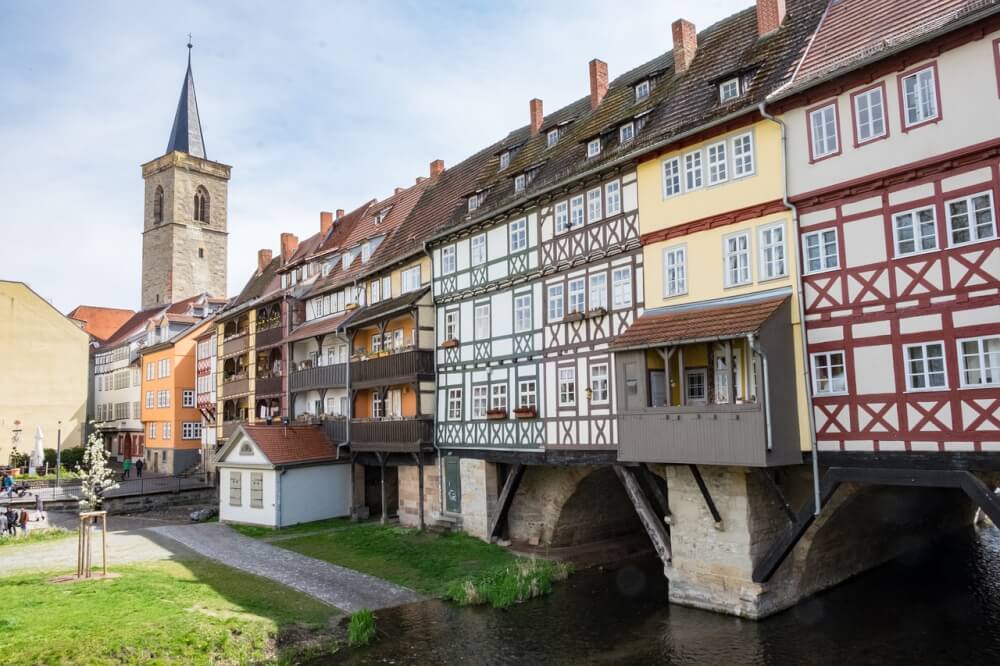
Cologne, to me, is a city synonymous with fun and celebration. While at first glance, it might not rank among the “prettiest” places to visit in Germany (much of it was destroyed in the war), it still boasts several impressive landmarks and sights, like the epic Cologne Cathedral.
Where Cologne really shines though is during special events – the Christmas markets here are some of the best I’ve been to in my entire life, and the Karneval celebrations… well, those are truly epic!
Why visit Cologne when you travel Germany:
- Bucket list events like the Cologne Christmas Market and Kölner Karneval
- The iconic Kölner Dom (Cologne Cathedral), one of the most famous churches in the world
- Fun-loving locals who are among the friendliest I’ve ever encountered in Germany

Last but not least, we have Hannover, a city which (in my opinion) is one of the most underrated cities in Germany where tourism is concerned.
Locally, people often joke that Hannover is one of the most boring cities in Germany, but I don’t think that’s true at all. One quick look and you’ll find a stunning palace within the city, an architecturally impressive Town Hall (with a unique elevator offering epic views), and a cool laidback vibe that many compare to what Berlin was like decades ago.
Here are some awesome things to do in Hannover.
Why visit Hannover when you travel Germany:
- Its gorgeous New Town Hall
- The stunning Herrenhausen Palace and its gardens
- A fun, laidback city vibe

Bucket List Experiences in Germany
Germany is full of incredible bucket list experiences. Here are a few of my favourites:
Christmas Markets
German Christmas markets are the stuff of bucket list dreams.
If you adore Christmas, a German Xmas market trip needs to make it on your bucket list, because nobody captures Christmas coziness and joy quite like the Germans do.
The best part (besides the droolworthy assortment of German Christmas Market foods ) is that you’ll find Christmas markets in just about every city, town, and even the smallest of villages, each with their own unique take on traditions.
Trust me, you could never get bored of visiting these.
Here are some full guides to the Christmas markets I’ve visited in Germany:
- Munich’s Christmas Markets
- Berlin’s Christmas Markets
- Cologne’s Christmas Markets
- Esslingen Christmas Market
- Ludwigsburg Christmas Market
- Karlsruhe Christmas Market
- Düsseldorf Christmas Market
- Nuremberg Christmas Market
- Essen Christmas Market

Oktoberfest
Trust me – Oktoberfest , AKA the world’s largest beer festival, is reason enough to make a trip to Germany.
Typically celebrated annually in Munich, this is one of the most incredible events in the world, with millions of people attending, millions of beer served, and a guaranteed recipe for making memories to last a lifetime.
… If you can remember anything after 5L of beer that is.
Read my full Oktoberfest guide for more details.

Visiting Fairytale Castles
If you love castles, I recommend avoiding Germany……. because you might just combust from sheer fangirl joy.
Seriously, Germany is every castle lover’s kryptonite, with elegant palaces and fairytale castles in the thousands. If you’re a Disney gal like me who grew up dreaming of happily ever afters, pack a ballgown and head to Germany ASAP.
I promise you won’t be disappointed.
Here are some castles that you must visit in Germany:
- Neuschwanstein Castle
- Nuremberg Castle

The Cherry Blossoms in Bonn
The cherry blossoms in Bonn (also the birthplace of Beethoven and gummy bear legend, Haribo) are absolutely spectacular, and 100% worth visiting in Spring time. In fact, I’d even say they’re one of the best things to see in Europe at Spring time.
Yes, you, too, can come frolic in these tunnels of pink! Here is my guide on where to find cherry blossoms in Bonn.

Karneval, Fasching, Etc.
Carnival Season is one of the best times to visit Germany if you’re looking for a party.
The grandest celebrations take place just before Lent, and are celebrated throughout the country, although the festivites in North-Rhine Westphalia are probably the best known.
My top recommendation? Go celebrate in Cologne, where the Kölner Karneval draws millions of visitors every year.
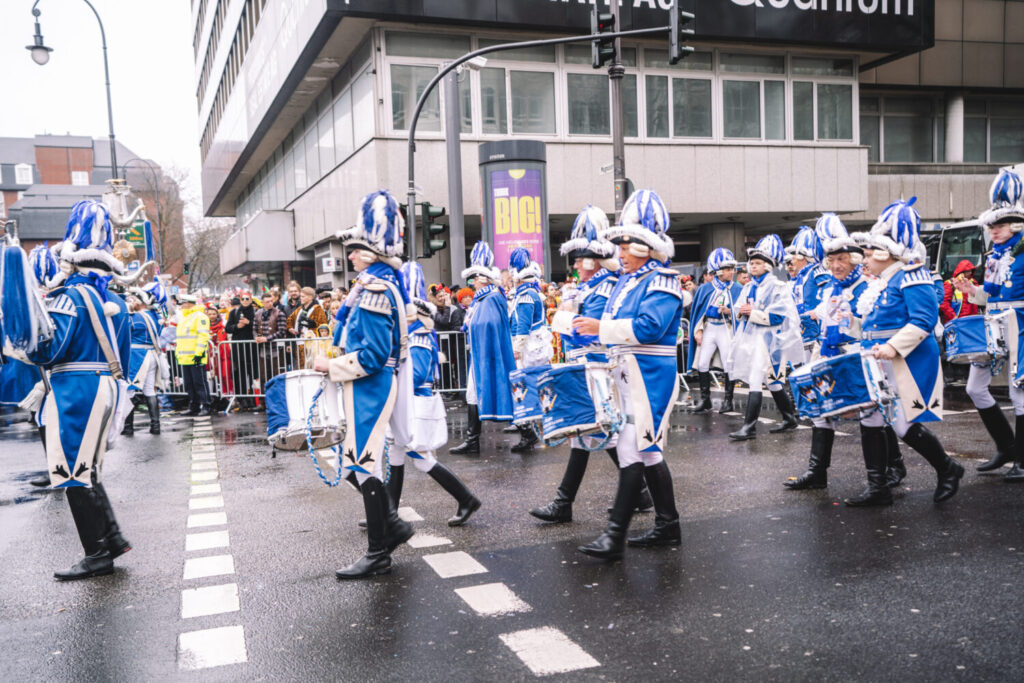
My Recommended Germany Itineraries
Germany is a huge country with a massive diversity in sights… so how can you organize your time efficiently and make the most of your trip? Here are some German trip itinerary ideas…
Germany itinerary ideas for a taste of everything:
- Southern Germany Classic: Munich, the Allgäu (for Castles!), Garmisch Partenkirchen, Berchtesgaden National Park, Stuttgart & Area, Black Forest
- Eastern Germany Classic: Berlin, Dresden, Saxon Switzerland
- Western Germany Classic: Aachen, Monschau, Eifel National Park
- Northern Germany Classic: Hamburg, Bremen , Lübeck, Kiel, Sylt
- The Rhine River Classic: Mainz, Koblenz, Burg Eltz, Cochem, Bonn, Cologne, Düsseldorf
- The Harz Mountains Experience: Harz Mountains, Goslar, Wernigerode, Quedlinburg

Germany itinerary ideas for city breakers and culture hunters:
- The Big City Tour: Berlin and Munich (a 4 hour express train connects them)
- The BaWu Special: Stuttgart, Ludwigsburg, Tübingen, Esslingen, Heidelberg
- The Bavaria Special: Munich, Nuremberg, Bamberg, Würzburg, Bayreuth
- The Saxony Special: Leipzig, Görlitz, Dresden
- The Rhine City Hop: Bonn, Cologne, Düsseldorf
- The Romantic Villages Hop: Würzburg, Dinkelsbühl, Nördlingen, Rothenburg ob der Tauber, Füssen

Germany itinerary ideas for nature lovers:
- Southern Germany Nature Itinerary: Berchtesgaden National Park, Garmisch-Partenkirchen, the Black Forest and Lake Constance (Bodensee)
- Bavaria’s Best Nature Itinerary: Berchtesgaden National Park, Garmisch-Partenkirchen, Munich’s Lake Region, Franconian Switzerland, Danube Gorge
- Eastern Germany Nature Itinerary: Dresden and Saxon Switzerland National Park

My Top Germany Travel Tips
- If you’re overwhelmed by transport options, Omio is a great resource for comparing trains, buses and flights in Germany at the same time.
- If travelling by train, look into group discount tickets like the Bayern Ticket which give you unlimited train travel for one day on regional trains. It can save you a TON of money.
- If you are traveling to multiple countries nearby (i.e. Switzerland), a Eurail pass might save you money.
Accommodation:
- Booking.com is a great place to search up hotels, and filtering by Free Cancellation allows you to book without paying upfront
- Airbnb can be a very affordable alternative for longer stays/bigger groups
Attractions and Tickets:
- GetYourGuide is a great site for finding tours and attraction tickets
- City passes like the Munich City Pass , Berlin Pass , and the Cologne Card can save you a LOT of money if you plan to visit many tourist attractions in a short time
- If you’re trying to find specific info about a place, try using Google Translate to search in German because German versions of sites always have more info
If you’re past the planning stage and heading to Germany soon, make sure you read this before you go:
- Hilarious must-knows before you visit Germany
More Germany Travel Reads
Feeling inspired to visit Germany after reading all that?
As you can (probably) tell, I’ve written extensively about Germany.
So, here are some more articles that might pique your interest:
- Unique Things to do in Germany (That You Can’t Do Anywhere Else)
- The Best Christmas Markets in Germany
- Hilarious Must-Knows Before You Visit Germany
My Go-To Travel Favourites:
🧳 Eagle Creek: My favourite packing cubes
💳 Wise: For FREE travel friendly credit cards
🍯 Airalo: My go-to eSIM
🏨 Booking.com: For searching hotels
📷 Sony A7IV: My (amazing) camera
✈️ Google Flights : For finding flight deals
🌎 WorldNomads: For travel insurance
🎉 GetYourGuide: For booking activities
4 thoughts on “The Only Germany Travel Guide You’ll Ever Need”
i found myself reading almost every post in your website for days and days and i ABSOLUTELY LOVE IT and adore and thank you for spending so much time and effort to make it so helpful, informative and fun to read. you have helped me plan my trip to munich in december and i cant wait to visit just because of your enthusiasm 🙂
We would like to Thank you for sharing such a beautiful blog! Very informative.
This Germany Travel Guide truly captures the multifaceted beauty of Deutschland, a country that has something to offer to everyone, from culture enthusiasts to nature lovers. Your personal anecdotes from living in Munich make it come alive, making me yearn for a taste of that amazing beer you’ve mentioned, and a wander around the English Garden! The varied seasonal highlights emphasize how Germany is a year-round destination, offering uniquely charming experiences, from the festive winter Christmas markets to the lively summer festivals. It’s heartening to know that navigating around the country is convenient, making it possible to explore its picturesque small towns and vibrant cities. This guide is a treasure trove for anyone planning to travel to Germany – it gives a well-rounded view of the country, infused with personal insights, which makes it even more valuable. I’m particularly intrigued to visit Munich, the city you so passionately call home.
As a Berliner, I can’t agree more with this guide. Germany truly is a delightful mix of tradition and innovation, natural beauty and urban charm, hearty cuisine and diverse cultures. Moving around in Germany is indeed quite convenient thanks to the well-organized public transportation system, including trains, buses, and trams. And yes, English is widely spoken in major cities, so communication shouldn’t be a problem for travelers. As for the varied dialects across regions, it just adds to the unique charm of exploring this beautiful country. Safe travels, fellow adventurers!
Leave a Comment Cancel reply
By using this form you agree with the storage and handling of your data by this website. *
- Books Learning Guide
The 9 Best Books to Learn German Effectively

Langoly is supported by our readers. We review products independently, but we may earn affiliate commissions if you buy through links on this page. As an Amazon Associate, Langoly earns from qualifying purchases. Please read our full disclosure for more information.
Guten tag! German is one of the closest languages to English, but it still takes hard work and study to master it. There are tons of resources available, and identifying the one that’s right for you can be difficult. If you’re reading this article, perhaps you’ve already decided that a book is a good choice for you (and you wouldn’t be wrong!). Below I show you some of the best books to learn German. No matter what your level or language goals are, I’m sure there’s a book here that will help you.
There are more than 97 million German speakers, making it the second most spoken language in Europe (after Russian). It’s an official language in 6 different countries: Germany, Austria, Belgium, Luxembourg, Switzerland, and Liechtenstein. Germany also has the largest economy in Europe and the 4th largest in the world. Learning German can open up job opportunities, expand your horizons, and help you immerse yourself in a new culture.
How We Picked the Best German Books
For any language learning products we’ve tested or researched , we follow a strict testing methodology to make sure our experts make the same considerations and follow the same criteria. By doing this, we make sure that we only recommend the best products. Here are the factors we looked at when testing German learning books specifically:
- Structure and Topics: We reviewed the layout and organization of the books to see how logical they are, and we also examined which topics each book covered and how in-depth and accurate the explanations were.
- Quality of Content: We read several chapters of each book to gauge the quality of the content, including the example texts, exercises, and explanations. It’s important that each book contains clear and easy-to-understand content that’s appropriate for the learner’s current German level.
- Value for Money: We took the two previous factors and compared them to the price of the book to determine if it offers a good value for the cost.
Our Top Books to Improve Your German Skills
Here is our list of the best books to learn German. Scroll down to read more about each one.
German All-in-One for Dummies
Best overall book to learn german.
The “For Dummies” book series is recognized around the world for providing practical and useful instruction about a variety of topics, including foreign languages. German All-in-One for Dummies is the best overall book to learn German because it combines 5 books from the “For Dummies” series into this comprehensive resource. I recommend it not only because of the variety of topics it covers, but mainly for its conversational and simple style. German is a language with exceptionally difficult grammar (noun cases, anyone?), but this book is approachable and explains the concepts in a laidback way. The grammar it does teach you is specifically for communication – the grammar section is literally called “Assembling the Grammatical Foundations for Communication.”
Don’t be fooled by its informal nature, though. This book will take you from complete beginner to intermediate if you complete the lessons in order. The structure of it is logical, and once you build a strong foundation in the first half, the second half helps you refine your skills to speak more naturally. The aspect I like most about it is that the focus is always on conversational language. For most German learners, becoming conversational is the ultimate goal, and with German All-in-One for Dummies , you can achieve it. See more about the book here .
Key Benefits
- The book’s focus on communication means you’ll improve your skills quickly
- The sections follow a logical order and reinforce what you learned in previous units
- The audio material complements what you learn in the books and enhances your listening and speaking skills
The Everything Learning German Book
Best for beginners.
I discovered “The Everything Learning” books when I started studying Portuguese (and loved it!). I was excited to see The Everything Learning German Book was also available so I had to take a look at it. This book focuses on how to navigate everyday situations in German. The reason I recommend it as the best book for beginners is because it showcases the similarities shared by English and German and builds upon them. By using this method, the lessons are easy to follow and more memorable. For example, one of the first sections in the book is called “The Vocabulary You Already Have.” Whether you realize it or not, a lot of words are the same in German and English. The book lists examples like name, film, moment, and national .
Each chapter of the book focuses on a general concept and then has more detailed sections that break down that concept into everyday situations. I particularly like how the book taught numbers. It starts by teaching the numbers themselves ( eins, zwei, drei… ). After that, you learn how to talk about street addresses and phone numbers, as well as measurements, ordinal numbers, fractions, money, and quantities. The logic behind the layout of the sections makes the book one of my absolute favorites. Also, for the value it provides, the price is reasonable. You can check it out here .
- Focuses on communication instead of distracting you with complicated grammar
- Simple explanations that build on previous lessons and reinforce what you already learned
- The emphasis on practical vocabulary means you’ll be able to communicate more quickly
German Made Simple
Best for self-study.
German Made Simple takes a direct, no-frills approach to teaching German, and that’s why I think it’s the best book for self-study. The teaching method is also interesting. The whole book follows a single storyline – an American businessman learning German. Each unit has a story that’s divided into sentences followed by a translation, a vocabulary list, grammar explanations, and exercise activities. The reason German Made Simple ‘s method is so unique is that each section accomplishes a certain goal. For example, the story in Chapter 4, “ Herr Clark ist hungrig ” (“Mr. Clark is hungry”), teaches you the indefinite articles ein and kein , shows you real-life examples of verb endings, helps you practice using nicht to negate, and you also start forming questions in German.
Overall, this book is most helpful for people who have a basic level in German and are looking to improve their reading and writing skills. But I’d also suggest it as a resource for more intermediate and advanced learners, too. The later chapters when Mr. Clark leaves Germany (specifically chapter 40 – “ Herr Clark verlässt Deutschland ” – and onwards) cover more difficult topics like German subjunctive and the conditional tense. You can learn more about the book here .
- The linear story becomes more and more complex as you learn more grammar and vocabulary
- There’s a pronunciation guide to help you practice reading the stories aloud
- Your learning is more structured because there’s a clear goal for each story
Speak German in 90 Days
Best for travelers.
Speak German in 90 Days is best for travelers because it not only teaches you what to study but also how to study German. The book consists of 90 lessons (one for each day), which means you can time it perfectly and prepare for your upcoming trip to a German-speaking country. The content itself is solid but nothing too special. The main reason I wanted to include it on this list is because it follows a specific timeframe – 90 days. This aspect motivated me to continue completing the lessons each day.
Another reason I enjoyed this book is because it focuses on speaking. It doesn’t distract you with useless vocabulary or overly complex grammar concepts. The organization of the chapters is clear and logical, too. First, you learn the question words and other grammar basics, then nouns basics, verb basics, and so on. By the end of the book, you’ll understand how to form complete sentences. Each lesson also teaches you 10 vocabulary words, so you’ll know at least 900 words by the end. If you’re traveling, that’s more than enough to get the most out of your trip. You can see more about the book here .
- The book follows a clear timeline, which keeps you motivated and on track to continue studying
- The focus is on conversational German and it helps you develop your speaking skills quickly
- Because of its clear layout, this book is an excellent reference that you can use over and over again
German Grammar for Beginners
Best for german grammar.
German Grammar for Beginners is a straight-to-the-point guide for learning the basics of German grammar. There are 30 lessons that clearly explain the rules of the language and they have over 300 exercises to help you reinforce what you learn. Especially with grammar, I prefer a clear guide to the most important topics and I want to be able to locate exactly what I need to practice. That’s exactly what this book offers. There’s a lesson on the articles, noun genders, verb tenses, and more, and each lesson has a recap section followed by practice activities.
One aspect of this book I commend is its focus on time management: The idea is that you spend 30 minutes a day for 30 days to complete the book and develop an effective study habit. I think this is the perfect amount of time to spend on grammar because it’s enough to understand a new concept without feeling fatigued. It’s clear the author is an effective teacher too because each lesson is balanced and includes the perfect amount of detail. For its price, German Grammar for Beginners is an excellent value and worthwhile resource. Check out more about it here .
- This book guides you through the most essential German grammar and teaches you the most important topics you need to know in 30 days
- There is a huge amount of practice activities available so you can truly grasp what you’re learning
- It comes with free audio files that extend your learning and improve your communication skills
Practice Makes Perfect: Complete German All-in-One
Best german workbook for practicing.
“Practice Makes Perfect” is a brand similar to the “For Dummies” books, and its Complete German All-in-One is a compilation of 6 workbooks from the “Practice Makes Perfect” series. I used this book to study German in university and I liked how practical it was. There aren’t lengthy explanations, just a lot of exercises to help you actively hone your skills. There are some useful tips throughout the book too, like how to spot masculine nouns (they often end in -en, -el, or -er ). Once you learn that, the book asks you to practice identifying masculine, feminine, and neuter nouns in a list.
This book doesn’t have complete lessons, so it’s probably not the best choice for a beginner. However, if you already have a basic understanding of the German language, this book is the best one available to practice using it. All of the explanations are in English too, which makes it useful even if you’re not yet able to read fluently in German. Since this book actually contains 6 different workbooks, it’s definitely worth the price. You can see if this book is a good choice for you here .
- This book is full of practice exercises, which means you’ll use German instead of just learning about it
- The tips and hints throughout help you significantly improve your grammar and vocabulary skills
- Excellent tool for self-study if you don’t have access to a tutor or native speakers
Easy German Phrasebook
Best for german vocabulary.
Easy German Phrasebook helps you learn the 1,500 most common phrases for everyday use and travel. It doesn’t teach grammar or more advanced topics, but if you want to focus on growing your vocabulary, it’s a top-notch resource. The book is organized in a simple way: it’s divided into common vocabulary topics such as colors, business, and the weather. One aspect that makes it stand out from other vocabulary books is that it has a detailed pronunciation guide at the beginning. This means you not only learn the words and phrases, but how to pronounce them correctly as well.
This book is best for beginners or people looking to learn some necessary vocabulary before a trip to a German-speaking country. It can be a nice reference guide, but it’s certainly not a comprehensive course on the German language. If that’s what you’re looking for, check out some of the other books on this list. Easy German Phrasebook is a reasonably-priced book, though, and it’ll complement your other German learning resources. You can learn more about it here .
- This book is organized by topic so it’s easy to find which words you want to study
- The price of the book is low and it’s an excellent supplement to other German materials
- The pronunciation guide at the beginning helps to say the words correctly as soon as you learn them
Der, Die, Das: The Secrets of German Gender
Best for learning genders of nouns.
There are three grammatical genders in German, and they can be especially difficult to learn for English speakers. Der, Die, Das: The Secrets of German Gender is an in-depth guide that makes this aspect of the language a lot more simple through common-sense explanations. The book has 6 sections, and the first three are each dedicated to one gender – masculine, feminine, and neuter. The next three sections teach you how to distinguish the genders, and they also explain how some nouns have more than one gender or no gender. These last two sections are mainly what made me include the book on this list. These topics are brushed over in most other resources, but it’s an extremely important topic if you hope to achieve fluency.
Der, Die, Das will help you master German gender by teaching you about the origins and linguistic history of the genders. Once you understand more about the rules, you’ll see that a word’s gender is rarely random. This lesson alone makes the book worth its price. That said, the book does only focus on gender. It’s important to keep in mind that you’ll need to use other books in addition to this one for a more comprehensive understanding of German. You can learn more about the book here .
- You’ll understand the history of word genders in German, which makes it easier to distinguish a new word’s gender
- Learn about words with more than one gender or no gender (something most other books ignore)
- There’s a proficiency test at the end to help you practice what you learned throughout the book
50 German Coffee Breaks
Best for practicing on the go.
50 German Coffee Breaks helps you build and master a language learning routine. The idea is that by completing the simple 5-, 10-, and 15-minute lessons, you can learn German in the time it takes you to drink a cup of coffee. The focus on time management and practical steps maximize your study time and make it the best book to learn German on the go. There are different activity types throughout the book that keep it interesting, too. Some of my top picks are the word building activities, “Say What You See” exercises, guided translations, and mini grammar challenges.
The “Say What You See” activities are by far the most effective that I’ve seen in any German book. They show you a picture and you describe what’s in it. To help you out, the book includes some suggested phrases and vocabulary words. You can also see an example answer to get an idea of what you should say. Another feature of this book that makes it stand out is the activities that use idiomatic expressions. My favorite expression that I learned from this book is “sie hängt es nicht an die grosse Glocke” (“she’s not making a big deal out of it”). You can take a look at the book here .
- The book is full of actionable exercises and games to improve your German communication skills
- The lessons are quick and easy to complete, as well as super efficient
- There’s a podcast from the same company that will help you further improve your skills
Other German Books We Reviewed
While I tested every book on this list, I also reviewed a few others that didn’t quite make it. Here are some of the other German books I looked at that almost made the cut:
- Learn German for Adult Beginners : The idea of this book is interesting, but it’s unorganized and doesn’t deliver enough value to justify its price. It also makes the claim that you’ll speak German in 30 days, which simply isn’t true.
- German Picture Dictionary Coloring Book : This book could be useful for visual learners because you color in pictures of new vocabulary words. However, there are much more efficient ways to learn new words and I think this book could end up wasting your already-limited study time.
- German Men Sit Down to Pee and Other Insights into German Culture : To be honest, I loved this book. It’s a lighthearted overview of the quirks of German culture. The only reason I didn’t include it on the list is that it doesn’t actually teach you the German language. It’s still worth a read though!
- Swear in German like a Pro : This book is a coloring book that teaches you random German swear words. It could make a fun gift, but it’s not helpful for someone actually learning the language.
Why You Should Use Books To Learn German
Using books is one of the most effective ways to learn German. There’s such a wide variety that you’re sure to find one that’s right for you. For beginners, there are books that start from zero and offer an all-around approach to learning. If you are more advanced, there are books focus on specific skills so you can really take your German to the next level.
How To Use Books To Learn German
If you want to use a book to learn German, it’s important to dedicate time each day, or a few times each week, to learn this language. Consistent study will help you see continual improvement in your language learning skills.
It’s also important to use a variety of resources. While books are good for explaining tricky grammar concepts, a podcast or German language app might be more effective to practice listening and speaking. You can also take an oline course with private or group classes. Using any of these methods in conjunction with a book will ensure you’re improving all necessary language skills.
Jenny Tehraud, Langoly’s German language expert, suggests you “read texts about topics you are interested in or watch movies/series or listen to podcasts that you would also watch or listen to in your native language (such as sports, pottery, the outdoors, animals, nature, computer games). You will automatically learn the vocabulary by doing this on a regular basis.”
Best Books To Learn German: Final Thoughts
I hope this article has helped you identify a book or two that can help you on your German language learning journey. All the books on this list are popular amongst language learners. With dedication and time, you can start learning German quickly and effectively.
Best Books To Learn German: FAQ
German All-in-One for Dummies is the best book for learning German. It combines 5 different books into this one comprehensive resource that teaches all of the important language topics. It also includes practice exercises and a companion CD that helps you practice listening and understanding.
There are many ways to learn German by yourself, but one of the most effective ways is to use a textbook. There are many comprehensive books that can teach you the basics of German grammar and vocabulary. In addition to a book, you can also take online classes with a German tutor or use a language app on your smartphone.
You can definitely learn German by reading books! If you are a beginner, it’s recommended that you use a textbook, like The Everything Learning German Book to learn the basics of German grammar and vocabulary. Once you reach an intermediate level, you can start reading short stories in German, and when you have an advanced level you can read fiction and non-fiction in German.
According to the US Department of State , it takes 36 weeks (or 900 class hours) to learn German to a proficient level. But this number varies on other factors, such as your natural ability to acquire languages and if you know another language that is similar to German. To see how long it will take you to learn German, check out this fluency calculator.
Kelsey Wetherbee
Leave a reply cancel reply.
Your email address will not be published. Required fields are marked with (*). Comments are moderated and may not publish immediately.
Have you tried this product? How would you rate it?
Save my name, email, and website in this browser for the next time I comment.
Table of Contents

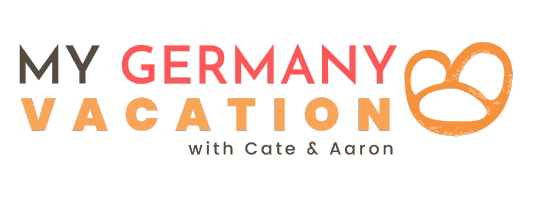
15 Best Germany Travel Guides
This post may contain affiliate links. Read my disclaimer policy.

Looking for the best Germany travel guide to take on your trip? Here are 15 of the most useful options for travelers planning trips to Germany!

Germany is a world class tourist destination in the heart of Europe.
Every year, millions of people travel there to taste its many famous beers and traditional German cuisine , visit enchanting fairy tale castles , national parks, and beautiful sights, learn about its rich history and culture, and much more.
No matter whether you plan to visit busting big cities or Germany’s many thriving smaller cities, you’ll find tons of attractions and points of interest. But they can be difficult to explore effectively without a guide to help you along the way.
Join our FREE Germany Trip Planning Facebook Group!
This article shows you the best Germany travel guides out in the market today (both in hard copy and Kindle) and how you can choose the best one for your trip.
Whether you plan to spend time in Berlin, the Rhine, Bavaria (or elsewhere!), want to travel by cruise, train or take a road trip, or are traveling solo, with a partner or your entire family, there’s a guide for every kind of itinerary and traveler!

- 1 Quick Guidebook Recommendations
- 2 Why Use A Travel Guide?
- 3 Germany Travel Guides Comparison Chart
- 4 How To Choose The Best Travel Guide For You
- 5 15 Best Germany Travel Guides
- 6 What To See And Do In Germany?
- 7 When Is The Best Time To Go To Germany?
Quick Guidebook Recommendations
Check out this quick list of our favorite guide books if you’re in a hurry, or continue scrolling to see our full list with in-depth reviews.
- For Insider Tips On Hidden Gems : Fodor’s Essential Germany
- For Kindle Unlimited Users : The Rough Guide to Germany
- For First-Time Travelers to Germany: Rick Steves Germany
- For multiple formats and off-line maps: Lonely Planet Germany
- For DIY Berlin Walking Tours: National Geographic: Walking Berlin
- For Visiting Munich, Bavaria & The Black Forest: Lonely Planet: Munich, Bavaria, and the Black Forest
- For Visiting Rothenburg & the Rhine: Rick Steves’ Rothenburg & the Rhine
- For Road Trips & Day Trips in Germany, Austria & Switzerland : Lonely Planet’s Guide to Germany, Austria, and Switzerland
- Best City Pocket Guide s: Lonely Planet’s Pocket Guide Berlin, Hamburg, Munich
- For Roadtrips in Germany: DK Eyewitness Road Trips
- For Rail Travel in Germany: Europe by Rail
- For River Cruises: Lonely Planet Cruise Ports European Rivers
- Best Guide for Kids: Kids Travel Guide Germany
- For Quickly Learning About German Culture: Culture Smart Germany
- For Learning German Language: 1,000 German Phrases

Why Use A Travel Guide?
Germany travel guides are a great resource for planning specific aspects of your trip, especially when combined with the info we provide on this website.
You can never have too much trip planning information, and a good travel guide provides essential travel information without the need for wifi.
Travel guides are especially useful for people who don’t have a lot of experience traveling abroad or who don’t speak the language of their destination country.
The guides we highlight below can help you find good restaurants, learn about regional customs and traditions, and avoid scams in specific locations.
If you’re looking for something more specific than general travel advice, there are many specialty travel guidebooks available that cover everything from hiking trails to famous literary locations around the world!

Germany Travel Guides Comparison Chart
Here’s an overview of the best guidebooks for Germany travel. Scroll down for a more detailed review of each book!
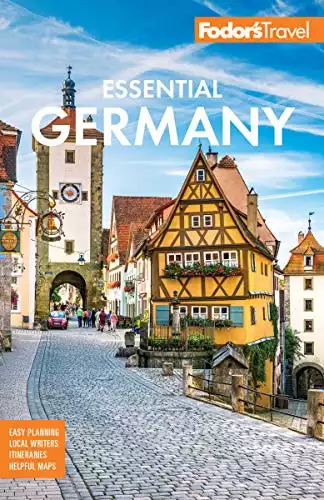
- Perfect for insider tips
- Full-size street maps
- Sample itineraries
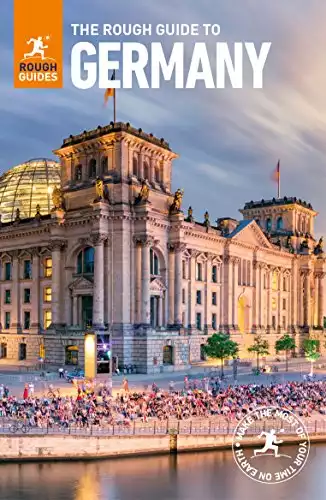
- Free with Kindle Unlimited (as of now)
- Carefully planned itineraries
- Full-color maps
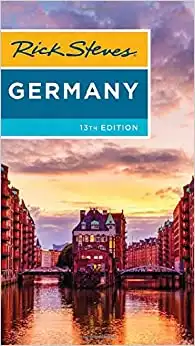
- Perfect first timers
- Strategic advice for making the most out of your budget
- Tips on how to plan a multi-week trip to different cities in Germany

- Honest reviews of restaurants
- Free on Kindle Unlimited too
- Add notes to personalize your digital guidebook
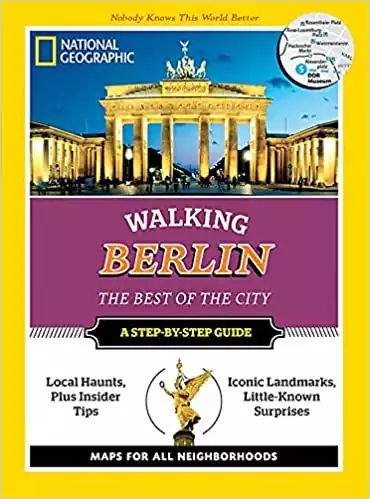
- 15 walking tours
- Step-by-step itineraries
- Detailed maps

- Up-to-date research on travel information and what businesses are still open after light of Covid-19
- “What’s new” sections featuring cultural trends
- New, up-and-coming areas to visit

- Insider travel tips
- How to avoid tourist traps
- Rothenburg & Rhine focused
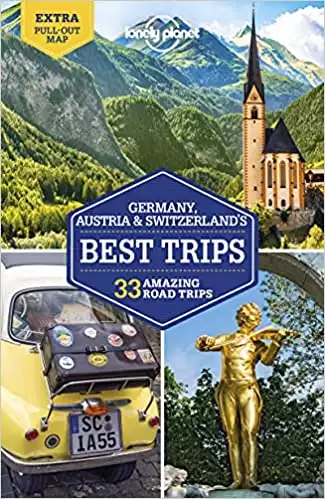
- Germany, Austria & Switzerland
- 33 trip ideas
- Fastest travel routes & scenic detours
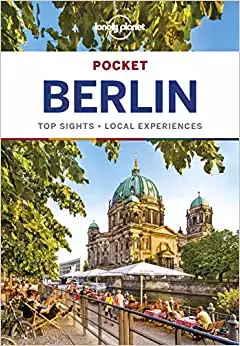
Small & handy
Books for Berlin, Hamburg & Munich
Expert advice on top tourist destinations & neighborhoods

- 24 well-researched driving routes.
- Discover stunning views and hidden gems off the beaten track
- Practical tips for driving in Germany
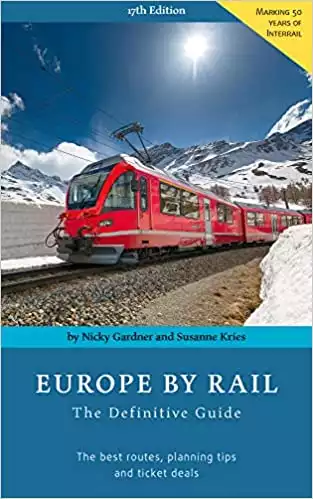
50 key routes
Tips on the best ticket deals
Fun sights to see along the routes

- Advice for first-timers
- Covers Germany & other European cruise routes
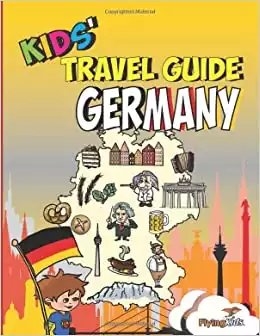
- Fun facts about Germany
- Language learning
- Coloring pages, quizzes, puzzles & journal pages

- German history
- Cultural values, traditions & etiquette
- Regional cultural differences
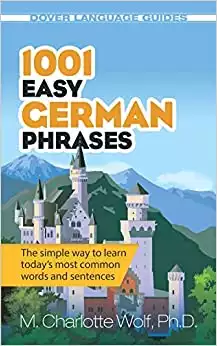
- 1,000 basic words, phrases, and sentences in German
- Small talk, asking for directions, finding a bank, ordering at restaurants
- Phonetic pronunciation guide!
How To Choose The Best Travel Guide For You
There are a lot of travel guides on the market, making it pretty overwhelming to find the right one. When choosing the best travel guide for your trip, there are a couple of things you should take into consideration.
Grab our FREE Germany Trip Planning Checklist Now!
What are your travel plans?
If you’re going on a multi-week trip across Germany, visiting several cities and regions, then the best travel guide for you will be a comprehensive general country guide on Germany.
These kinds of guides usually have multiple chapters dedicated to all the big cities and regions, making it easy to flip through whichever destination you’re going to along your trip.
On the other hand, if you’re mostly staying in a specific region or a couple of cities, then it’s better to find a regional guide that really narrows in the area you’re visiting. This way you won’t be bogged down with city information that may not be applicable to your trip.
What’s your travel style?
If you’re going on road trips, you’ll find guidebooks with specific information and helpful tips on driving in Germany, the best scenic routes, and more. Likewise, if you’re going on a river cruise, find a guide that covers that specific type of travel. There are also guides that are geared towards kids.
What’s your preferred writing style?
Do you prefer matter-of-fact, objective, no-frills writing? Or do you gain more value from reading personal guides filled with the author’s own anecdotes and experience of the city?
There are also guides that focus heavily on history, others on beautiful travel photography. Make sure to read reviews to get a gist of the style and content of the guide!

Fodor’s Essential Germany is the perfect guide for those who want insider tips on how to experience Germany like a local.
Fodor’s Travel Guides are all written and researched by local experts, who can offer you unique insights you might not find in other guides.
In this guide you’ll find fully updated information on all of Germany’s main attractions and hidden gems, which includes restaurants, hotels, and even outdoor activities.
As well as full-size street maps and beautiful photographs, you’ll also have access to multiple sample itineraries to help you make the most out of your travel time.

The Rough Guide to Germany is one of the best options for those who want a guidebook on their Kindle – it’s free with Kindle Unlimited (as of now)!
You’ll have rundowns of must-see landmarks, carefully planned itineraries, and full-color maps to navigate the streets of Berlin or Munich without the need to go online.
This guide covers a vast majority of areas in Germany, not just the major cities . If you’re spending more time in a certain region, then the detailed regional coverage will be very useful.

Rick Steves is one of the most well known travel writers from the United States. His mission is to empower Americans to go on fun and culturally enriching trips to Europe and his guidebook to Germany reflects that.
People who are traveling to Germany for the first time will find this guide very useful. It has strategic advice on how to make the most out of your budget and time with tips on how to plan a multi-week trip to different cities in Germany.
Other handy features include self-guided walking tours, a packing checklist, and a German phrasebook. This edition also has up to date detailed information reflecting the changes brought about Covid-19.

Lonely Planet has some of the best guidebooks in the market and the Lonely Planet’s Germany is no exception - it's currently the #1 best seller on Amazon.
They provide comprehensive and trustworthy information on everything you need to know about Germany, from the most visited tourist areas to less well known historic cities.
This guide makes sure to provide itineraries and honest reviews of restaurants, shops, landmarks that cater to every kind of travel style and budget.
The book is available in both digital (it’s free on Kindle Unlimited too!) and paperback versions. The digital version comes with downloadable PDF and offline maps that are great for preventing extra roaming charges, embedded links to recommendations with websites.
You can even add notes to personalize your guidebook. The paperback version is small and sleek, making it easy to bring around while traveling.

If you’re staying in Berlin for some time, then you’ll probably be spending a good amount of time walking (alongside using their excellent public transport).
And there’s no better way of getting to know a city than by walking! National Geographic Walking Berlin is the best guidebook for this.
This book contains 15 walking tours with step-by-step itineraries and detailed maps that will have you roaming and exploring Berlin like a true local in no time.

Lonely Planet just came out with their newest guide on Munich, Bavaria, and the Black Forest.
Whether you’re looking for the perfect spa town to relax along the Black Forest or celebrating Oktoberfest in Munich, this guidebook will have you covered.
Since it was just recently published, you’ll be able to find up-to-date research on travel information and what businesses are still open after light of Covid-19.
Aside from all the essential reading, there are also “what’s new” sections that feature cultural trends and new, up-and-coming areas to visit.

From wandering around quaint villages, going back in time exploring ancient castles ruins, or dining in good restaurants by scenic vineyards, the Rhine Valley is a must-visit.
It’s particularly known as a romantic destination, but every kind of traveler can enjoy it. Rick Steves’ guide to the Rhine is a great place to start planning your trip.
It includes insider travel tips on how to beat crowds and avoid tourist traps. The selective coverage also includes information on Rothenburg, a picturesque well-restored medieval city.

Lonely Planet’s Guide to Germany, Austria, and Switzerland is perfect for those whose travel plans always include day trips or road trips.
Especially if you’ve planned your itinerary with the goal of visiting neighboring countries like Austria or Switzerland, then this guide is for you.
This guide covers everything from the Romantic Road, Lake Bodensee, the Swiss Alps, Zurich, Lake Geneva, Vienna, Salzburg, and more! It features over 33 trips to take with useful advice on breaks to stretch your legs along the way, the fastest travel routes, and scenic detours.

The Lonely Planet’s Pocket Guide series are perfect for those taking shorter trips over a weekend or maybe those who have limited leisure time during business trips.
These guides are small and handy, getting down to the basics of each German city. It’s easy to use and concise, with expert advice on the top tourist destinations, neighborhood chapters, and day planners.
Click here for more information on Pocket Berlin, Pocket Hamburg , and Pocket Munich

DK Eyewitness Road Trips is ideal for those who want to explore Germany through road trips.
This guide contains 24 well-researched, easy to follow driving routes. Each lasts from 1 to 5 days, so you can choose any depending on your time and preference.
You’ll get to learn about stunning views and hidden gems off the beaten track that you can only discover on the road. It’s full of practical tips like road conditions, detours, parking info, and navigation details for GPS use.
Plus, each tour includes ideas for activities and sights along the way.

Europe by Rail is the definitive guide for planning your European trail travel journey using Interrail or Eurail.
This guide includes 50 key routes that you can follow or incorporate into your Germany itinerary.
It also contains tips on the best ticket deals, where to stay, and fun sights to see along the routes. It covers popular routes such as Glacier Express, the Rhine Valley, French Riviera, and the Scottish Highlands with information on new routes to Slovakia, Greece, and more.

River cruises have been gaining popularity, with many tourists loving the different perspective you get as you travel by water through scenic riverfront views.
Riverboats are usually much smaller than Mediterranean cruises, making for a more social experience and more frequent stops and onshore activities.
This Lonely Planet guide is perfect for those going on a European cruise through a number of different countries but who do not want to buy a guide book for each country.
It covers the following routes: Northern Rhine, Southern Rhine (France, Germany, Switzerland), Western Danube (Austria and Germany), Eastern Danube (Hungary and Serbia), the Seine (France), and the Elbe (Czech Republic and Germany).

Traveling with children to Germany for the first time can be intimidating. Kids Travel Guide Germany is here to help ease your worries!
This guide is a fun gift to give your kids as a way to cultivate their interest in traveling from a young age. Leonardo, the cute cartoon tour guide, will teach your kids fun facts about Germany and even basic German words.
It also comes with an activity book full of coloring pages, quizzes, puzzles, and journal pages to document their trip.

Nothing enriches travel experiences like immersing yourself in the country’s local culture. Culture Smart Germany shows you everything you need to know about German culture and way of life.
You’ll find chapters discussing history, values, cultural differences between regions, cultural traditions, and common etiquette to follow.
It’s great for navigating day to day life while you travel and even for more formal business trips.

This German phrase book is the ideal companion for your trip to Germany.
With more than 1,000 basic words, phrases, and sentences in German it covers every travel situation you could think of from small talk, asking for directions, finding a bank, and ordering at restaurants.
Easy to use and straight to the point, this guide will help you familiarize yourself with the German language and navigate social situations with locals. It also comes with a phonetic pronunciation guide!

What To See And Do In Germany?
If you’re not sure which guidebook will work best for you, consider where you most want to spend your time.
Germany is filled with tons of historic places to learn from, beautiful landscapes to admire, and fun cultural activities to experience. To get a gist of what awaits you in your Germany trip, let’s break it down to some of the main travel destinations in the country.
Berlin, the capital of Germany (and the largest city), is where you’ll find some of the most iconic landmarks of German history. You won’t run out of things to see from the Brandenburg Gate, the East Side Gallery, the Holocaust Memorial, the German Parliament Building (Reichstag), and many more.
For more information on the top historic places to visit in Berlin, read our guide to planning the ultimate Berlin itinerary.
This dynamic city has also undergone a lot of changes in the past decades, growing into one of the most interesting cities to visit in central Europe. Many people are drawn to the vibrant Berlin arts scene and music scene.
After all, the capital city is home to world-class museums (including some that give you a glimpse into what life was like in East Germany) and some of the best nightlife in Europe.
Plus, it’s the gateway to rugged Rügen island to the north on the Baltic Sea, historic Dresden to the south, as well as “Swiss Saxon” national park area.

Hamburg, located on the Elbe river in northern Germany, is one of the most unique German cities. Famous for its ports, lakes, canals, and rivers running throughout the city, Hamburg shows you a different side of Germany.
Whether you canoe through the canals (super fun!) or try delicious fresh seafood after a harbor cruise, you won’t run out of fun activities to do in Hamburg. It’s one of my favorite cities in Germany!
The Black Forest is a region worth visiting for its spectacular scenery, small towns, and close proximity to France and Switzerland. It’s one of the best places to visit for those who love outdoor activities. There are hundreds of miles of hiking trails to explore and lakes and waterfalls to admire.
In-between immersing yourself in nature, you can explore picturesque smaller towns like Baden-Baden, Heidelberg, or Freiburg, and villages like Titisee-Neustadt, Triberg, and Gengenbach. You can also spend an afternoon seeing how people used to live at the Black Forest Open Air Museum.
Making your way to southern Germany, you’ll find the Bavarian Alps. For a scenic drive that makes the most out of your experience, we recommend driving south down the Romantic Road.
This route connects storybook castles , medieval towns, and breathtaking landscapes. It’s also one of the best ways to get to Neuschwanstein, the fairy tale castle that’s undoubtedly one of Germany’s most popular attractions.
A staple in all Germany itineraries is, of course Munich, the biggest city in Bavaria. It’s a popular destination for good reason – it’s a beautiful city rich with history far beyond the famous Oktoberfest. Munich (and Bavaria in general) is what most people envision when they think of Germany.
From Munich’s beer gardens, lush urban parks, and historic plazas, you won’t run out of things to see! Check out our guide on how to plan the perfect Munich weekend itinerary here.

Before leaving southern Germany, make sure to stop by Lake Constance (Bodensee in German). Found along the country’s border of Austria and Switzerland, this region with its lakeside small towns is a great place for sunny summer holidays.
In Central Germany, you’ll find the Rhine Valley which holds great historical and cultural importance as a UNESCO World Heritage Site. It’s also a popular romantic destination where you can do activities like wine tasting in hillside vineyards and going on a cruise on the Rhine river. We recommend exploring the area on a boat tour to bring you to quaint villages and ancient castles.
Cologne is a great gateway city to the Rhine Valley. The city’s old town is home to the famous Cologne Cathedral and it’s a great walkable area with lots to see.
Another nearby major city is Frankfurt. Though you may only know Frankfurt as Germany’s financial capital or home to one of the world’s busiest airports, the city is fun to explore for its modern architecture, the contrasting historic old town, and interesting museums. Read our guide to spending a day in Frankfurt here or how to day trip to the many castles in the area.
We hope this gives you a good idea of all the exciting things to see and do in Germany. We know there’s a lot to take into consideration. That’s why we also prepared a step-by-step guide on how to plan the perfect Germany vacation that answers everything from where to stay, what cities to visit, and how to get around!

When Is The Best Time To Go To Germany?
We get this question a lot! The best time to go to Germany totally depends on what kind of experience you’re looking for. There’s really no bad time to visit because each season has something great and unique to offer!
During summer, you’ll get to enjoy warm and sunny weather. The long days are perfect for sightseeing since the sun sets as late as 10:00-10:30 pm. Be aware that you won’t always be guaranteed clear, blue skies, though. Some days can be rainy or windy but that kind of weather usually doesn’t last longer than a couple of days.
On the flip-side, it can also get really hot during heat waves, and you won’t find A/C in all restaurants and hotels.
Another downside is that since it’s peak season, streets and tourist attractions can be much more crowded with families from all over the world traveling during summer break. Prices for tickets and accommodations are also at their highest so we recommend booking reservations as early as possible.
Winter can also be a beautiful time to visit, but you’ll obviously have a very different experience. Snow, cold weather, and short days with the sun setting as early as 5 pm are just some of the things that you can expect.
Luckily, you’ll have the festive bright lights and cozy atmosphere of Christmas markets to make up for it. It’s also an ideal time to visit if you love winter activities like skiing or sledding.
Fall can be a good time to visit, especially if you want to participate in Oktoberfest festivities which take place late September to early October. The autumn weather means it’s still pleasantly enough for strolls, though you’ll have colder nights as you approach winter.
Weather during spring can be a bit of a toss-up. Some days can bring light breezes and warmth but other days can be gloomy and rainy. But you’ll get to see cities come alive and locals spend more time in parks or beer gardens as flowers bloom and outdoor activities kick into gear.

Cate has been traveling to Germany for 30+ years. She has lived in Germany, taught college German, and has a PhD in German Applied Linguistics. She loves helping travelers plan their dream trips to Germany!
Similar Posts

Top 35 German Foods To Try in Germany

Summer in Germany: 19 Beautiful Places to Visit & Things to Do

Best Hotels Near Neuschwanstein Castle & In Füssen
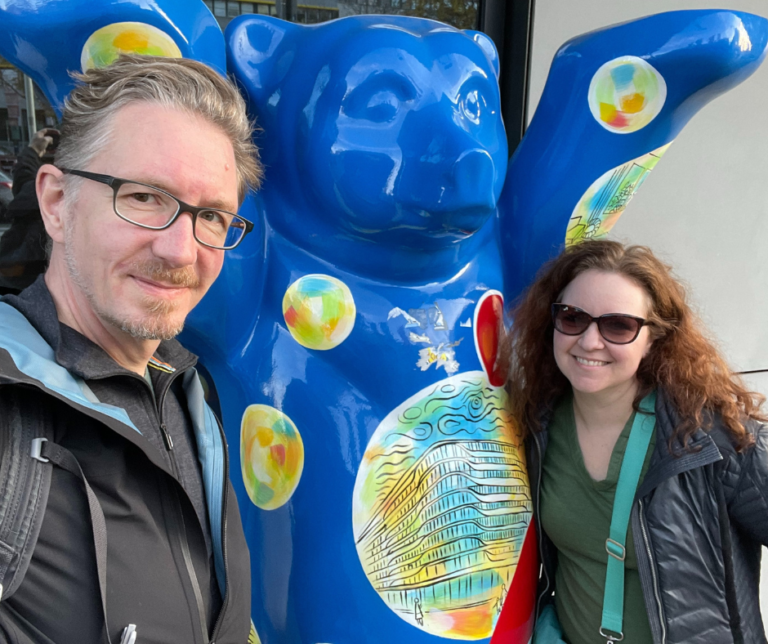
15+ Things We Take On Every Germany Trip
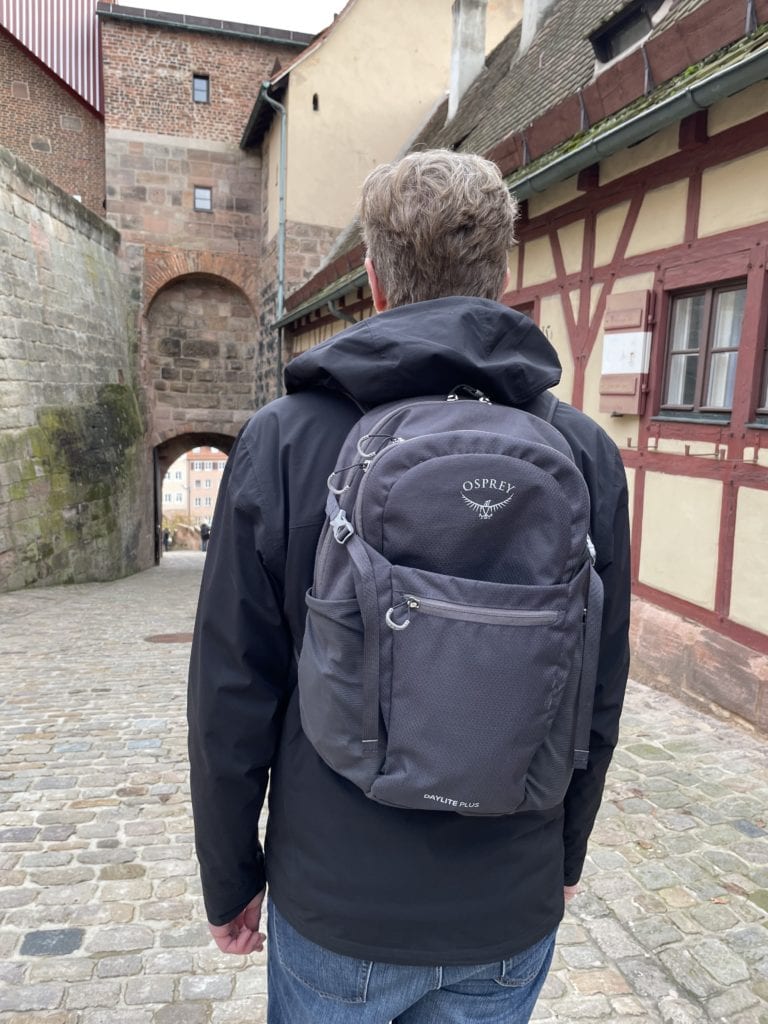
Germany Travel Gift Guide

Best German Translator Apps for English Speakers
Here’s how we can help you plan your perfect trip in 2024.
GERMANY TRAVEL PLANNER: Just getting started? Have questions about Germany’s confusing train tickets or how to find the best guided tours? Not sure which parts of Germany should be in your itinerary (and what to leave out)? Our Germany Travel Planner answers those questions and more via how-to videos, our interactive Germany Planning Map, City Cheatsheets, and MUCH more. Click here to unlock the best of Germany the easy way!
GERMANY TRAVEL CONSULT: Feeling overwhelmed? Itinerary just not coming together? Wonder if a few tweaks would take your trip to the next level? Book a Mini or Full consult with Cate! She’ll help you create or tweak your itinerary, recommend train tickets/passes, hotels, things to do, guided tours, show you how to buy train tickets, orient you to specific cities, help you plan out day trips, and answer your Germany travel questions.
ACCOMMODATIONS: We recommend using Booking.com since they have widest range of accommodations available from hostels, boutique hotels, luxury chains, aparthotels, at the best prices. Check out our accommodation guides for specific recommended hotels.
WHAT TO PACK: If you’re bringing your phone, be sure to bring this plug adapter , this power bank , and this wrist strap . They’ve been lifesavers for us! You can see our other packing essentials here and here .
TICKETS & TOURS: For guided tours, day trips, private tours, and skip-the-line tickets, Get Your Guide is our go-to!
TRAINS & BUSES: To research train schedules and buy tickets or a Germany Rail Pass, we recommend the official Deutsche Bahn (German Rail System) website (and download their DB Navigator app). For buses, look at FlixBus , which offers tickets for routes within Germany and to other European countries. FlixBus is often cheaper than trains but can take longer.
Leave a Reply Cancel reply
Your email address will not be published. Required fields are marked *
Save my name, email, and website in this browser for the next time I comment.

Flannels or FlipFlops
20 Phrases You Should Learn Before You Visit Germany
Posted: May 13, 2024 | Last updated: May 13, 2024

Germany is a blast to explore. While its history has complexities, countless sites exist to discover and learn from. But what I adore most about Germany is its breathtaking views and delicious cuisine.
Many people may feel hesitant about visiting Germany due to language barriers and its historical background, but it’s a fantastic place to visit today.
During my college study abroad stint, I had the opportunity to visit Germany multiple times. I found that picking up a few German phrases made a huge difference in connecting with locals and truly enjoying my time there.
If you’re curious like me and want to brush up on some essential phrases before heading to Germany, here’s a helpful list to get you started.

Hallo – Hello
Pronunciation: hallo
“Hallo” is a straightforward phrase in German, as it closely resembles its English counterpart. It’s a versatile greeting that you can use when entering a store, passing someone on the street, or entering a restaurant. Just like in English, “Hello” (“Hallo” in German) can be used in various situations where you’d greet someone!

Auf Wiedersehen – Goodbye
Pronunciation: off vee-duh-zane
Okay, don’t freak out. This word might seem unfamiliar and a bit intimidating, especially compared to “Hello” or “Hallo” in German, as it’s pretty different from its English equivalent. “Auf Wiedersehen” is the German way of saying goodbye. It’s the ideal phrase to use when leaving a place, similar to how you would use “Goodbye” in English.
The pronunciation is “off vee-duh-zane,” despite its intimidating appearance, it’s surprisingly easy to say and quite enjoyable to use. It’s also a fantastic way to show locals you value their time but are heading out. I personally enjoy using this phrase with a smile as I leave a store, letting the staff know that I’m departing but grateful for their service and the store experience.

Guten Morgen – Good morning
Pronunciation: gue-ten morg-en
One of the ways I love to start the day in Germany is by saying “Guten Morgen,” which is quite similar to “Good Morning” in English. It’s a great greeting when entering a cafe, grocery store, shop, hotel, or any business in the morning.

Danke – Thank you
Pronunciation: dan-kuh
After experiencing a kind gesture such as someone holding the door for you, filling your water at a restaurant, giving directions, or in many other scenarios, try using the German word “Danke” instead of the English “Thank you.” This conveys your appreciation for their assistance and demonstrates your effort to communicate in their native language, which is always a thoughtful gesture.

Bitte – Please
Pronunciation: bit-uh
Before seeking help or assistance, begin by saying “Bitte,” which translates to “Please” in English. This approach is a polite and thoughtful way of requesting something from someone rather than demanding their attention or help.

Entschuldigung – Excuse Me
Pronunciation: en-shoy-due-go
When navigating busy streets in Frankfurt or Munich or trying to get through a crowded subway, use “Entschuldigung” in German instead of “Excuse Me” in English. This shows you’re politely asking to pass, and speaking their language lets them know you respect their culture and that you’re not just a rude tourist passing through.

Pronunciation: jah
Here’s how to say “Yes” in German. While many people in major cities in Germany will understand if you say “Yes” in English, using the German word “Ja” is a small but meaningful way to show locals that you’re embracing their culture and appreciating them.

Pronunciation: nine
This is how to say “No” in German. It’s straightforward and a wonderful way to demonstrate to the locals that you’re trying to learn their language and show your appreciation.

Deutsch – German
Pronunciation: doy-ch
You might notice signs with “Deutsch” accompanied by the German flag, which can be puzzling. “Deutsch” means “German,” so they refer to the same thing. In English, “German” and “Germany” are the equivalents of “Deutsch” and “Deutschland.”
It may initially seem confusing, but it’s helpful to understand before your trip. While locals will understand if you interchange the terms, it’s good to know beforehand that “Deutsch” means “German.”

Wie gehts? – How are you?
Pronunciation: wee gates
In German, you can ask, “How are you?” as a polite way to chat with locals. For example, in the morning, you might say, “Guten Morgen. Wie geht’s?” which means “Good Morning. How are you?”

Sprechen sie Englisch? – Do you speak English?
Pronunciation: spre-ken zee English
This phrase is quite useful. Whether you’re in a store, seeking directions on the street, or approaching a hostess at a restaurant, start with a smile and say, “Sprechen Sie Englisch?” which means “Do you speak English?” In major cities, they’ll likely switch to English for you. If not, they may shake their head no or find someone else who speaks English to assist them.

Ich spreche kein Deutsch – I don’t speak German
Pronunciation: ish spre-keh kine doy-ch
If someone starts speaking rapidly in what sounds like a stream of unfamiliar words, they’re probably speaking German to you. Politely let them finish, smile, and say, “Ich spreche kein Deutsch,” which means “I don’t speak German.” Usually, they’ll switch to English if they know it, or they might smile, nod, and continue with their day.

Wo ist… – Where is…
Pronunciation: wuh ist
Learning this phrase is crucial before your trip to Germany, as it’s incredibly versatile. “Wo ist…” translates to “Where is…” and can be used in various situations. One of the most common uses is “Wo ist die Toilette?” for “Where is the bathroom?” Another popular phrase is “Wo ist der Bahnhof?” for “Where is the train station?” It’s a valuable expression for asking for directions or locating something throughout the country.

Ich verstehe nicht – I don’t understand
Pronunciation: ich vey-stey-ee niche
It’s common for locals to speak German quickly when you enter a business. Let them finish, then say “Ich verstehe nicht” or “I don’t understand” in English. This indicates that you didn’t comprehend what they said. They’ll likely ask “English?” to confirm if you speak English. Once you nod and say “Ja” or “Yes,” they’ll switch to English to continue the conversation.

Kann ich bitte die Speisekarte haben? – Can I please have the menu?
Pronunciation: kann iche bit-uh die spize-kart-uh hab-en
One of the highlights of traveling to different countries is indulging in their cuisine. Restaurants abroad have a different pace than those in the United States; they cherish the moment and take their time.
Knowing how to ask for the menu can be incredibly useful, especially if you’re hungry and eager to eat. To request the menu, you can say, “Kann ich bitte die Speisekarte haben?” They should respond with a smile, nod, and promptly bring the menu over to you.

Ich hätte – I would like…
Pronunciation: eh het-uh
Here’s how you say “I would like” in German. I often use this phrase when ordering at a restaurant, cafe, or bar! Some of my favorite ways to use it include saying “Ich hätte gerne ein Bier” for “I would like a beer.” Another favorite is at a cafe, saying “Ich hätte gerne einen Espresso” for “I would like an espresso.”

Eins, Zwei, Drei, Vier, Fünf, Sechs, Sieben, Acht, Neun, Zehn – One, Two, Three, Four, Five, Six, Seven, Eight, Nine, Ten
Pronunciation: eyens, z-vy, dry, fear, fuh-nf, zex, ze-ben, ah-ct, nine, seen
Having a grasp of basic numbers before traveling abroad can be quite helpful. It is handy when navigating menu items, searching for street numbers, or ordering multiple pastries at a cafe. I also like to accompany the number with hand gestures to ensure clear communication.

Prost! – Cheers!
Pronunciation: pr-ah-st
One of my top picks for words to use in Germany is “Prost,” which means “Cheers” in English. It’s the ideal expression for raising a toast when you’re served a refreshing beer. Raise your glass to friends, locals, or anyone around and say, “Prost!” It’s a fun way to celebrate the little things in life before enjoying your cold drink.

Bier – Beer
Pronunciation: beer
A useful word to know before traveling to Germany is “Bier,” meaning “Beer” in English. While it’s similar to its English counterpart, you could probably get by without knowing it, it’s still one of my favorites. Germany is renowned for its outstanding beer, particularly during Oktoberfest, which offers incredible brews and a lively atmosphere.
While cold beer is often seen in bottles, another popular way to enjoy it in Germany is in a stein. A stein is like a pint glass but much bigger. It holds 1 liter, which is about 34 ounces. This is how draft beer is commonly served in Germany, so it’s good to know before you visit.

Pretzel – Brezel
Pronunciation: bretz-uh
You can’t go to Germany and not devour a few of their world-famous pretzels. However, don’t expect to see “Pretzel” on every menu, only to be disappointed when you can’t find any. Many places do serve them, but they’re often labeled in German as “Brezel.”
I made this mistake during my first trip to Germany as a teenager studying abroad. I spent ages scouring menus looking for pretzels, only to realize they were listed under “Brezel” on several menus I checked. I have definitely learned my lesson sense!

20 French Phrases You Should Learn Before Visiting France
Learning a few basic words before traveling abroad is an excellent way to show respect to the country you are visiting.
These are 20 phrases you should know before traveling to France.

20 Phrases You Should Learn Before Your Trip To Italy
Practice these Italian phrases before heading to Italy.
More for You
NFL quarterback’s wife knocks Harrison Butker’s divisive commencement speech
Sam Altman says he can't go out to eat in public anymore in San Francisco: 'It's a strangely isolating way to live'
These 12 States Are Banning the Sale of Gas-Powered Cars
‘So Help Me Todd' Series Finale: Why The CBS Drama Ended On An (Awkward!) Cliffhanger & What Would Have Happened To Margaret And Her Son
17 Everyday Things That Science Still Can't Explain
Judi Dench says trigger warnings ruin viewer experience: 'If you’re that sensitive, don’t go to the theater'
15 Low-Calorie Snacks That Are High in Protein
Ukraine Asks for U.S. Help in Striking Targets Inside Russia
New to the Gym? Focus on These 10 Exercises
Richard Gere and Uma Thurman arrive at the 2024 Cannes Film Festival premiere of 'Oh Canada'
Top 10 TV Characters That Didn't Deserve Their Happy Ending
NWS confirms a tornado touched down northwest of Houston
These 7 Foods Will Help You Live Longer, Healthier And Happier
The Big Problem With Hertz's Used Teslas
WNBA Legend Sue Bird Explains Why Caitlin Clark Isn’t Scoring
"Today" Host Craig Melvin Opens up About His New Career Move
11 Animals Associated with Norse Mythology
The Best Ground Pokémon of All Time Ranked
I'm trying to lose weight and eat healthily. Why do I feel so hungry all the time? What can I do about it?
Does Olive Oil Go Bad?

IMAGES
VIDEO
COMMENTS
How to learn German for travel: Is 4 weeks enough? Earlier this year, I planned a trip to Italy and studied Italian for 4 months to prepare. It was great! I had lots of meaningful conversations, confidently navigated cities and towns in the countryside, and successfully ordered what I intended, every single time. 💯.
German Phrases for Travelers is a 20 min video that will teach you the very basics of the German language that any foreigner travelling around Germany will find useful.; Basic German Travel Phrases from expertvillage is a collection of fourteen youtube videos that will not only teach you essential German travel phrases like those used when greeting people, asking for directions, travelling ...
The Learn German Phrases & Words app is designed to boost your speaking capabilities while traveling. It can be used without an internet connection, so you can always depend on it. The visual guide has carefully categorized sections like greetings, eating, romance and health.
The world's most popular way to learn German online. Learn German in just 5 minutes a day with our game-like lessons. Whether you're a beginner starting with the basics or looking to practice your reading, writing, and speaking, Duolingo is scientifically proven to work. Bite-sized German lessons. Fun, effective, and 100% free.
The best way to learn the German articles is to learn them like local children did - memorize both the article and the noun together. For example, when you learn the word for "cup", you should memorize "die Tasse" not just "Tasse". An app that regularly drills you on nouns and their correct gendered articles using flashcards and ...
Another great way to learn German is to find a website that offers free audio files. Many different websites offer this service. This can make learning German much easier as you can do it while working or relaxing. One of the best ways to learn German travel phrases is to find a course that offers this service. While you are on vacation, it can ...
While talking with native speakers is the best way to learn, online tools like Google Translate or Duolingo can help in the meantime. Without further adieu, here are some great Basic German Words and Phrases you should know before traveling to Germany: General Greetings. Hello — Hallo; Thank You — Dankeschön or simply 'Danke'
Tschau - "ciao". Guten Morgen - "good morning". Guten Tag - "good day". Guten Abend - "good evening". Gute Nacht - "good night". Danke / Vielen Dank / Dankeschön - " thanks" and "many thanks". There are a few ways to say thank you in German. Just use danke for now but expect to hear the other versions as well. Bitte - "please".
With German in your repertoire, you can travel the planet and experience the rich history and culture of communities in Europe, North America and even Africa. And you can more readily engage with German-language media, from films to television shows to literature and podcasts from around the globe. ... When it comes to the best way to learn ...
Don't worry we've got you covered. In this course, you will learn useful words and phrases in German that are particularly helpful for traveling to a German-speaking country like Germany, Austria, or Switzerland. It can be your ticket to enjoying street culture in Berlin, skiing in the Bavarian and Austrian Alps, enjoying the beauty of the ...
10 Steps to Learn German Fast. 1. Use Word Frequency Lists to Learn the Most Useful German Vocabulary. Especially in the beginning, learning and practicing vocabulary is the main part of language acquisition. There's no way around it. However, not all words are created equal.
Here are a few of the best places to learn German abroad! Berlin, Germany: Famous for its arts scene, Berlin is also brimming with history. If museums, innovative art and tech, and a diverse food scene are up your alley, Berlin should be at the top of your list. Munich, Germany: Travel further south in Germany and you'll discover Munich in ...
Whether you want to learn German for travel, work, or simply for fun, there are plenty of resources available to help you reach your goals. ... The best way to learn German is with a course that uses immersion to teach you a foreign language. Immersion means learning German words in the context of larger conversations, stories, or recorded ...
2. Make time to practice every day. The best way to learn German - or to develop any other good habit, for that matter - is to practice every day. There are several ways to develop a consistent learning habit and study on a daily basis. First, set aside a specific time of day to get your study hours in.
Here are a few reasons: Its place in the global economy. Germany has the largest economy in the European Union and is the third-largest exporter in the world, behind China and the U.S. Many well ...
This has been a guide to learning German as a beginner. When you follow the tips and techniques outlined in this article, you will lay a strong foundation for your language journey. Remember, mastering a new language takes time and dedication, so be patient with yourself. Continue to practice speaking, listening, and expanding your vocabulary.
5. Find a German tutor. Face to face contact with a fluent or native speaker is one of the best ways to learn German. Or any language, for that matter. Platforms such as italki and Preply provide language learners with the opportunity to book private German lessons online with online language tutors.
Are you looking for a proven way to learn foreign languages? The best way to learn German is on our @LanguageFreak channel. German travel lesson with subtitl...
The best way to learn German vocabulary is to select specific topics/situations in which you want to speak the German language. For example, it can be a business talk, checking in to your hotel in the German language, booking a trip, or asking for directions on the street.
Now, let's look at some frequently asked questions relating to German travel phrases. What is the best way to learn German? The easiest way to learn German is to use a variety of resources and study a little every day. You will learn German easily with the help of German TV shows and movies, music, online German courses and language-learning ...
The best city to learn German might surprise you! We've gone beyond Germany's popular hotspots and explored the whole German world of German. We also include the details on the main ways you can go about learning German in the German-speaking countries. Our list includes Germany, Austria, Italy, Switzerland and Brazil!
For beginners, our course is tailored to make the process enjoyable and accessible. We'll start with the German language basics, introducing you to essential vocabulary, grammar, and pronunciation. As you progress, you'll gain confidence in your ability to communicate effectively in German. Our team of experienced instructors is committed ...
Here are some German trip itinerary ideas…. Germany itinerary ideas for a taste of everything: Southern Germany Classic: Munich, the Allgäu (for Castles!), Garmisch Partenkirchen, Berchtesgaden National Park, Stuttgart & Area, Black Forest. Eastern Germany Classic: Berlin, Dresden, Saxon Switzerland.
Best for Learning Genders of Nouns. There are three grammatical genders in German, and they can be especially difficult to learn for English speakers. Der, Die, Das: The Secrets of German Gender is an in-depth guide that makes this aspect of the language a lot more simple through common-sense explanations.
15. 1001 Easy German Phrases. $7.95. This German phrase book is the ideal companion for your trip to Germany. With more than 1,000 basic words, phrases, and sentences in German it covers every travel situation you could think of from small talk, asking for directions, finding a bank, and ordering at restaurants.
Auf Wiedersehen - Goodbye. Pronunciation: off vee-duh-zane. Okay, don't freak out. This word might seem unfamiliar and a bit intimidating, especially compared to "Hello" or "Hallo" in ...